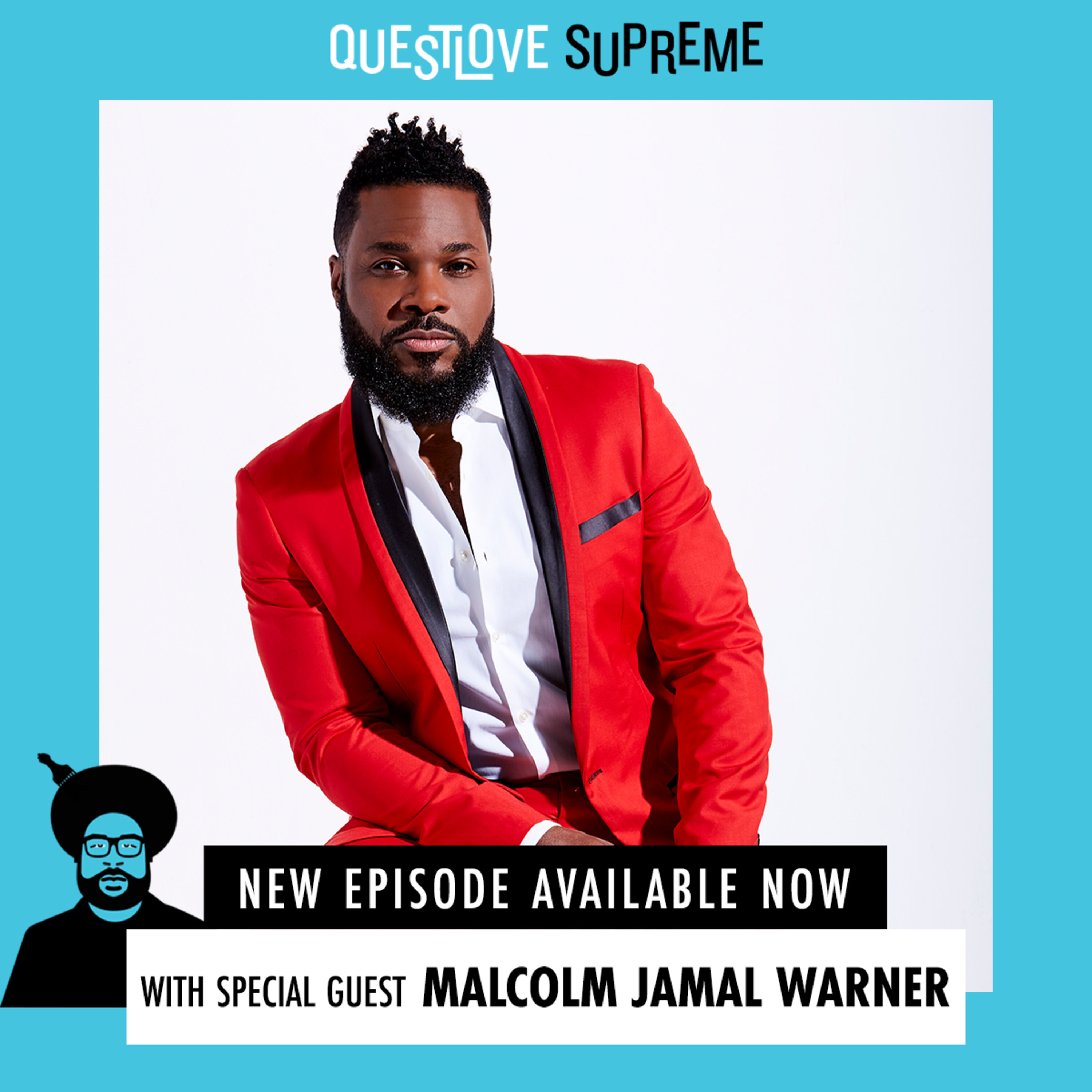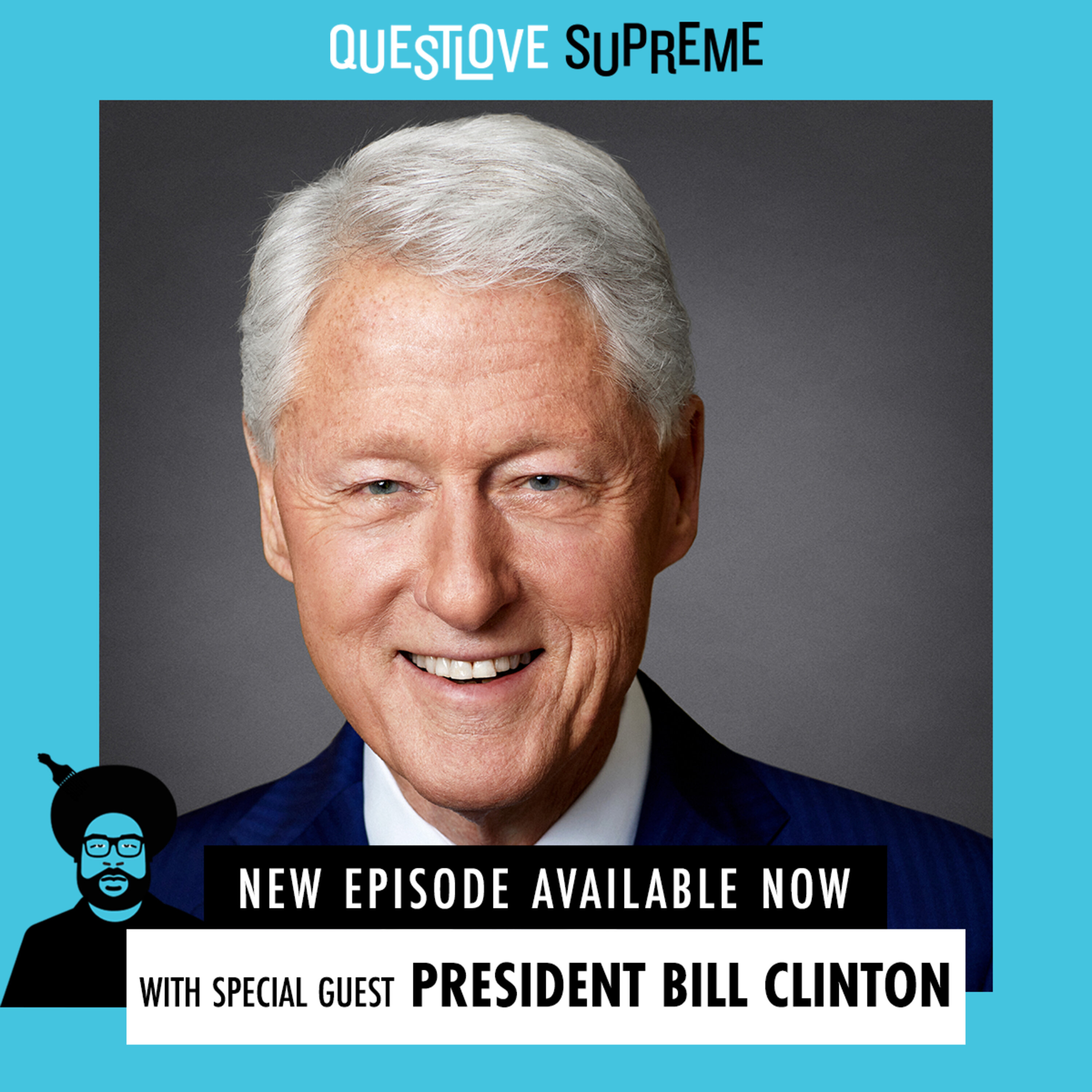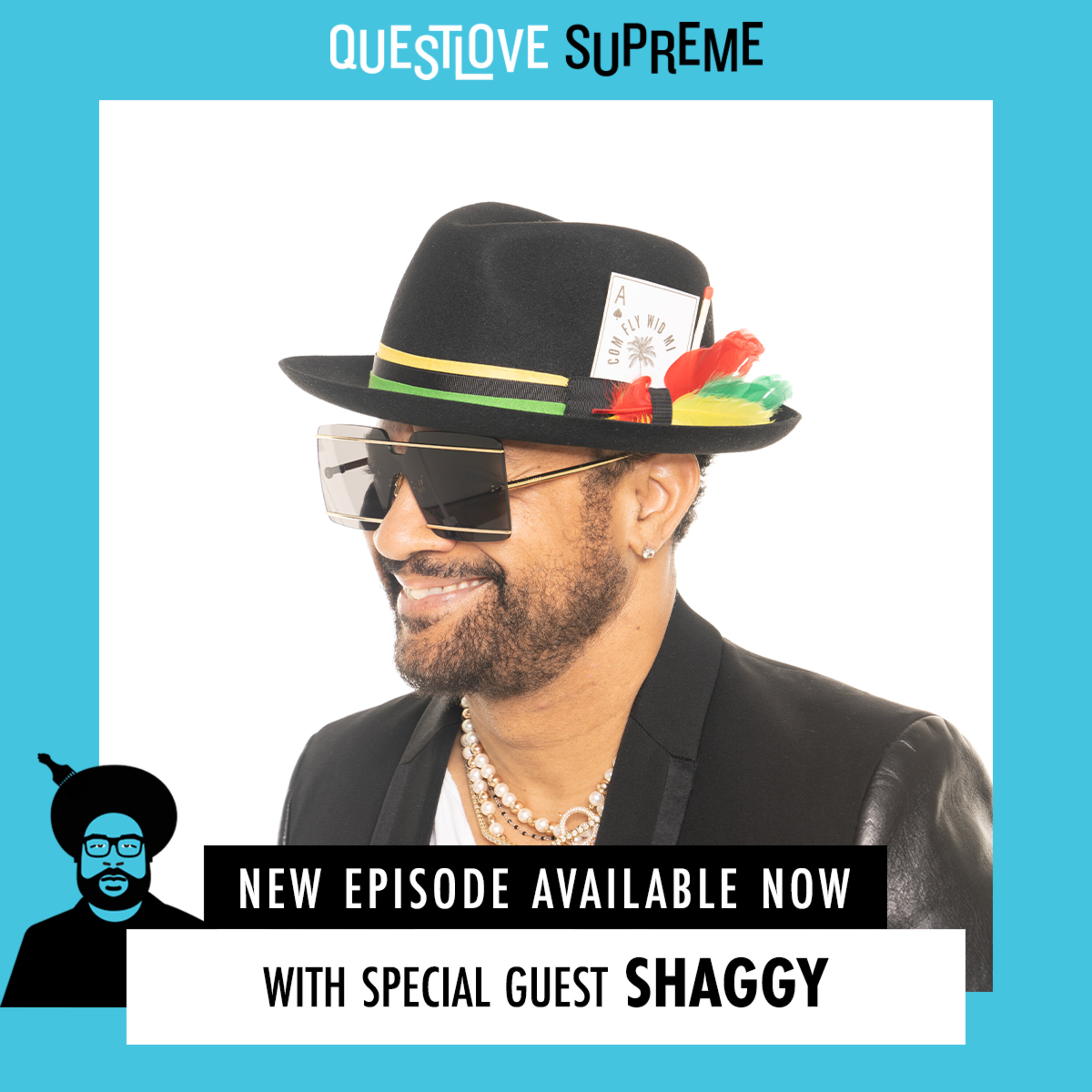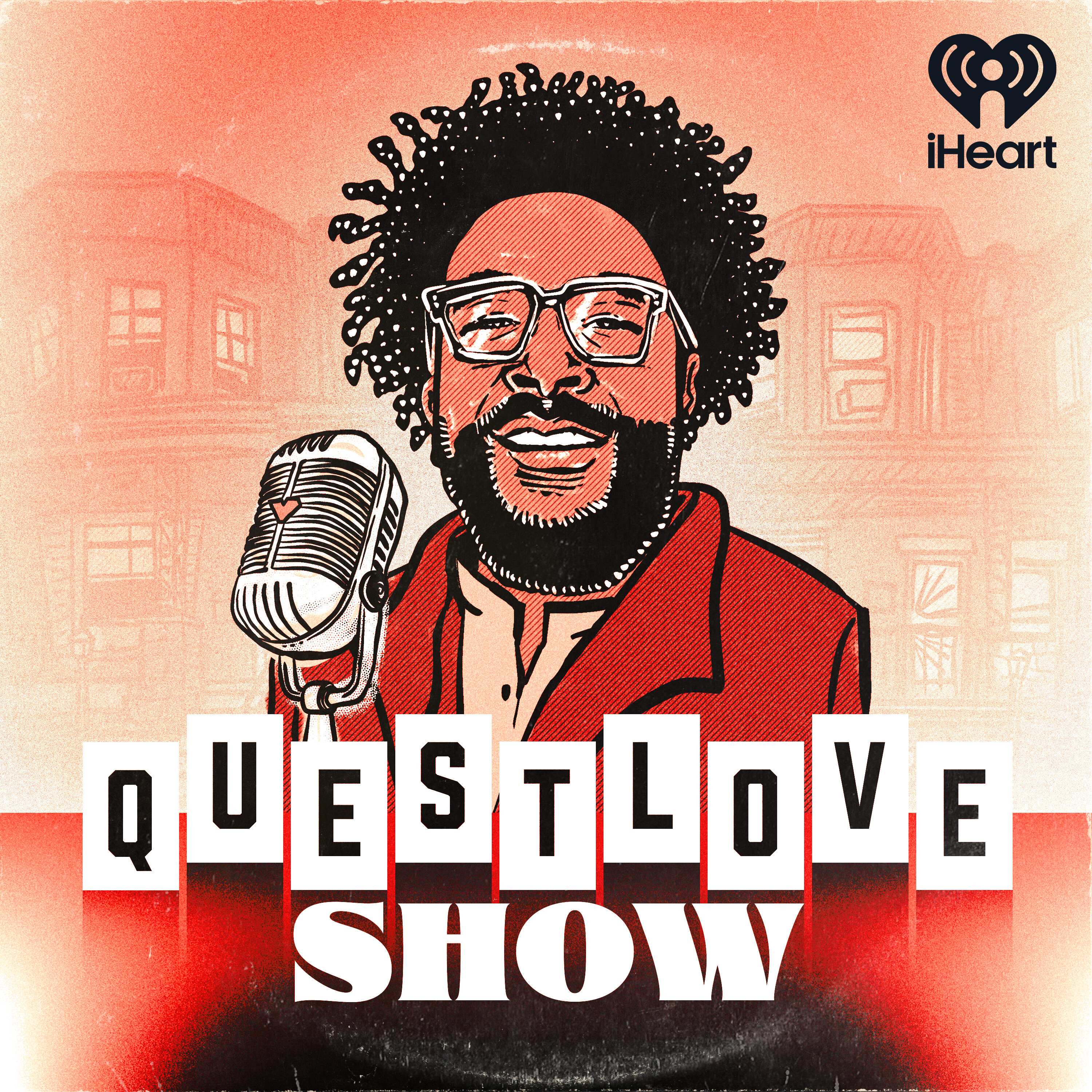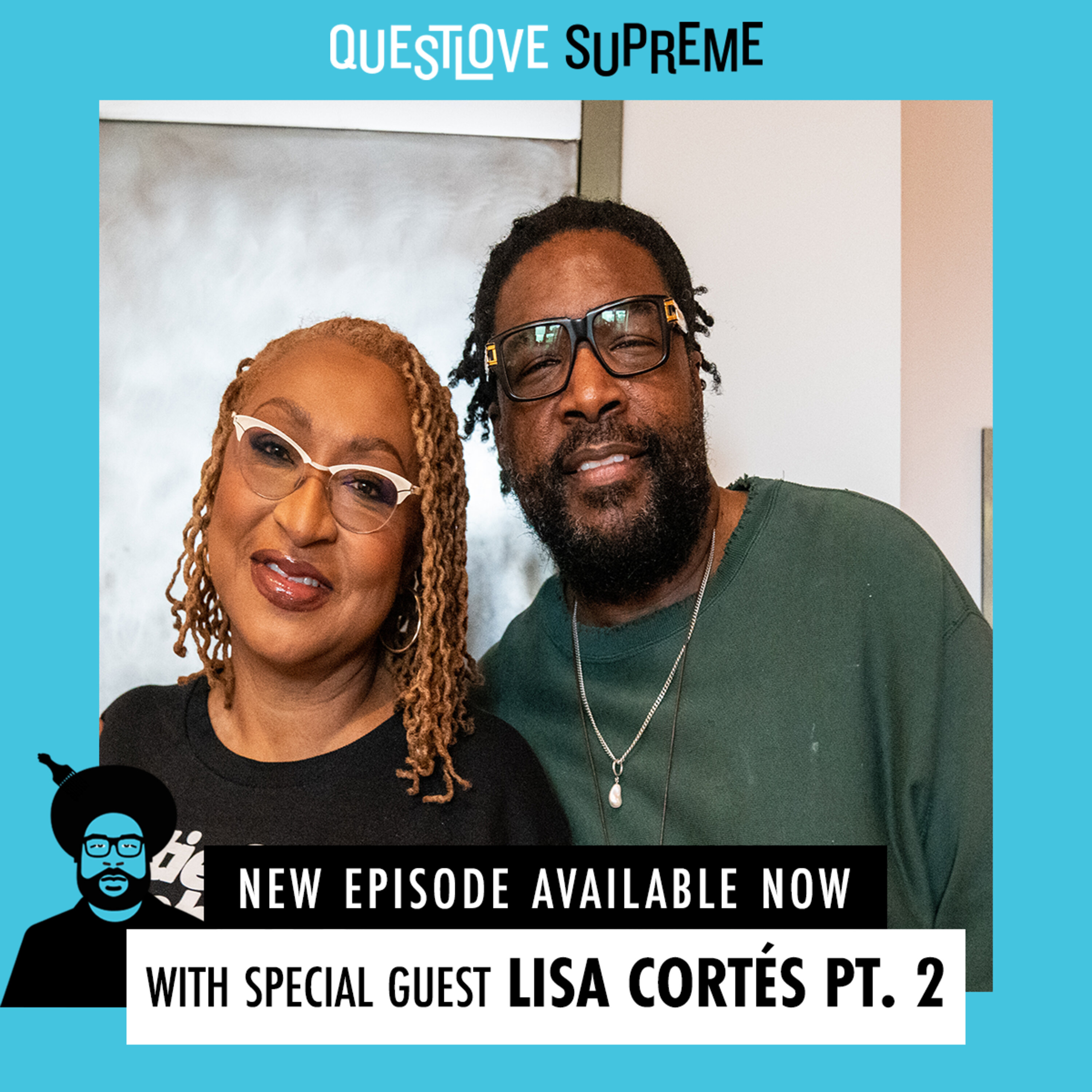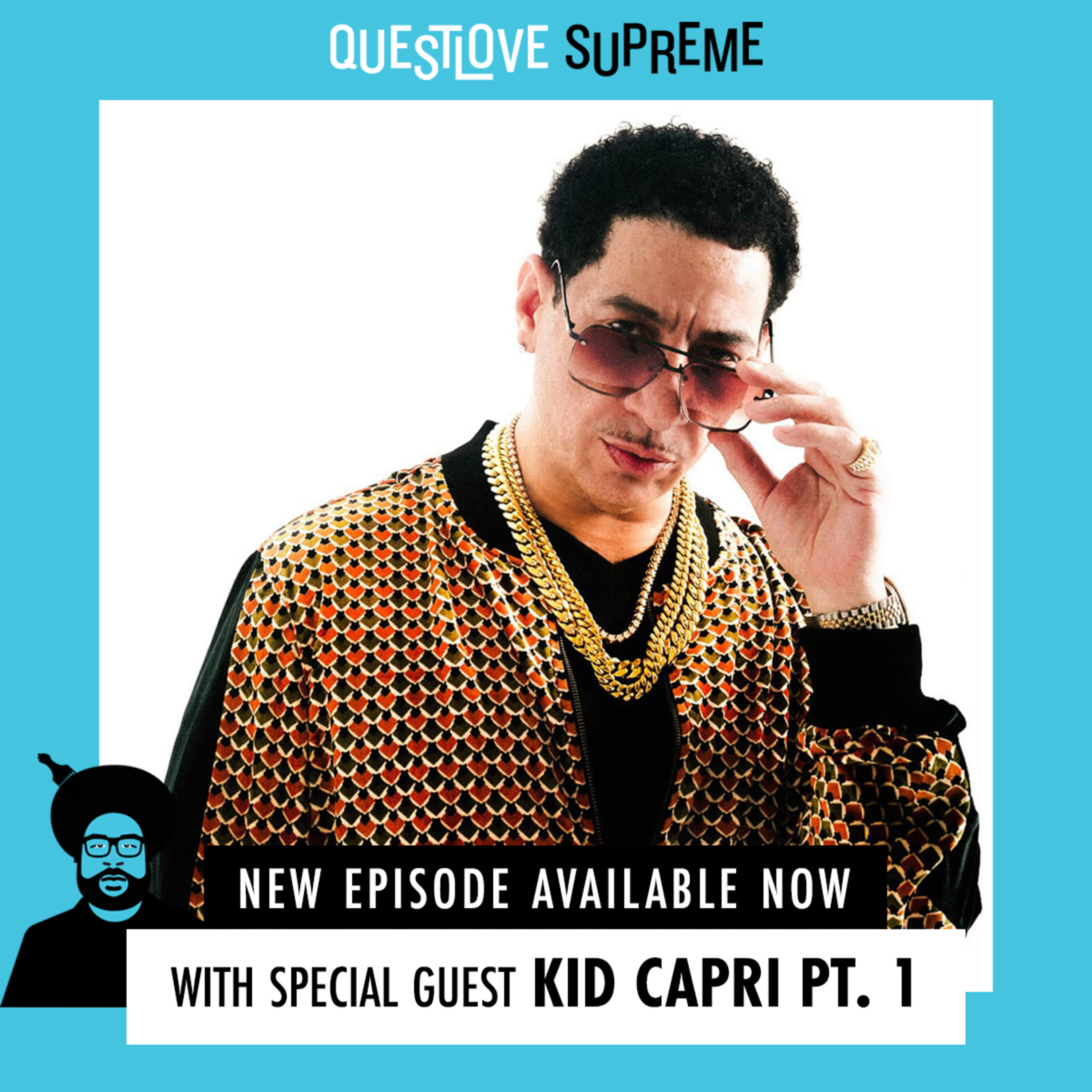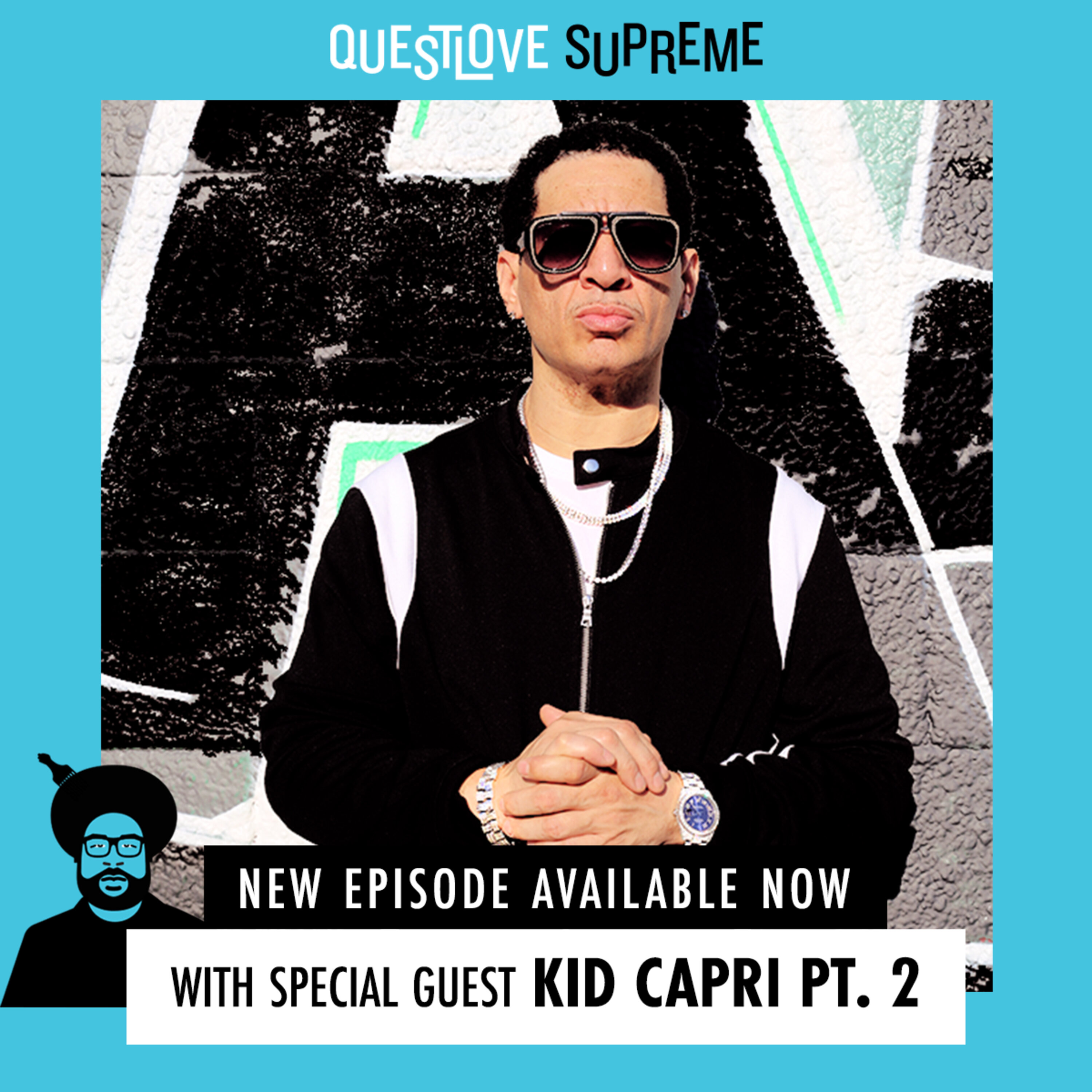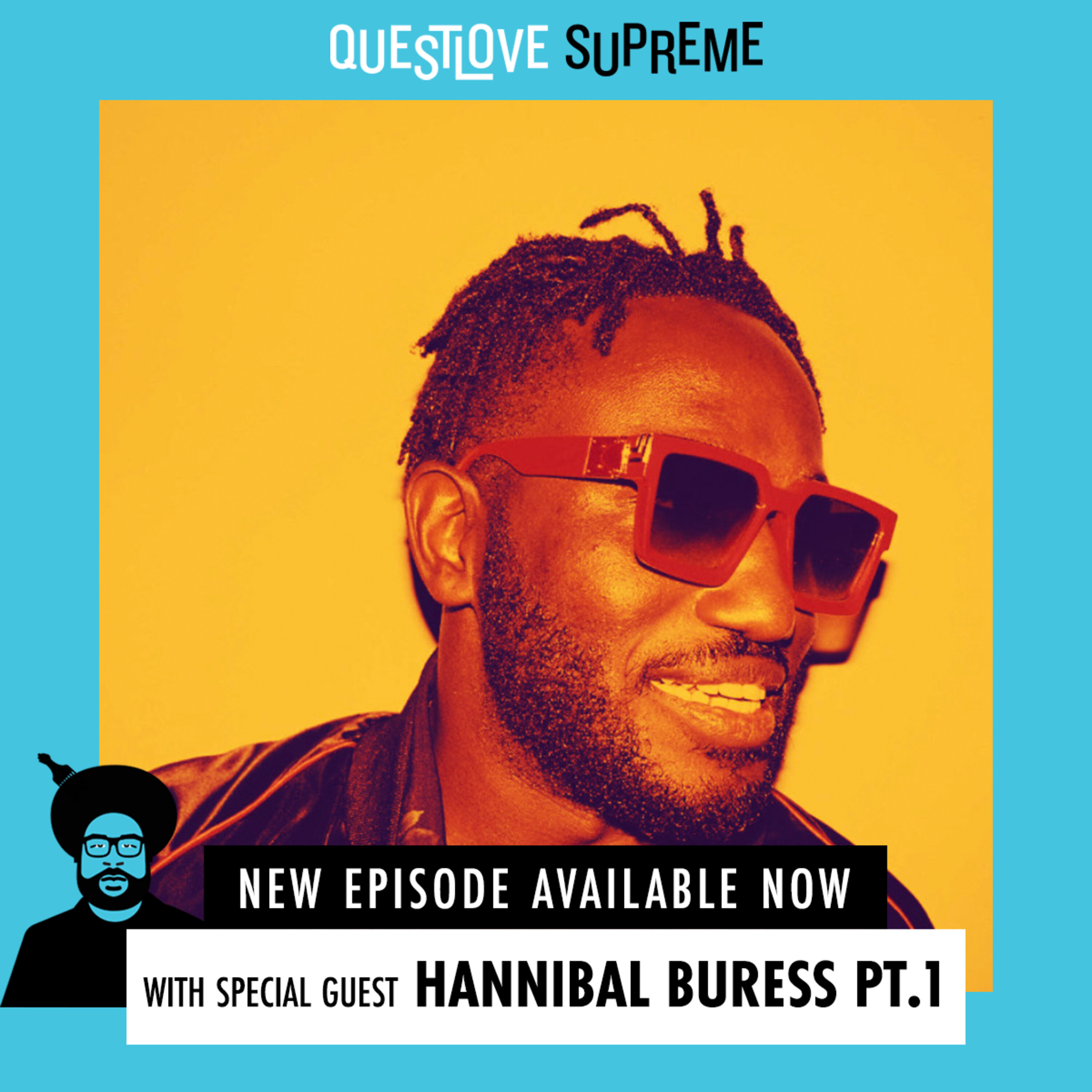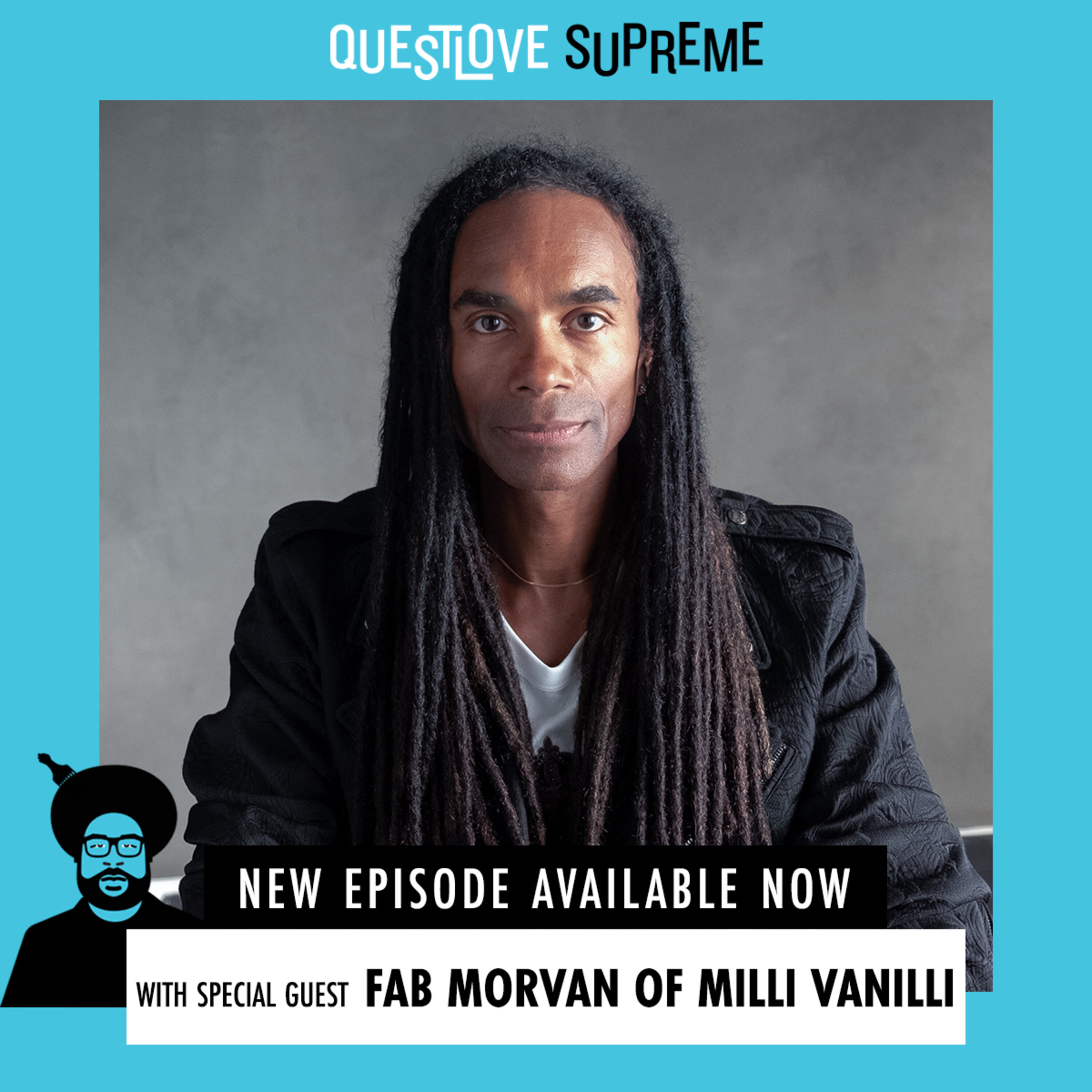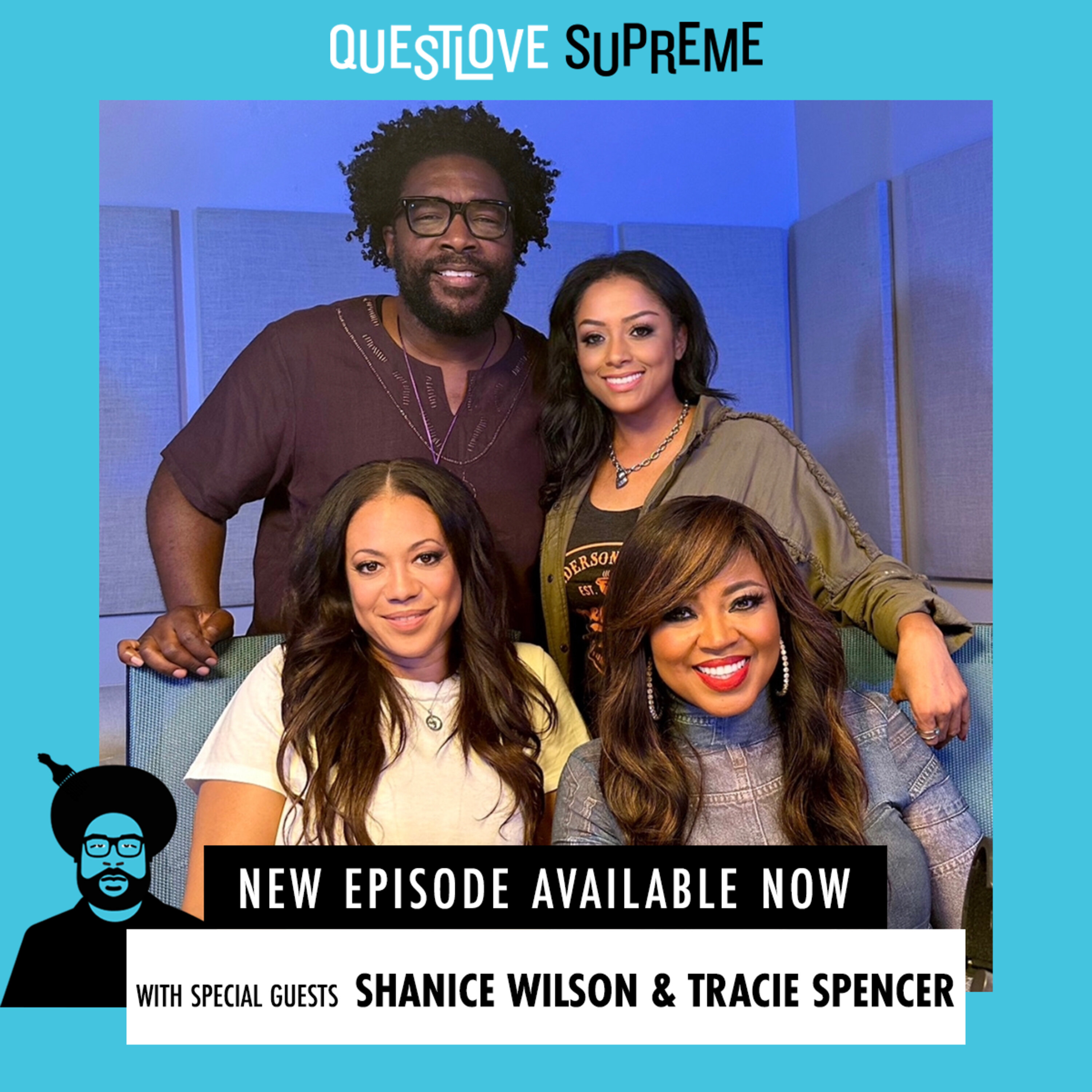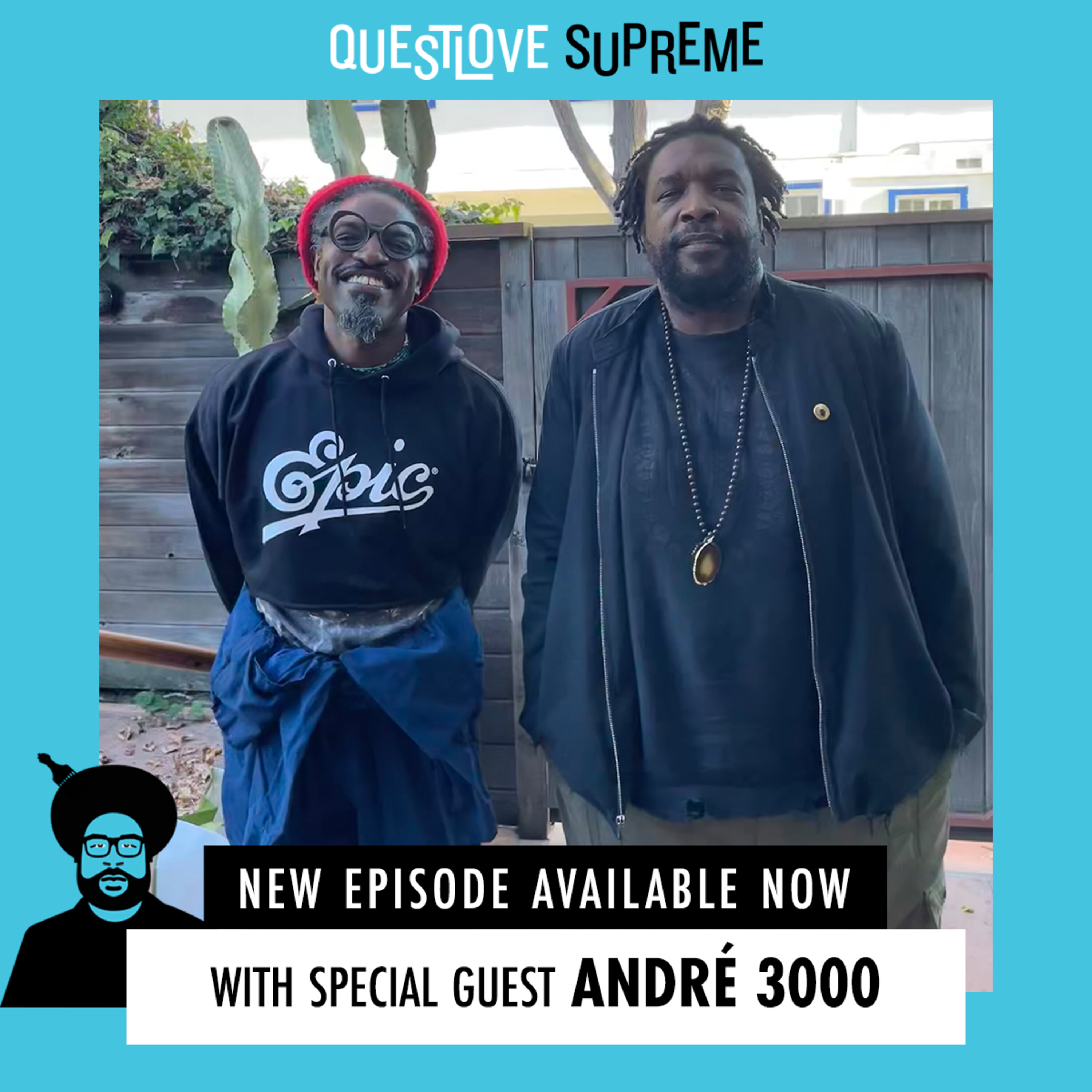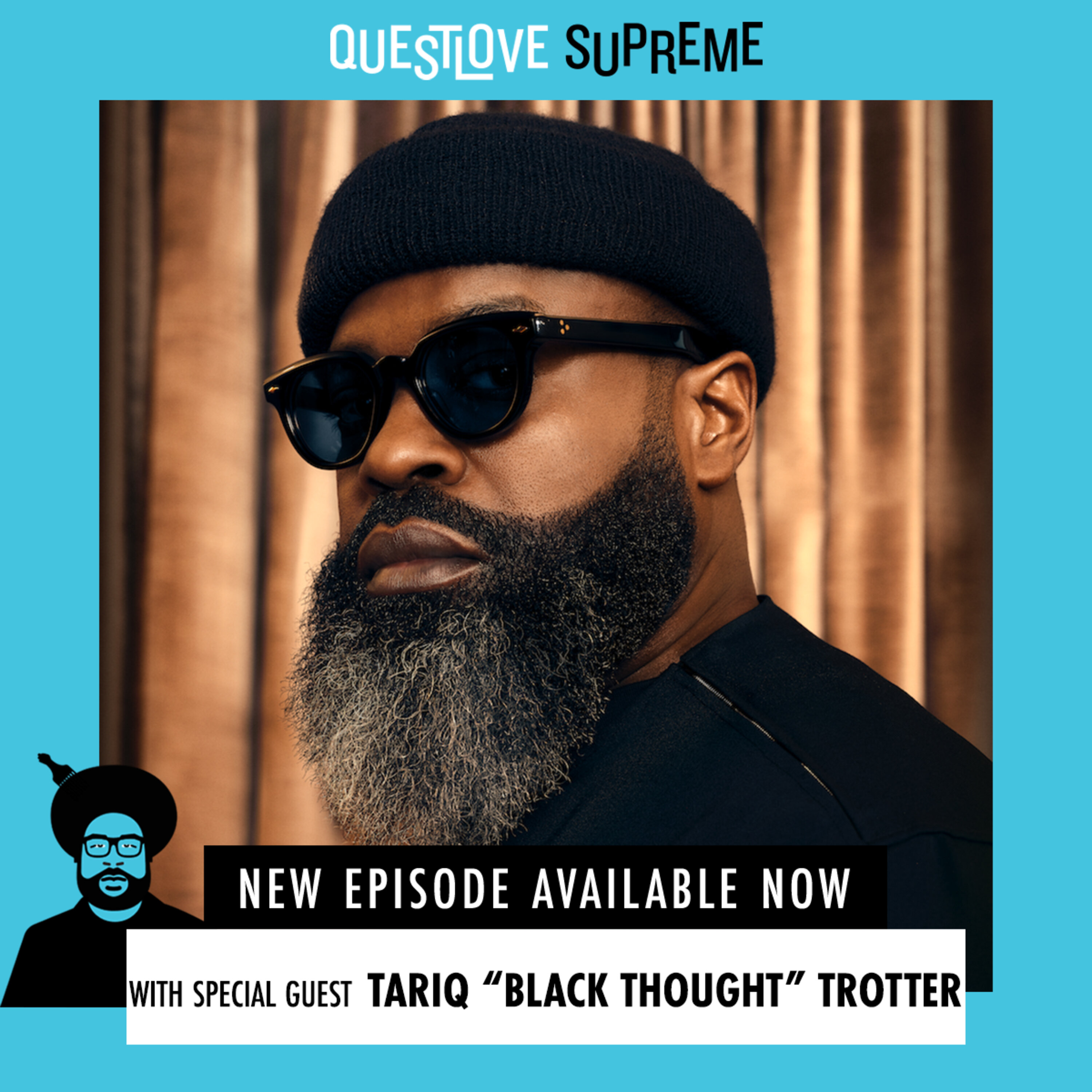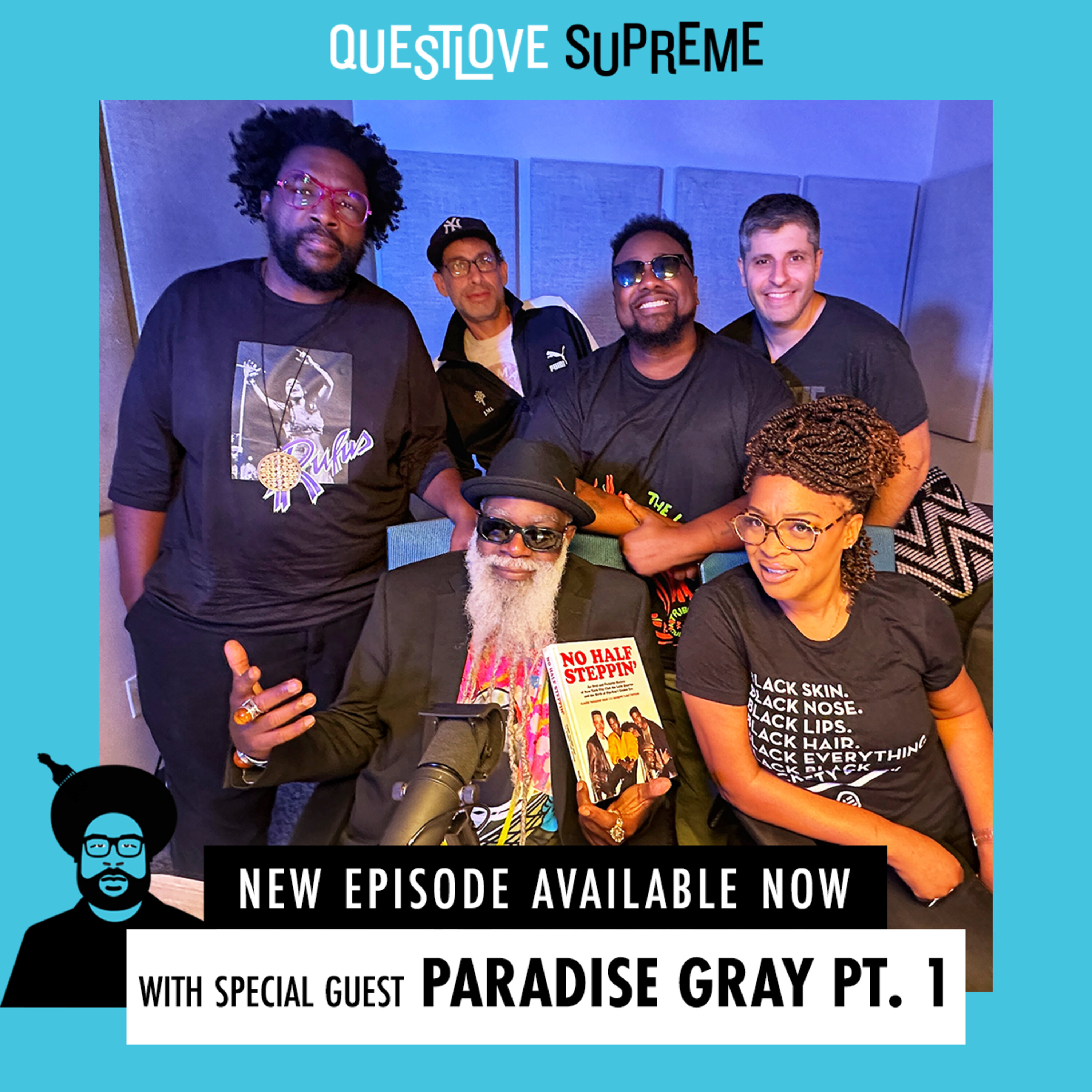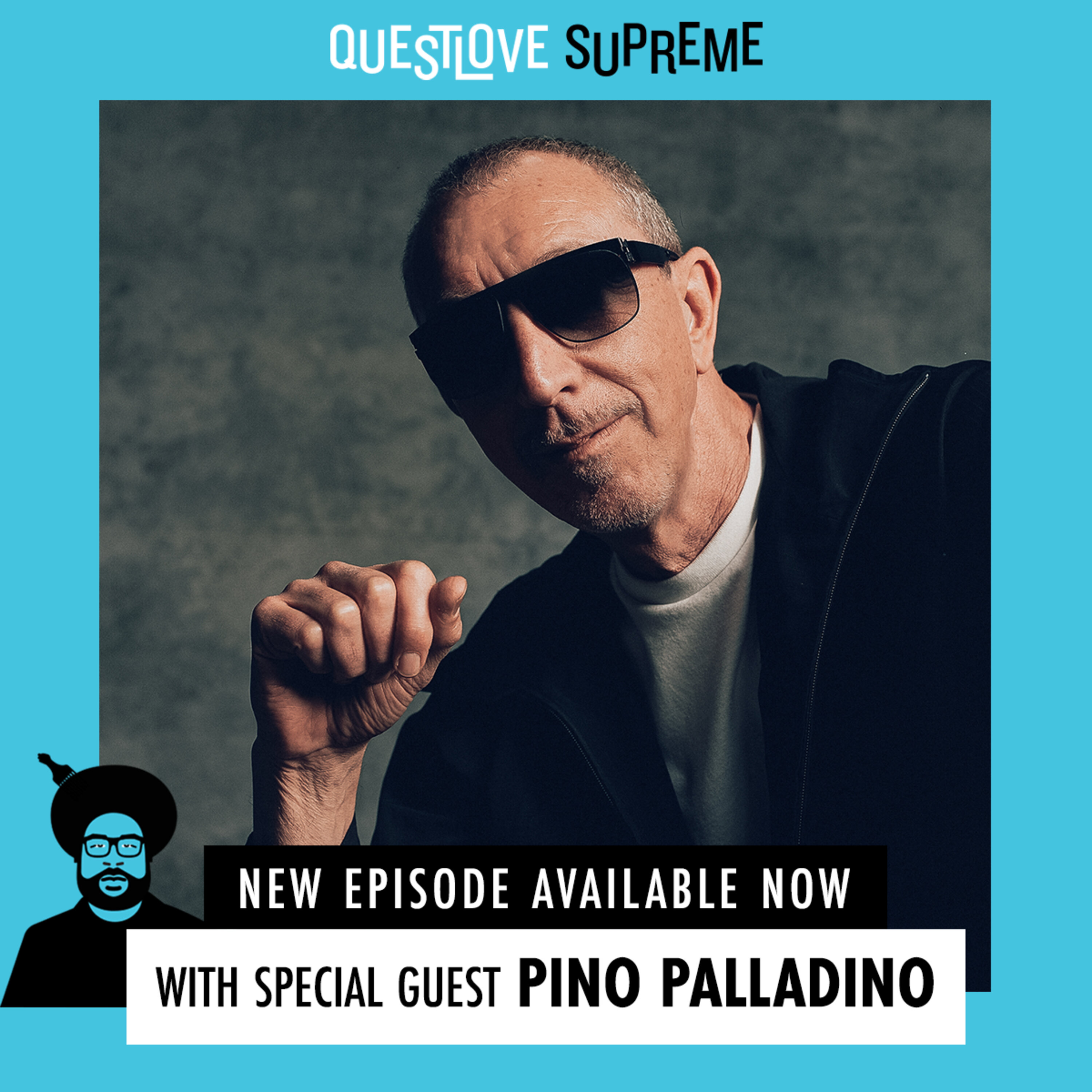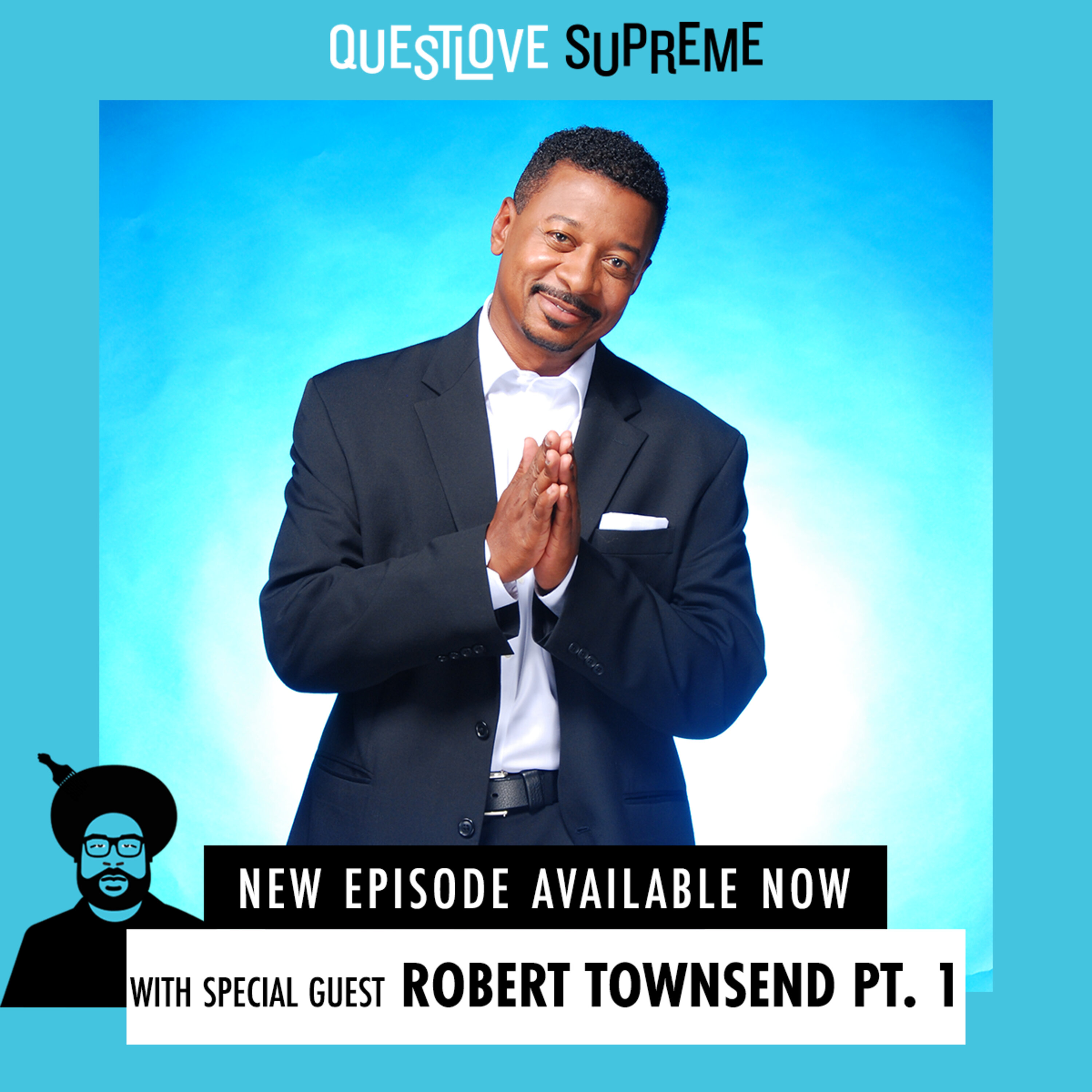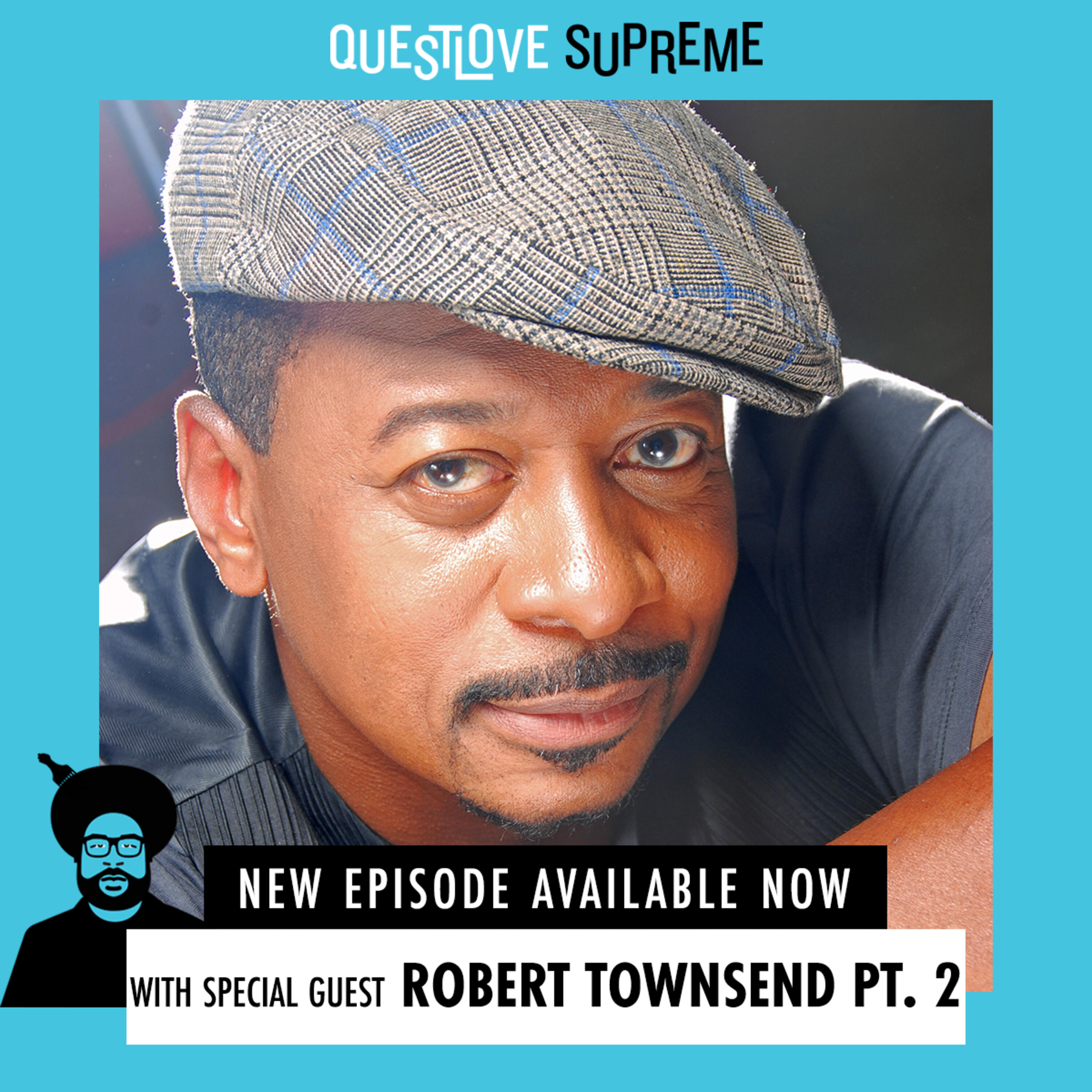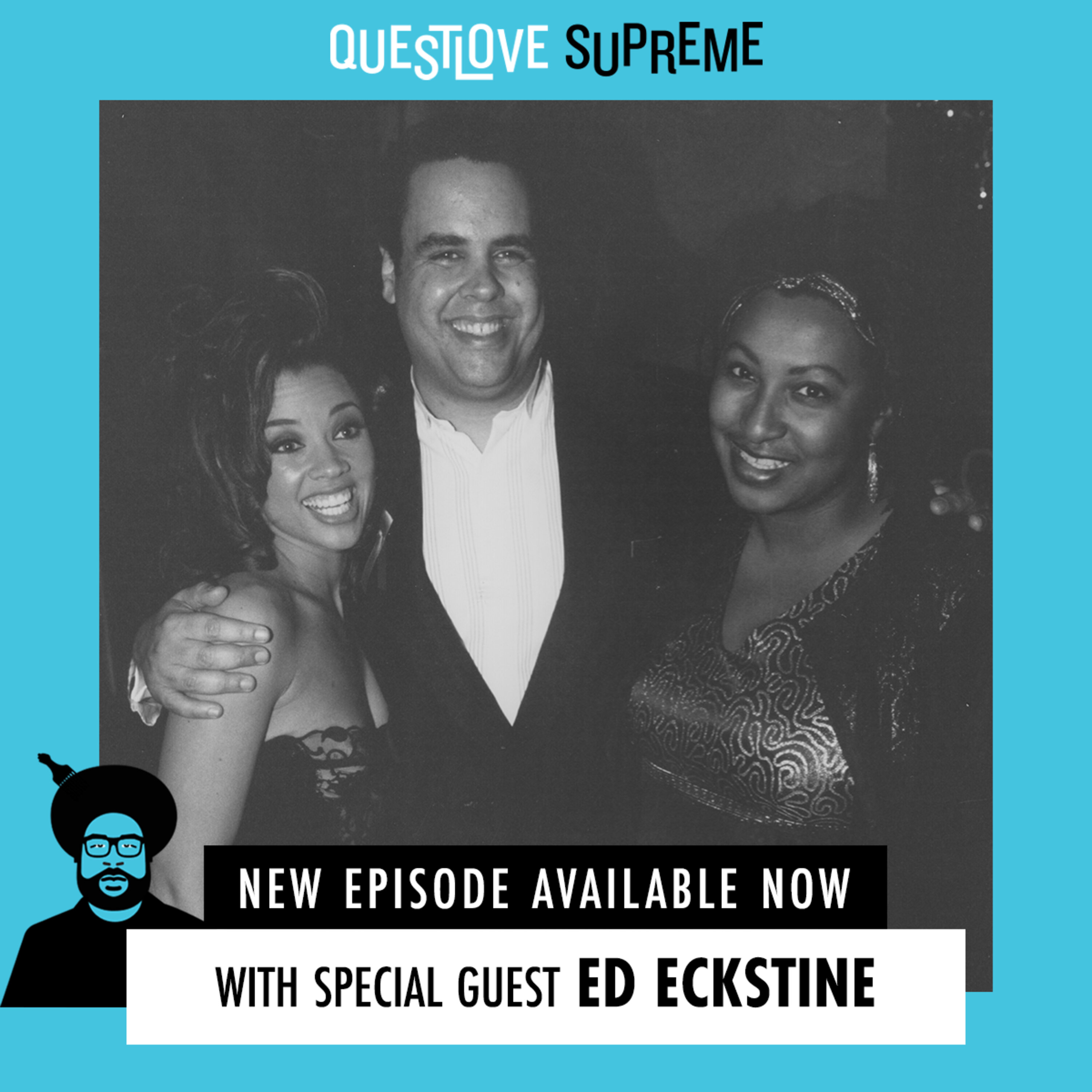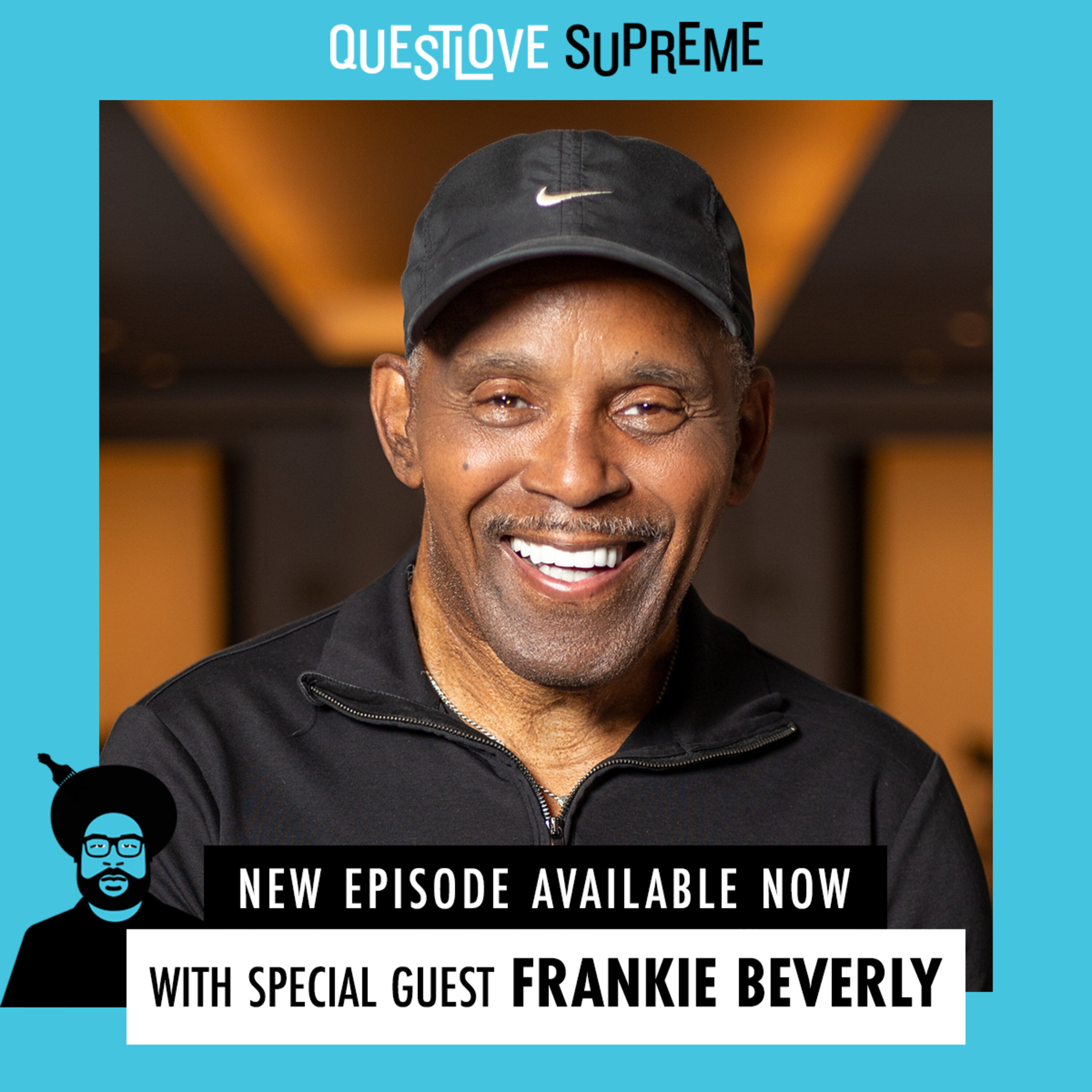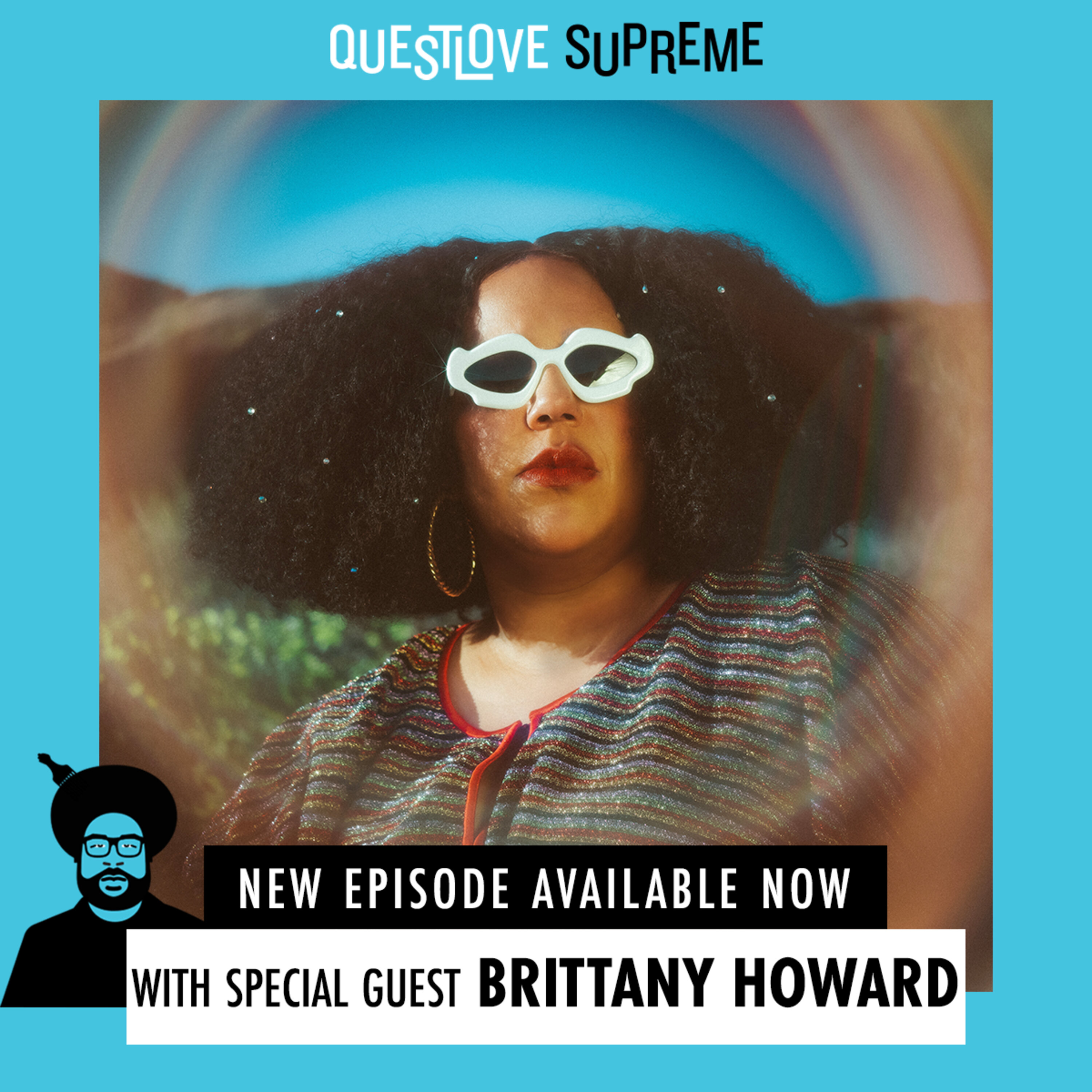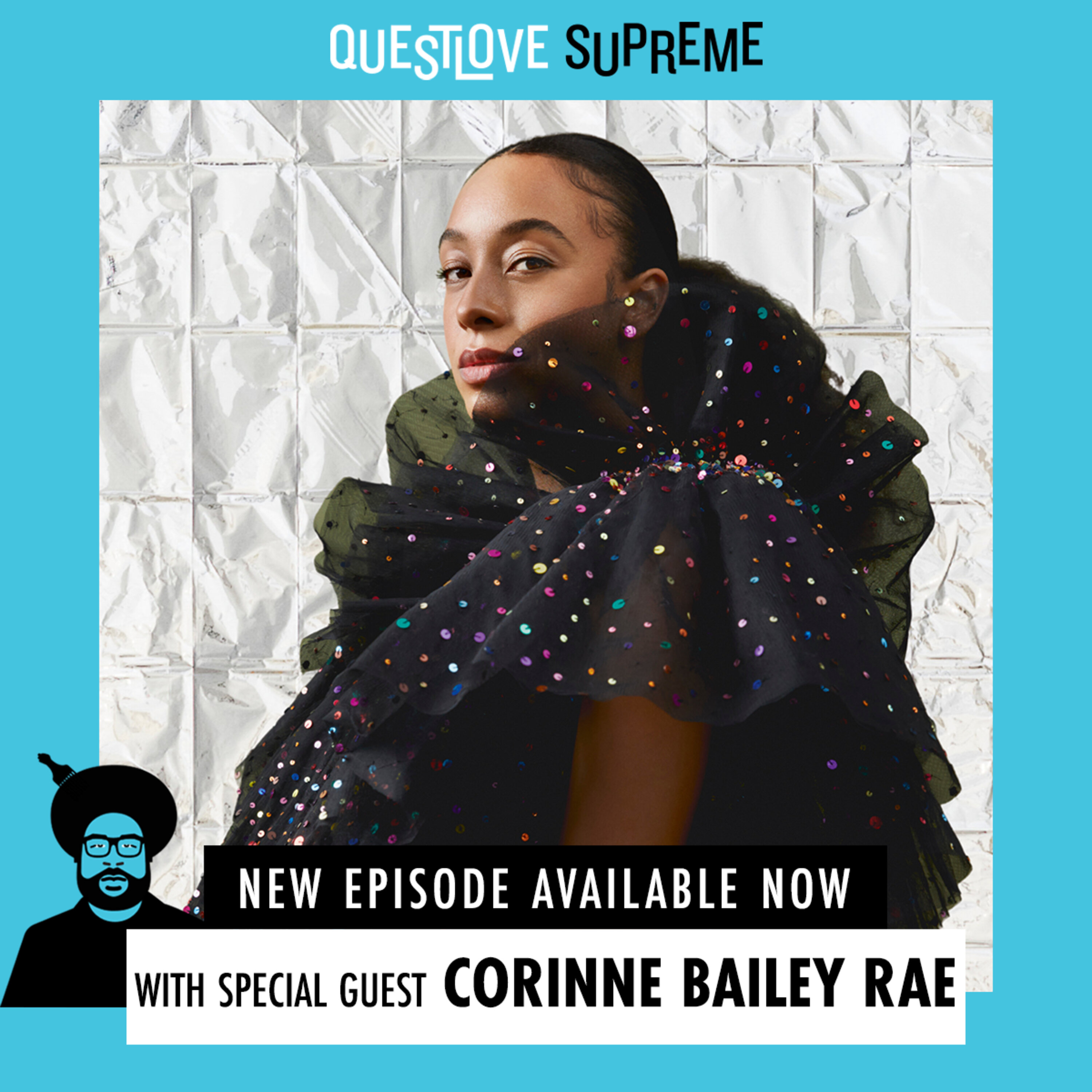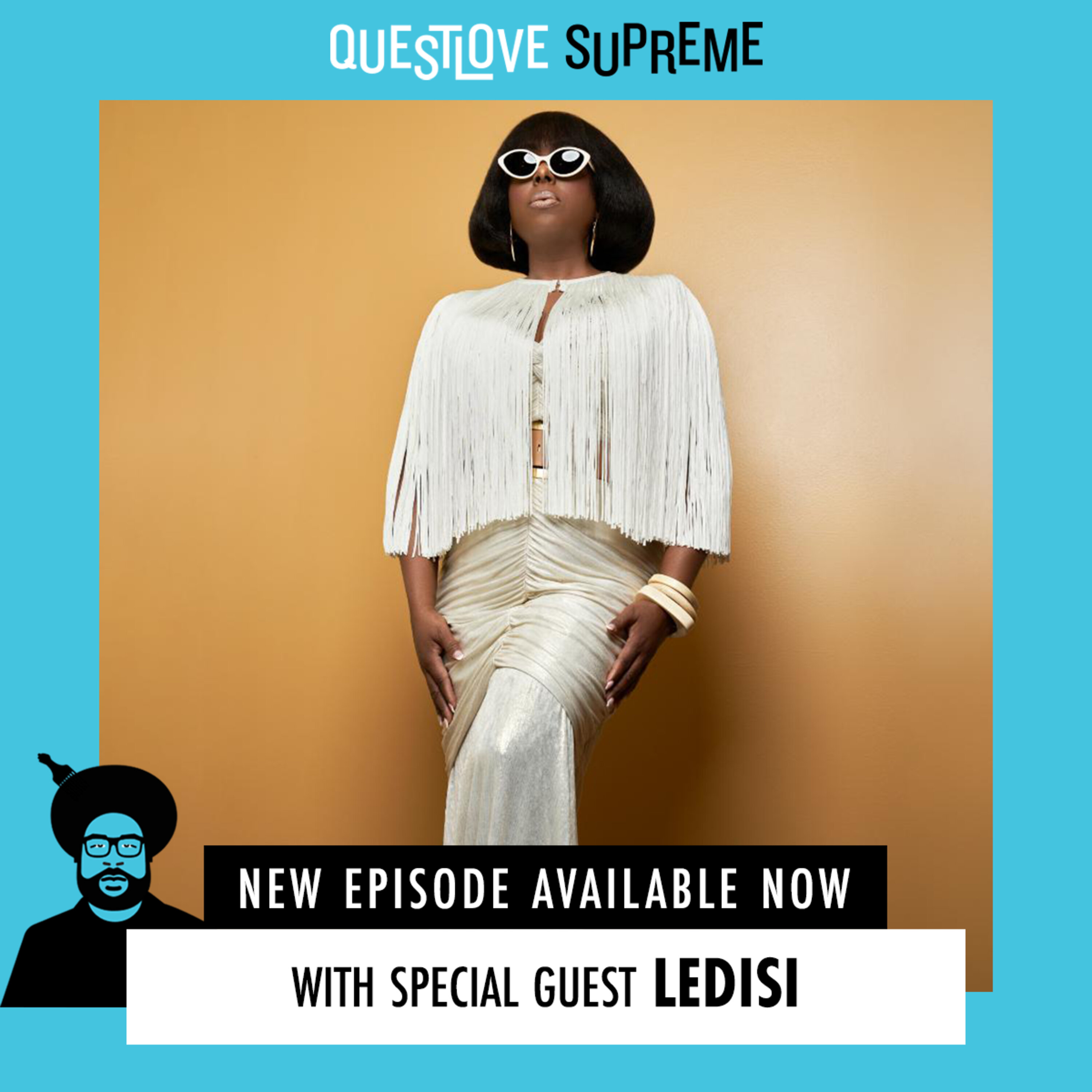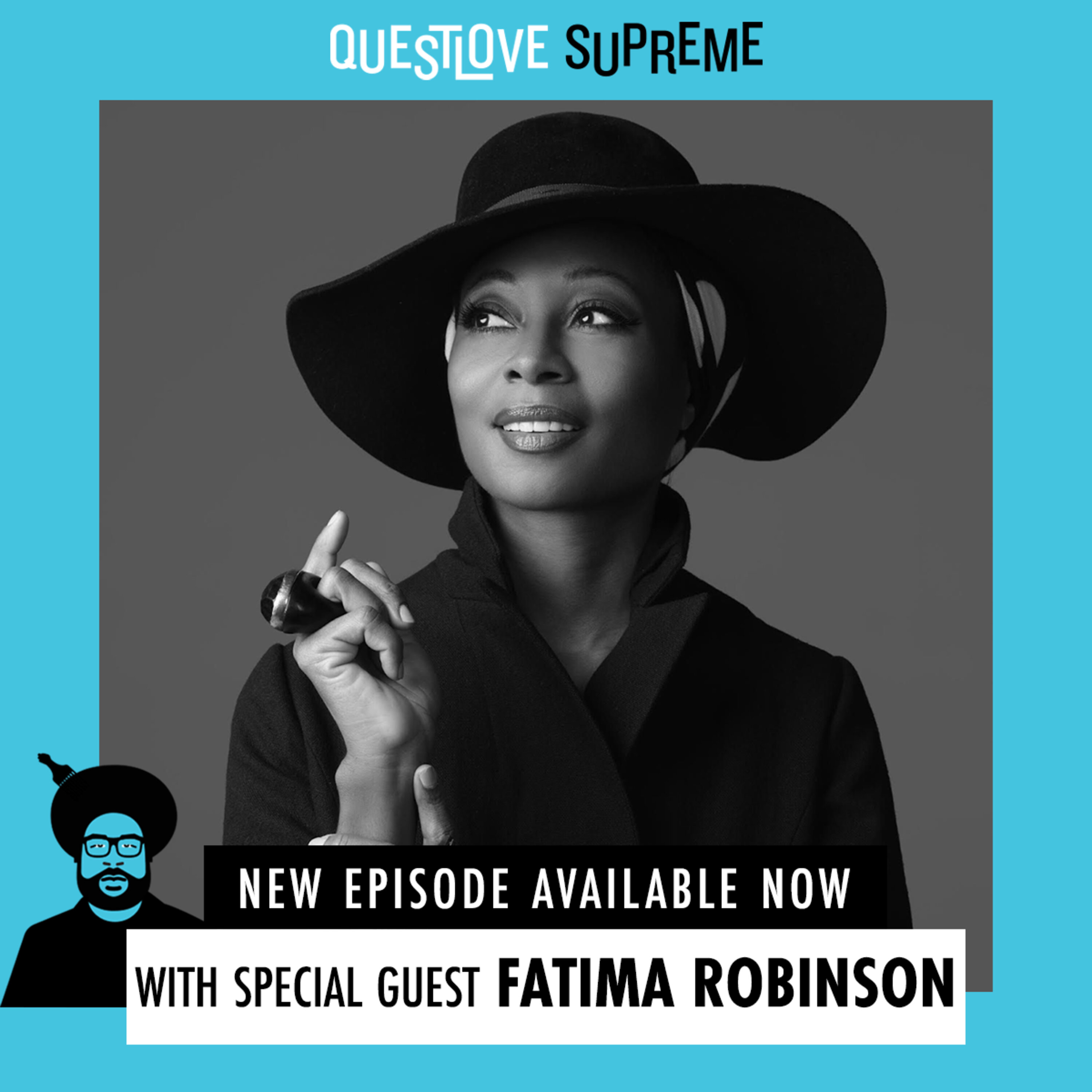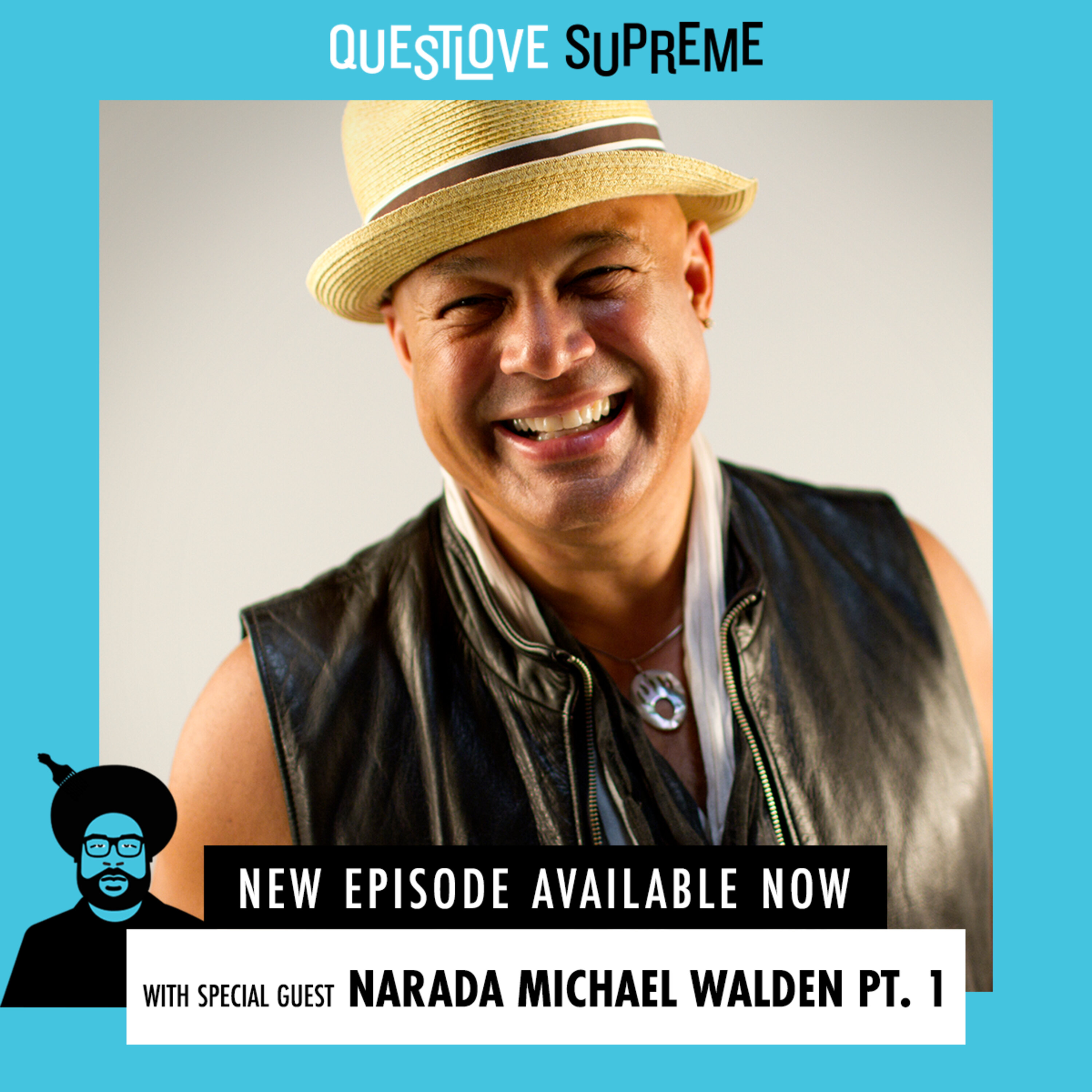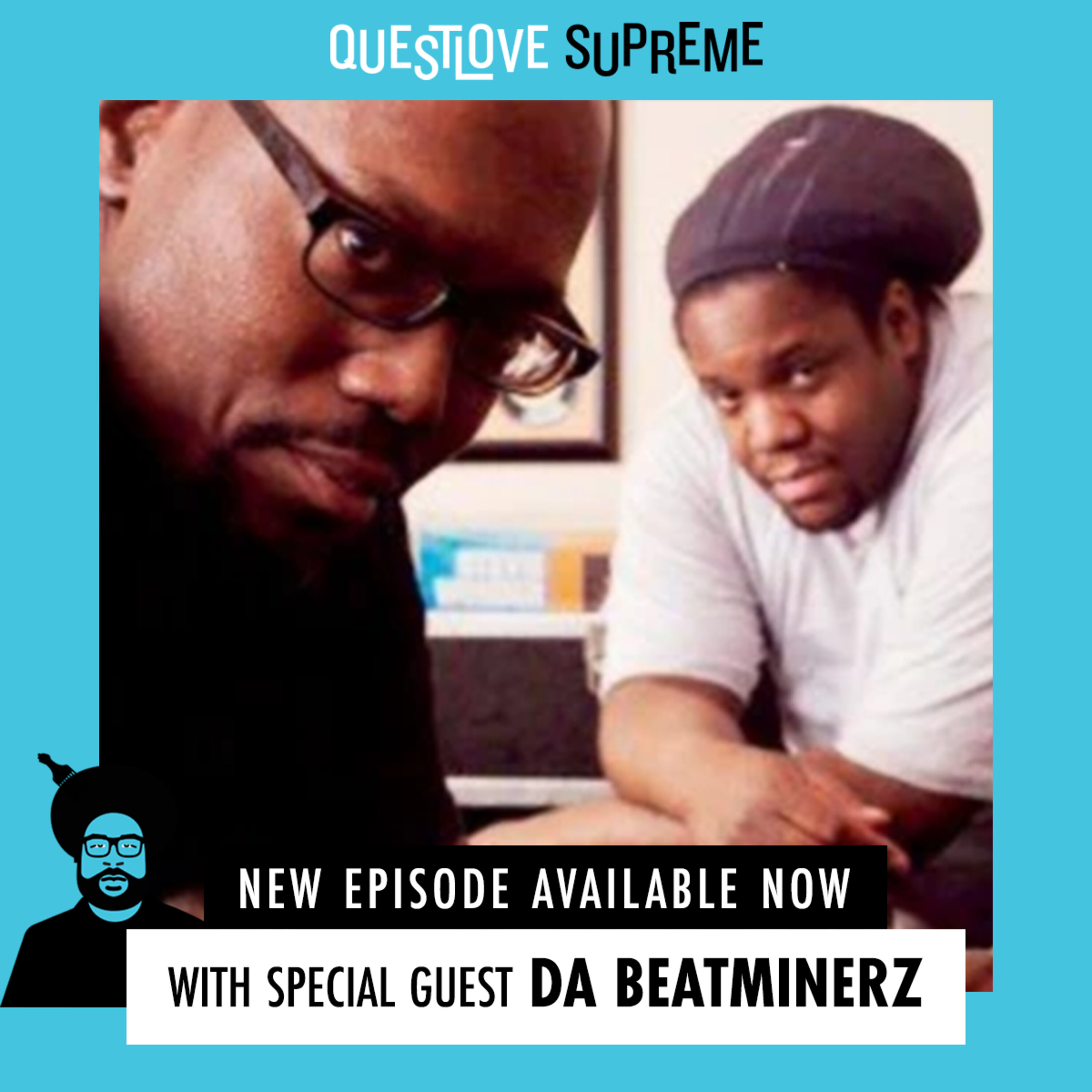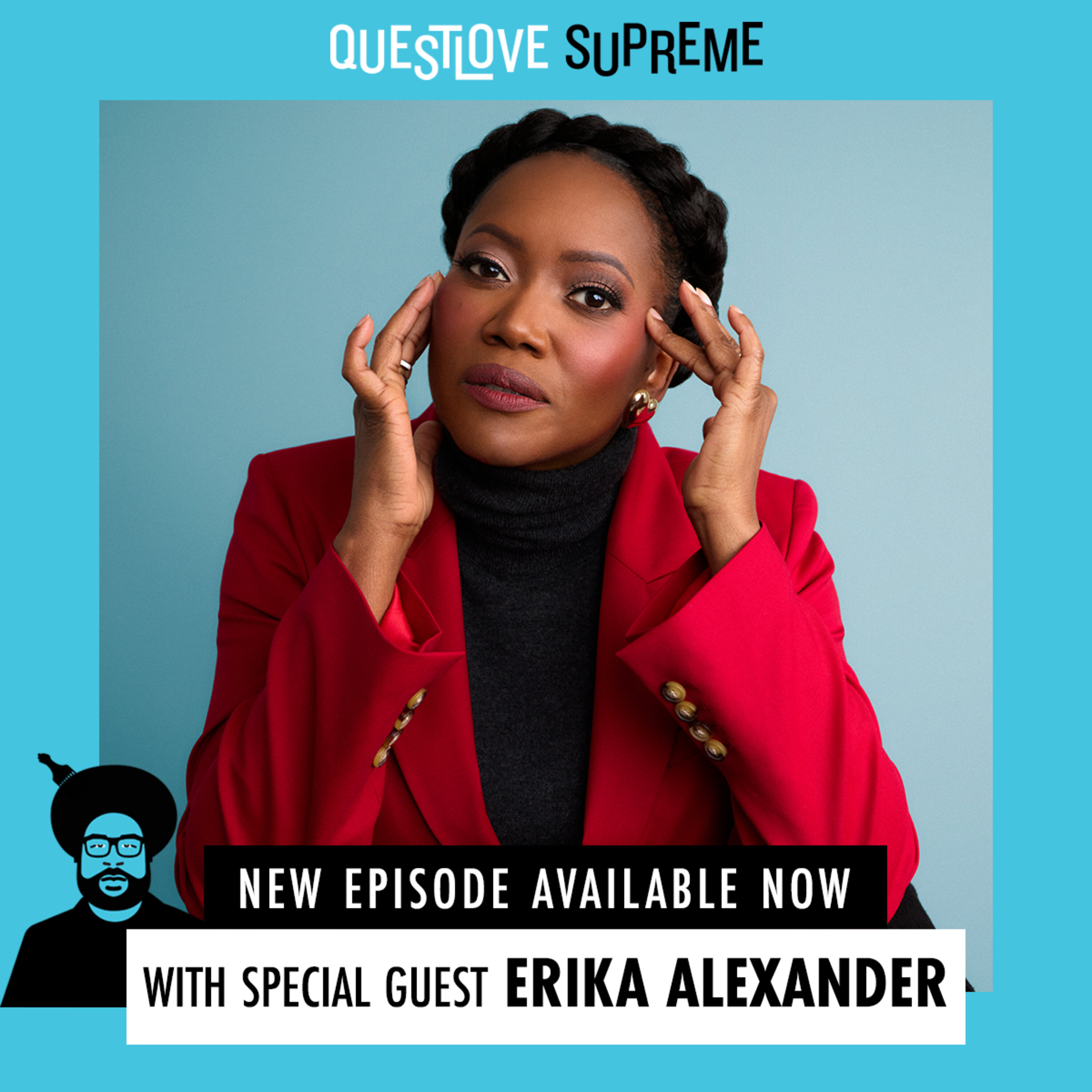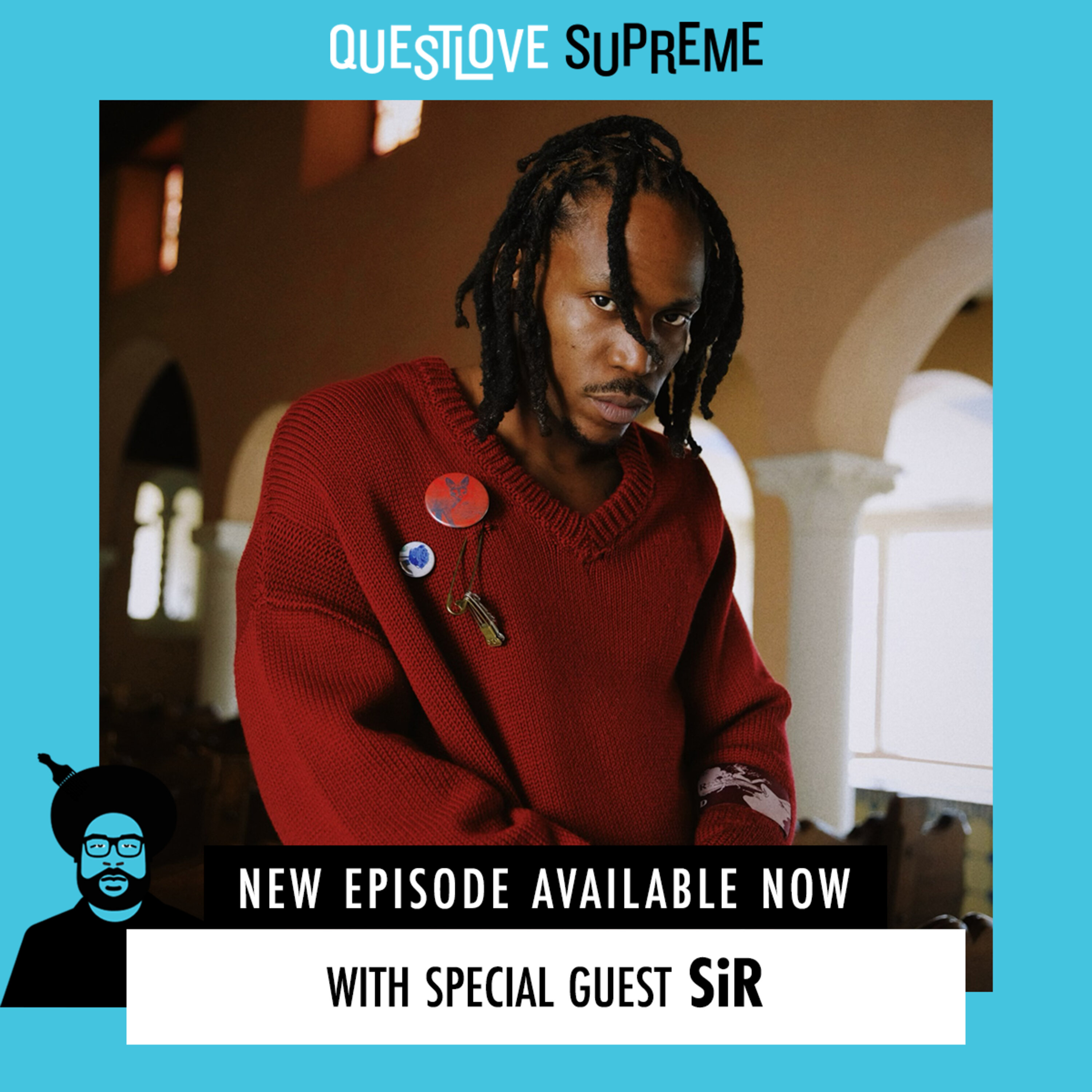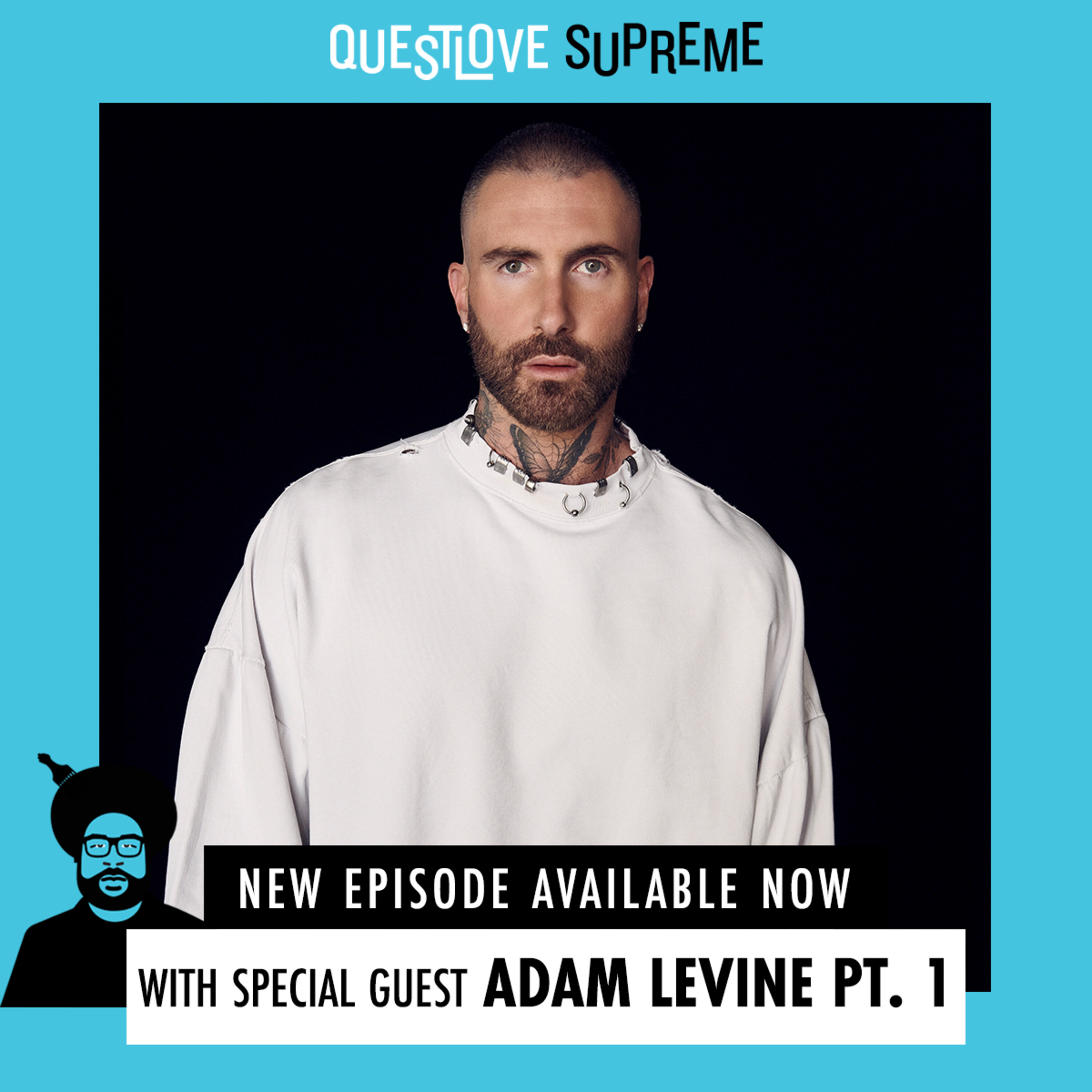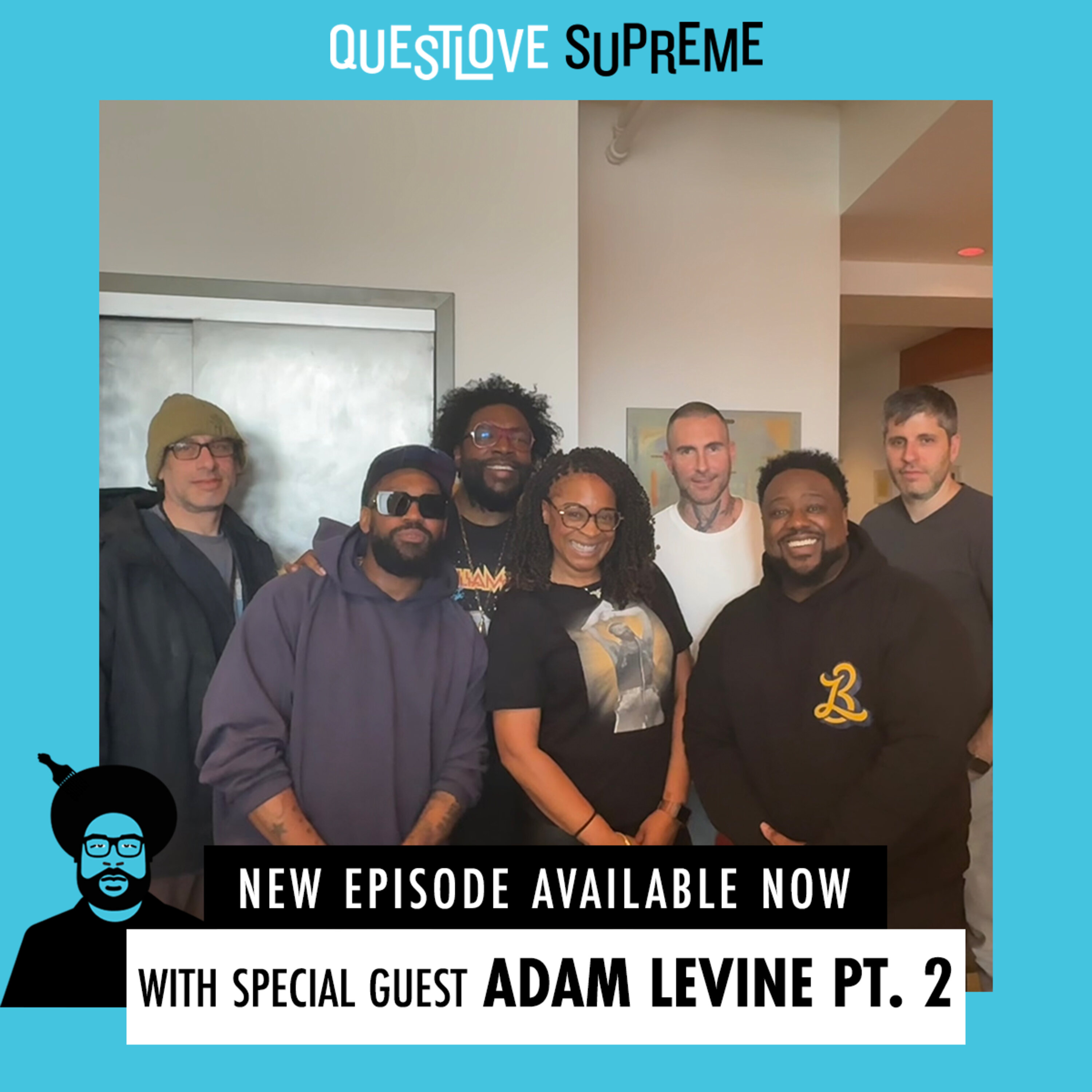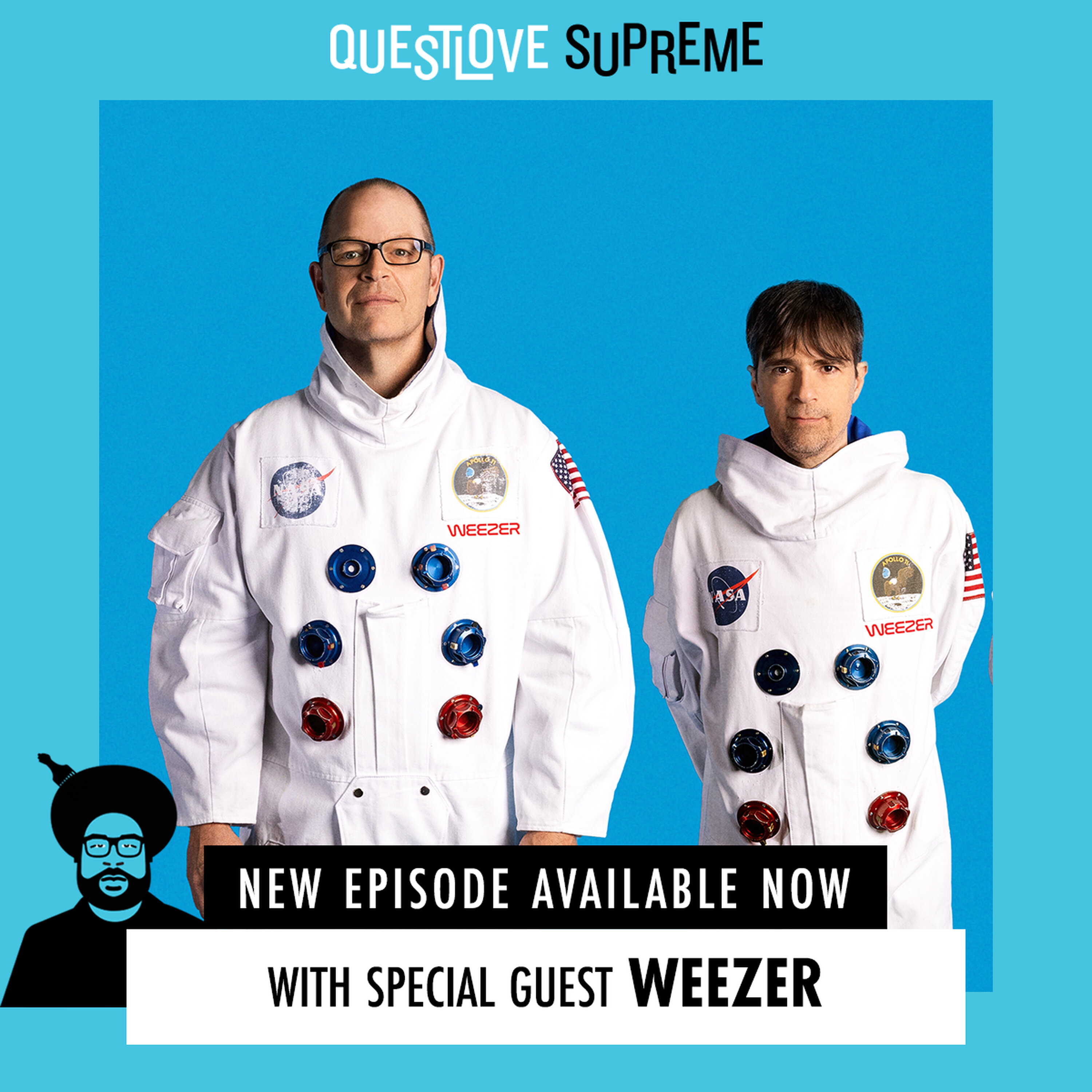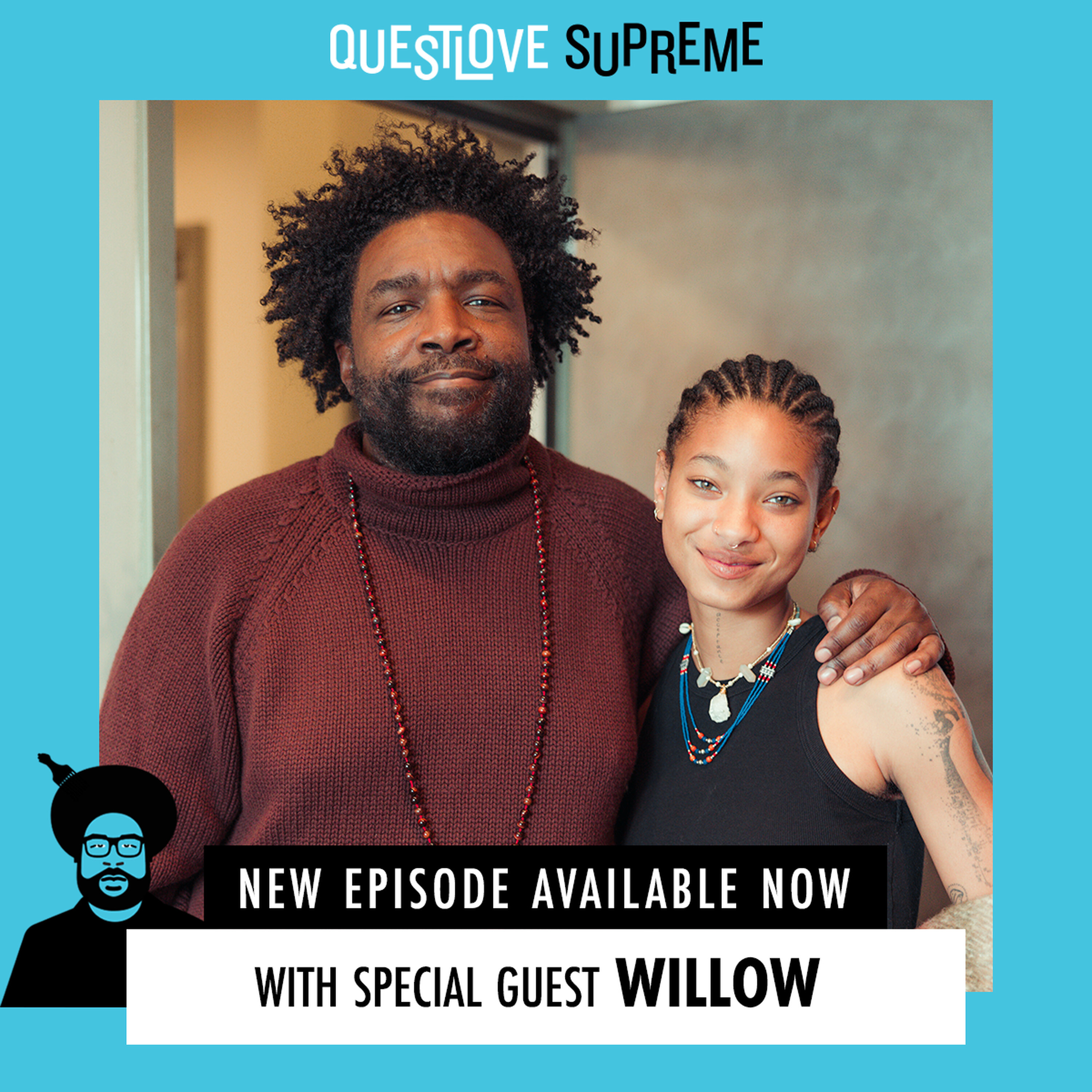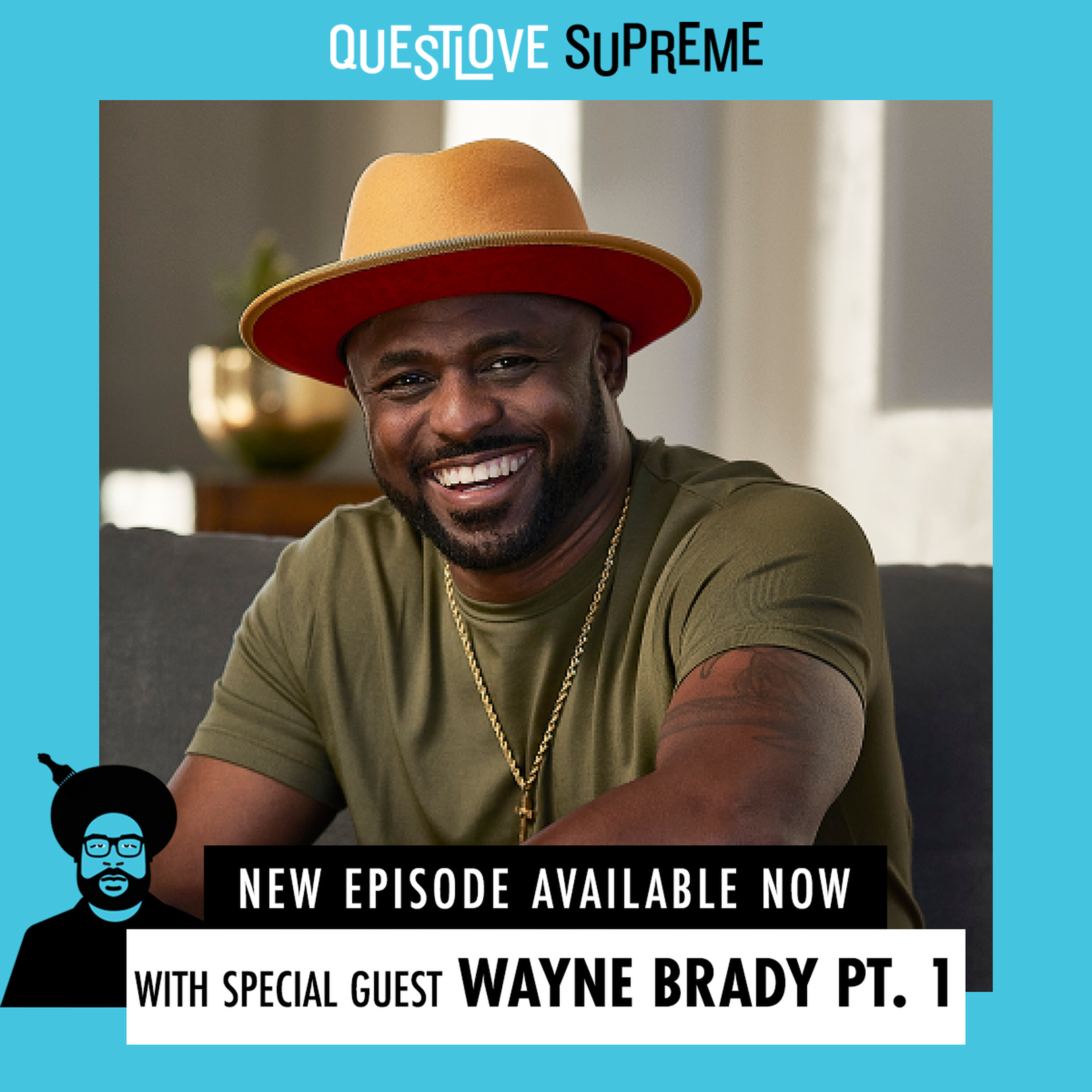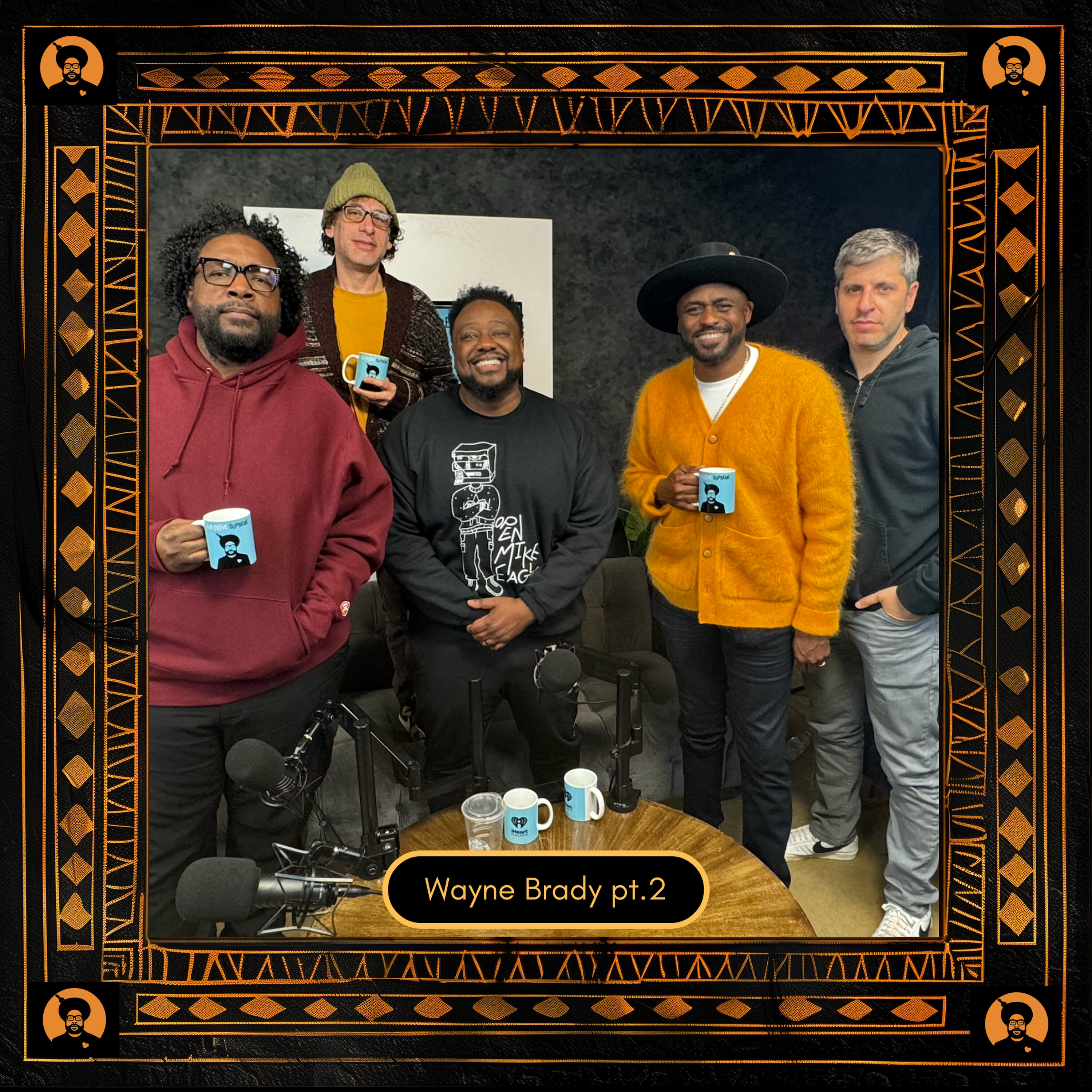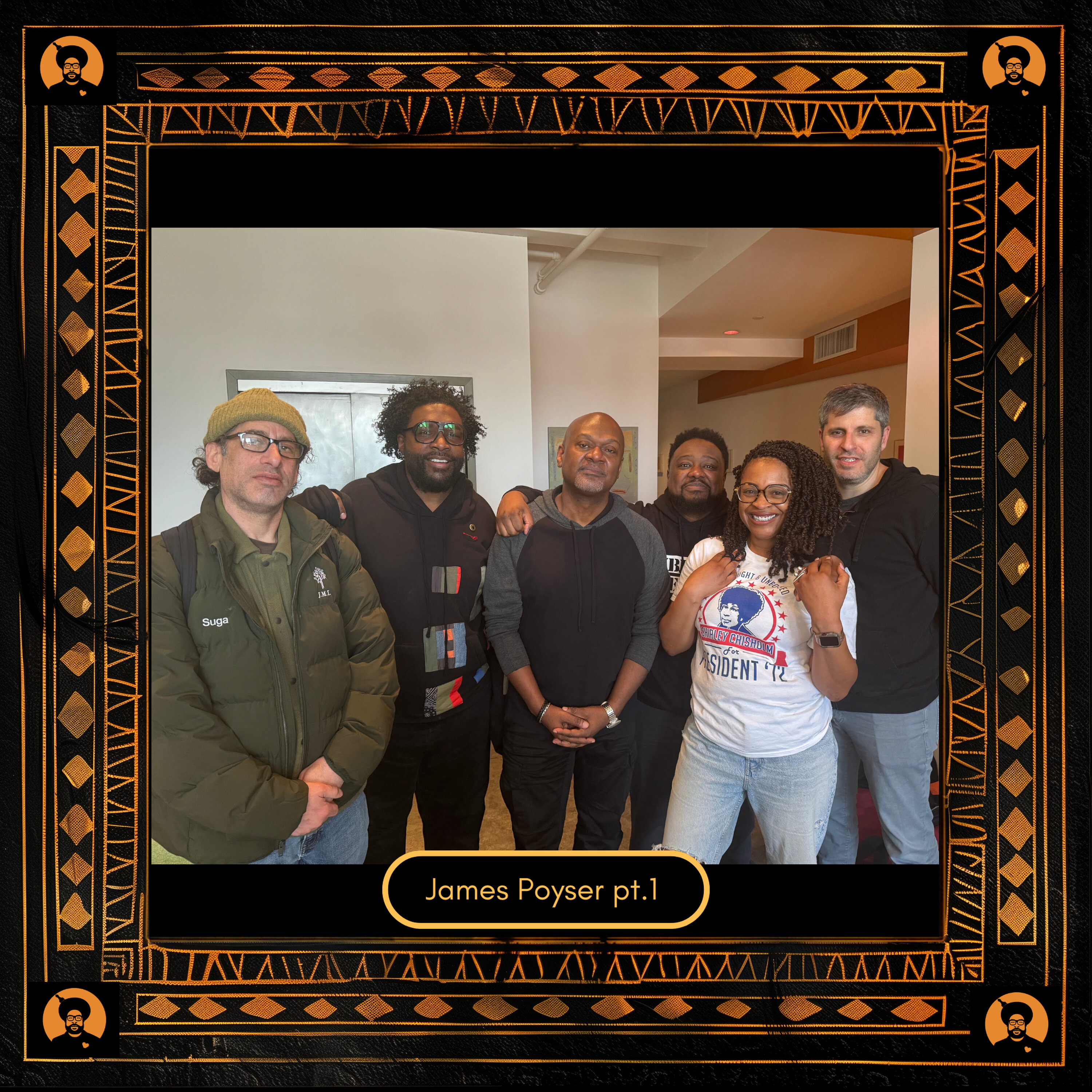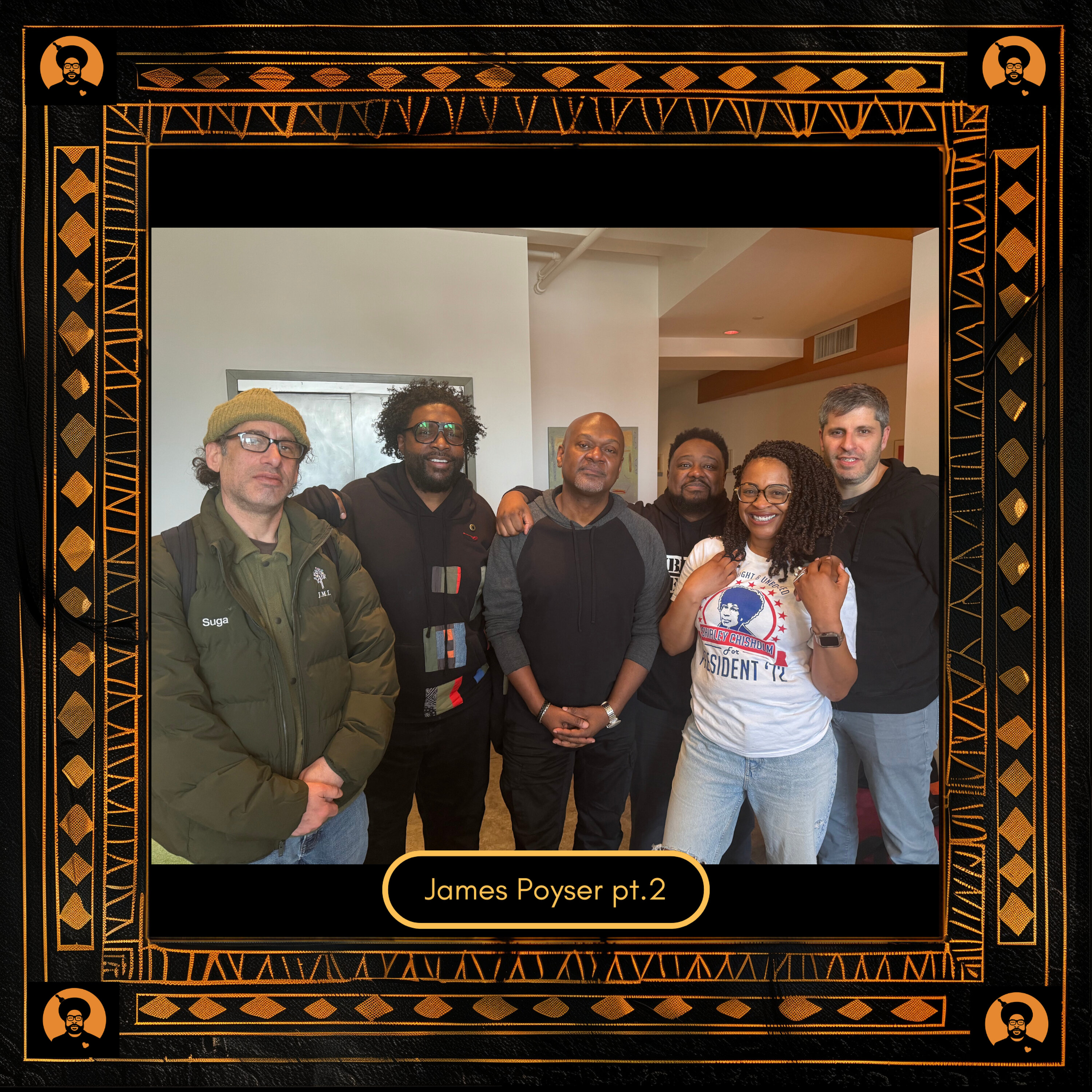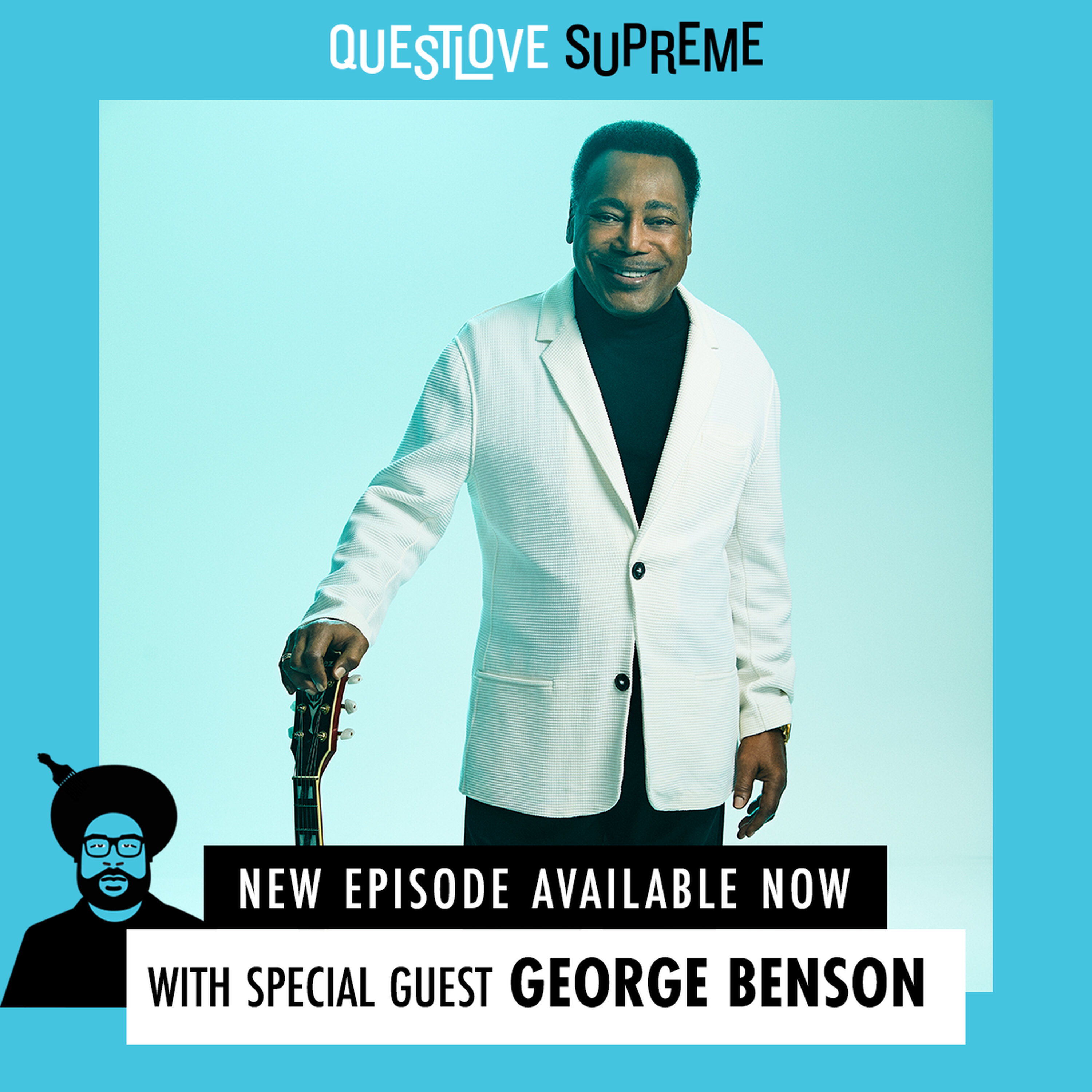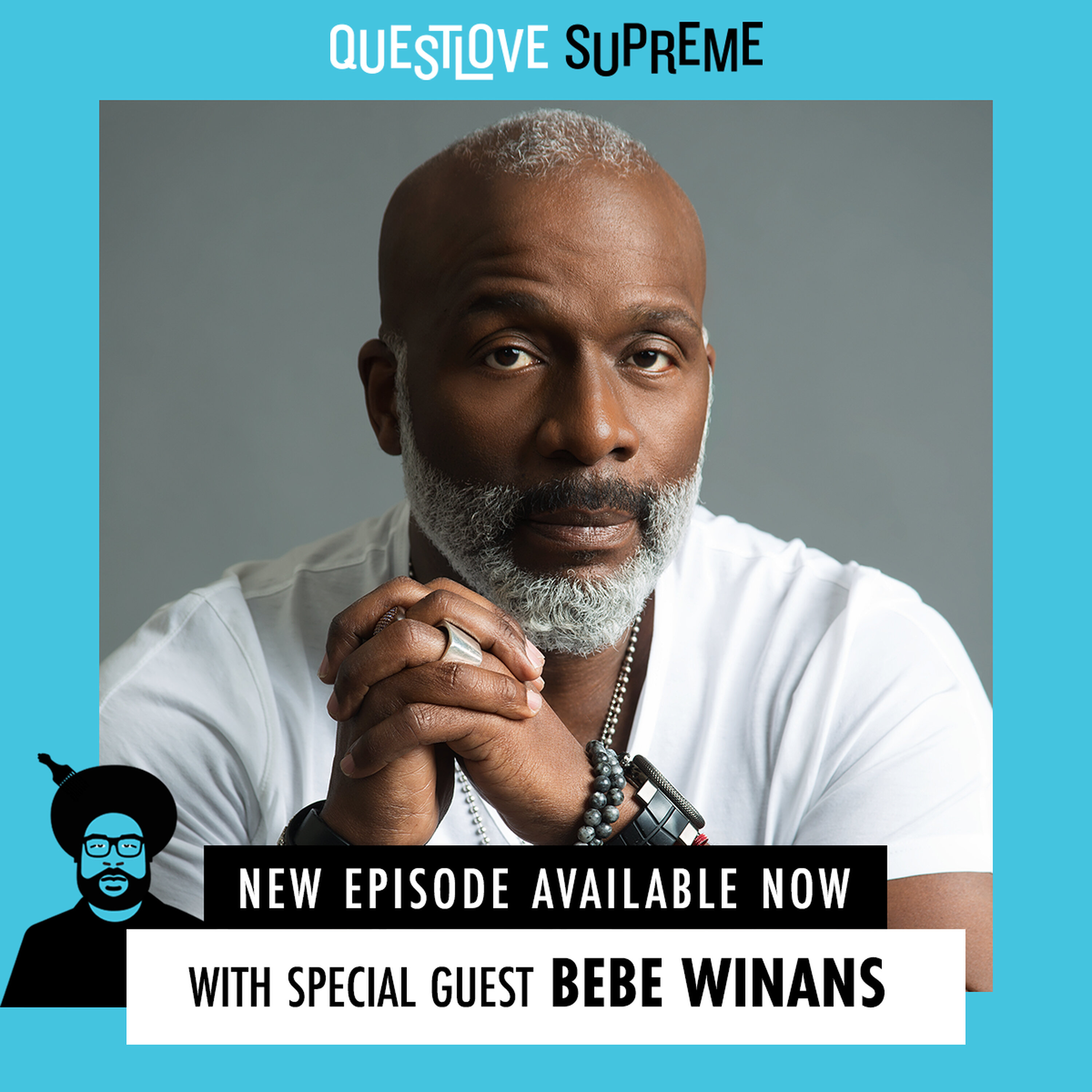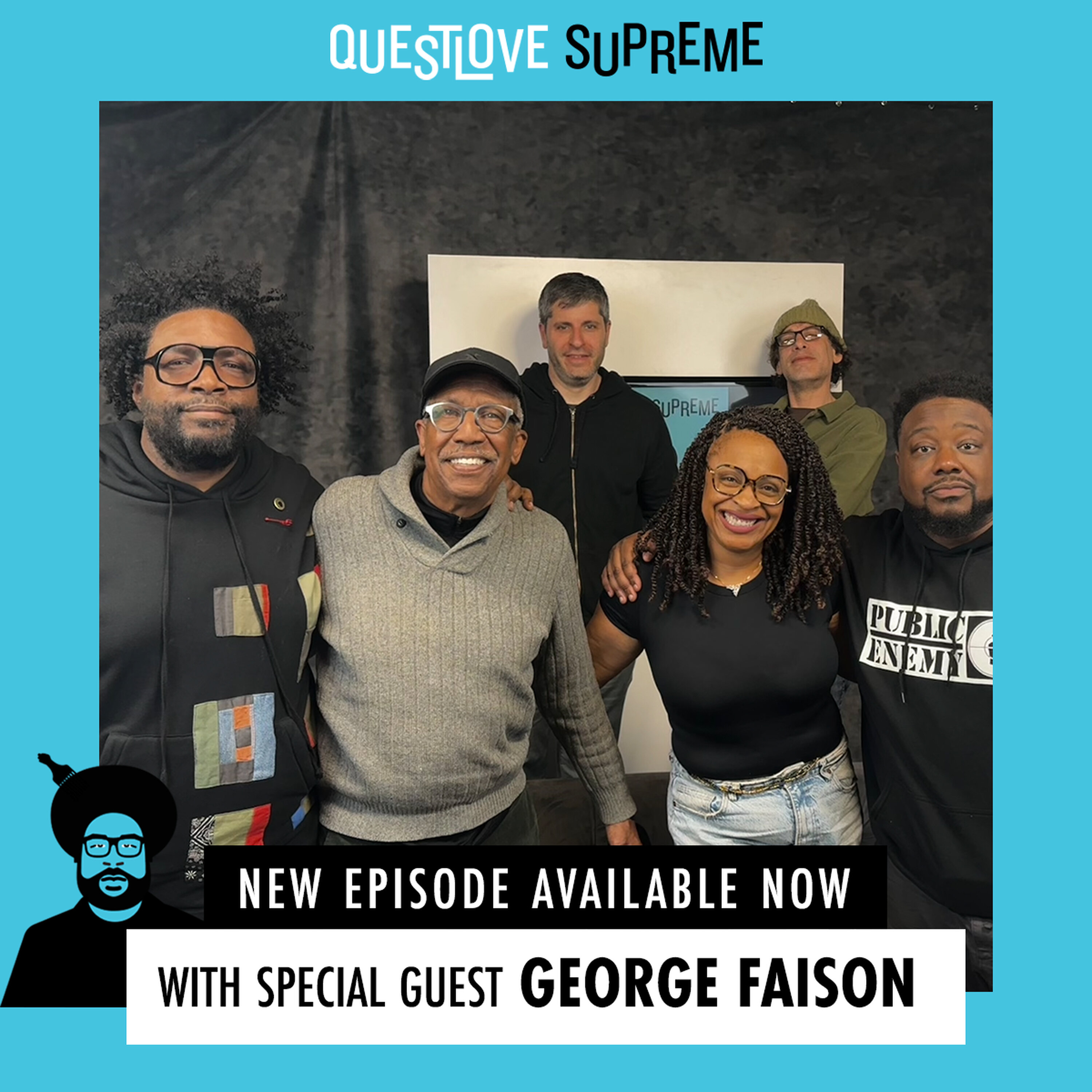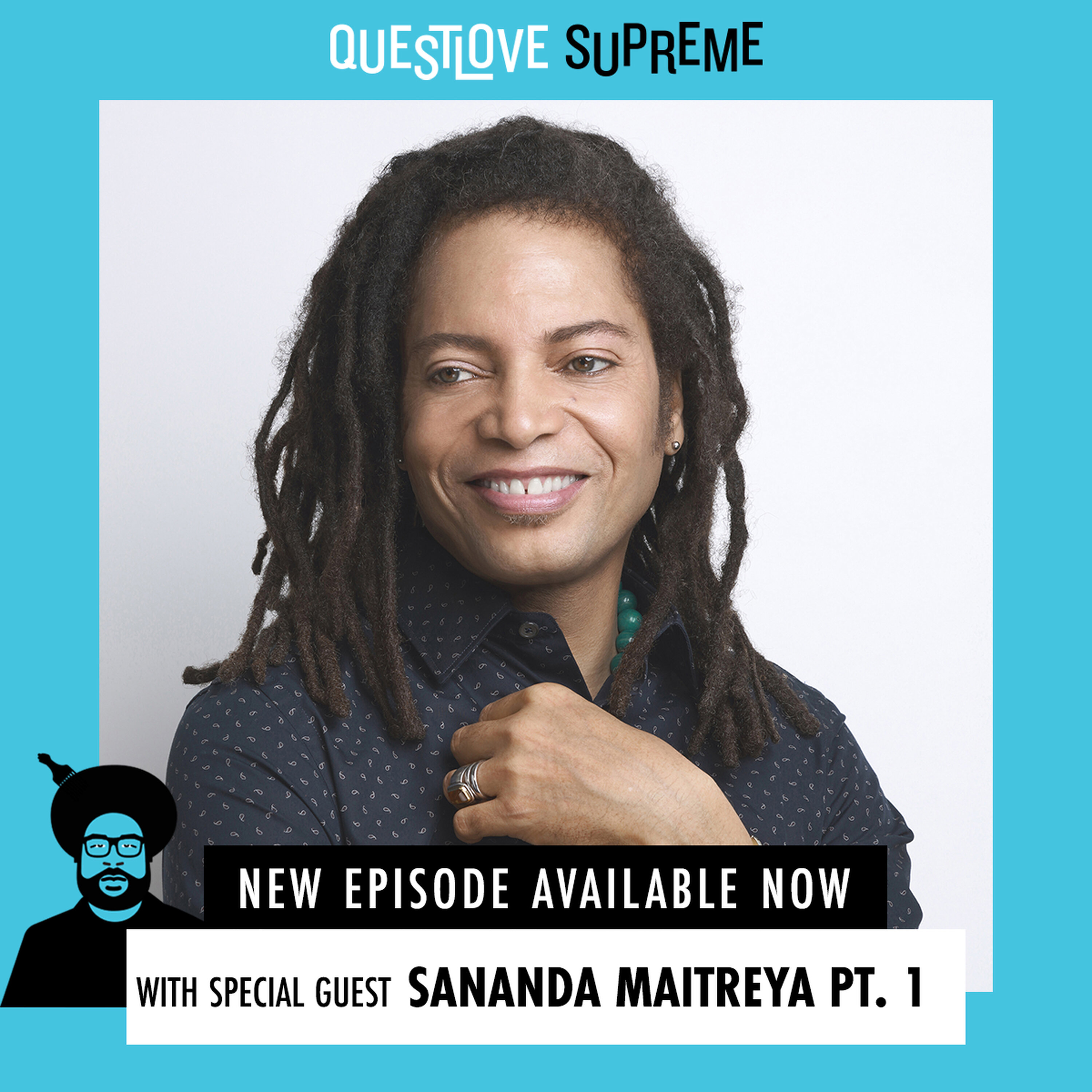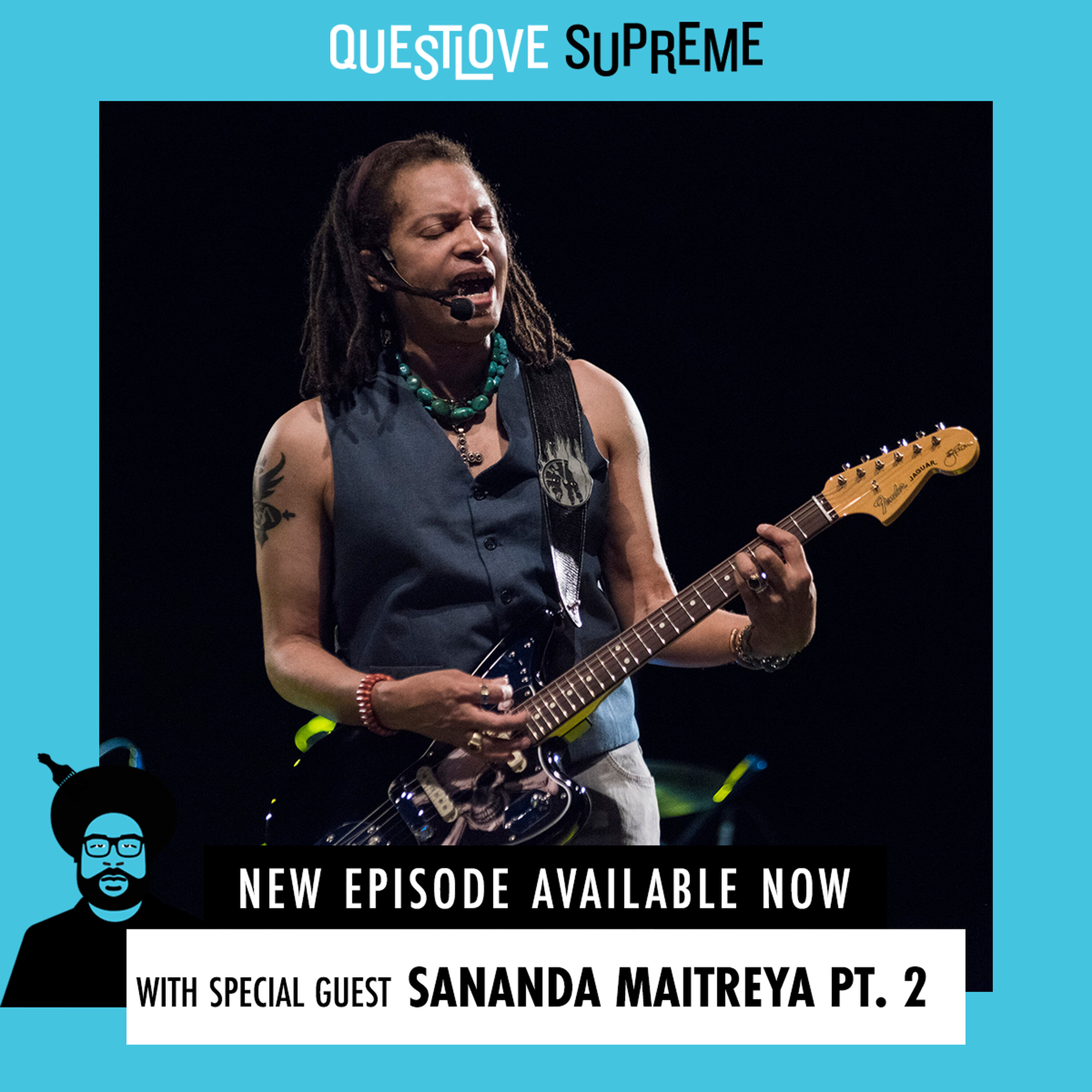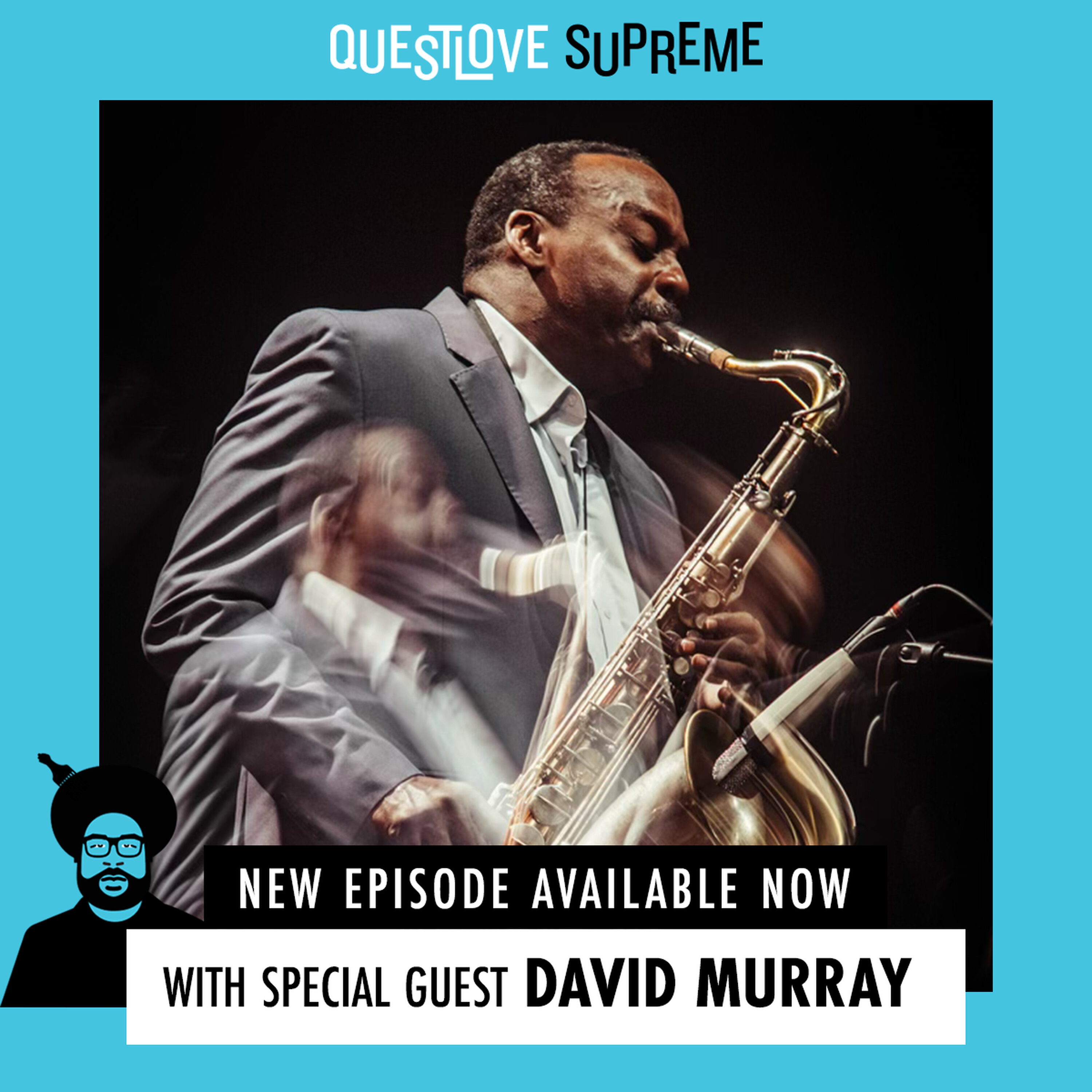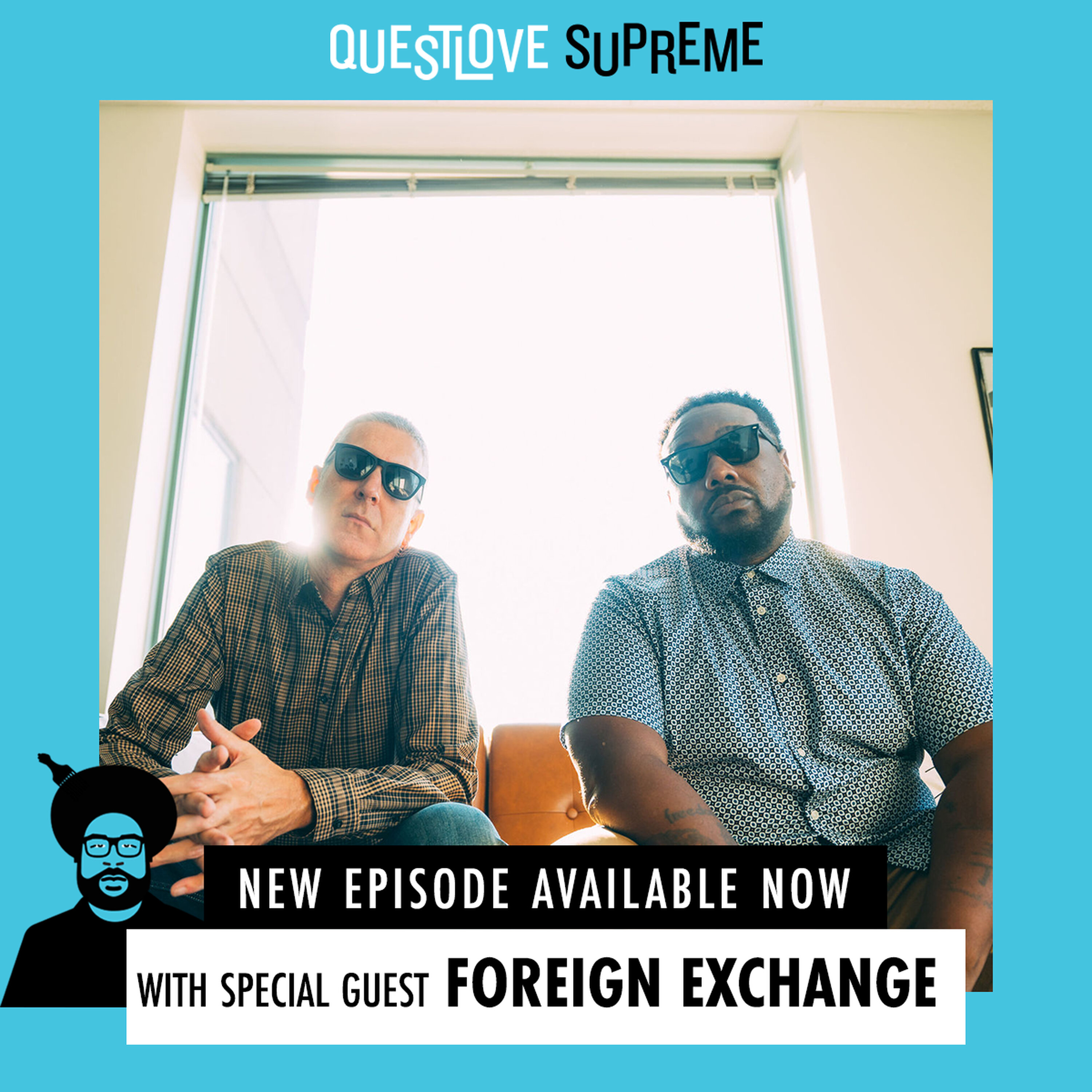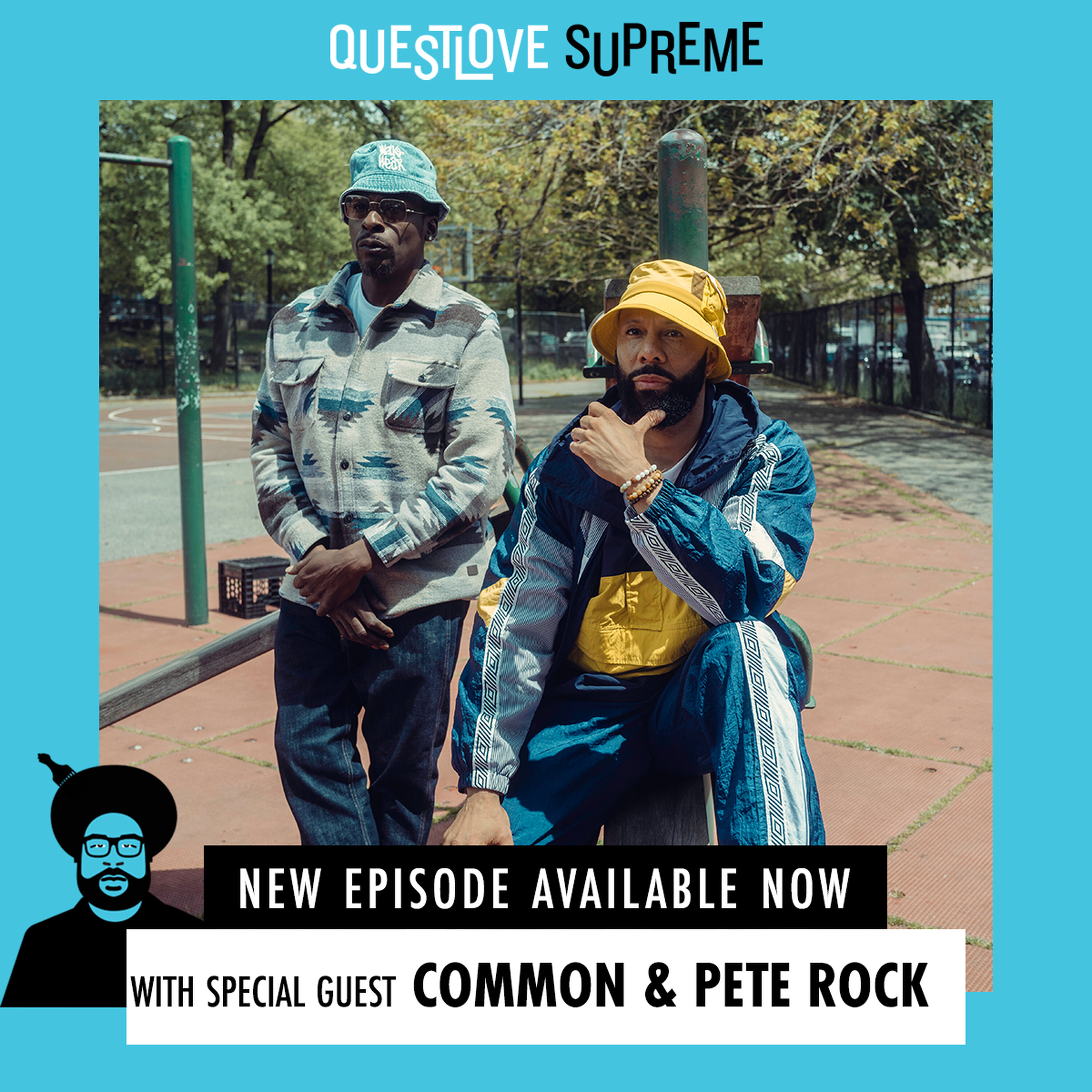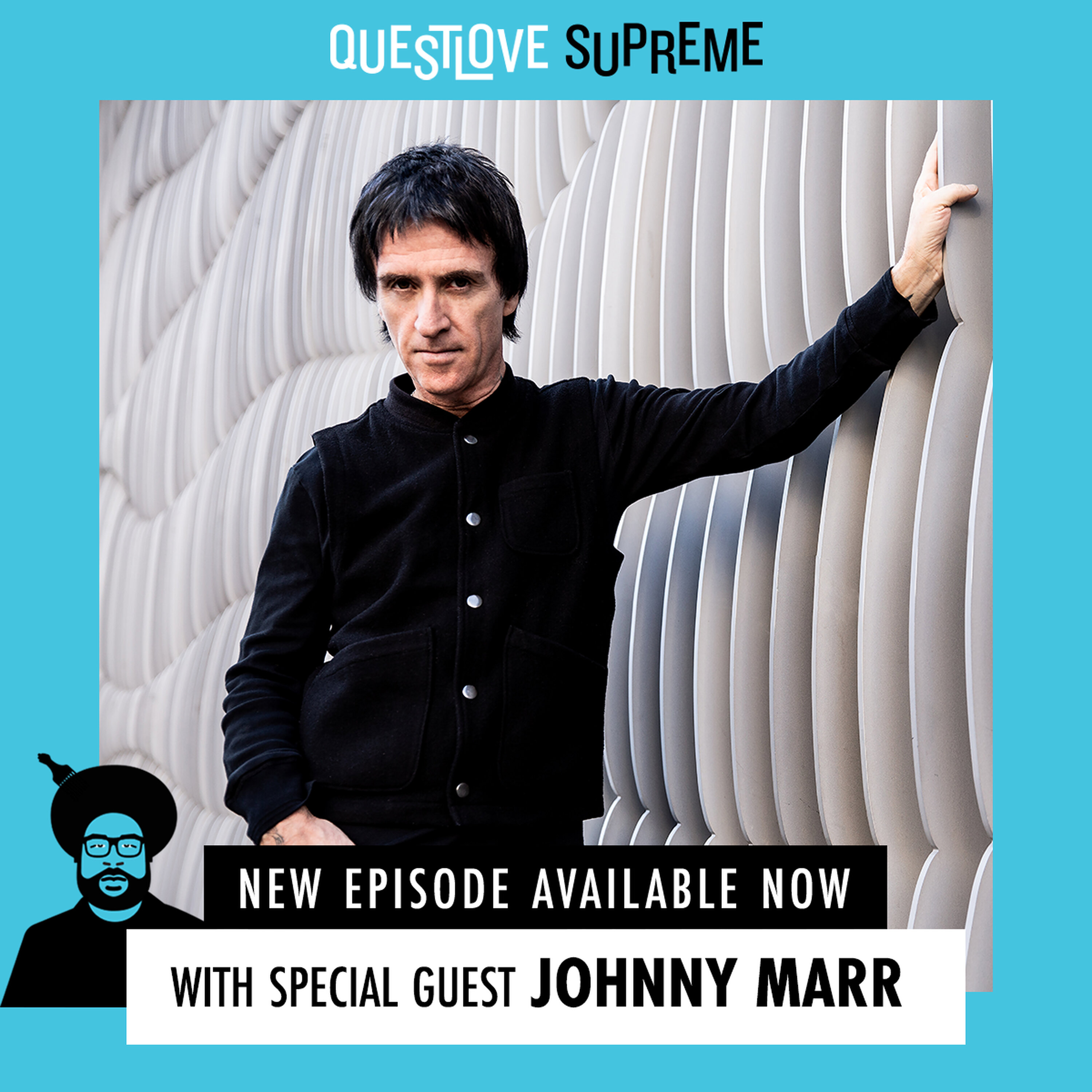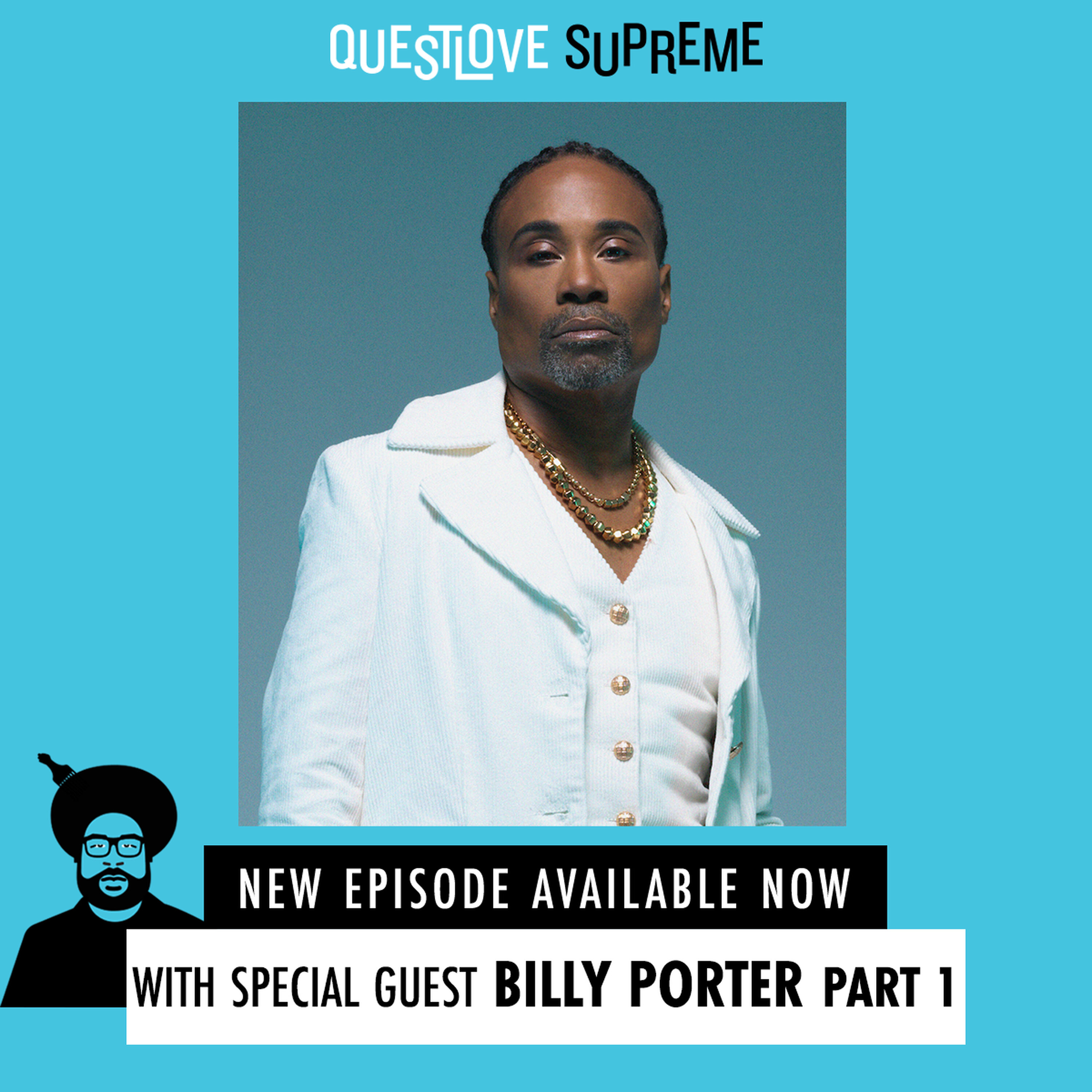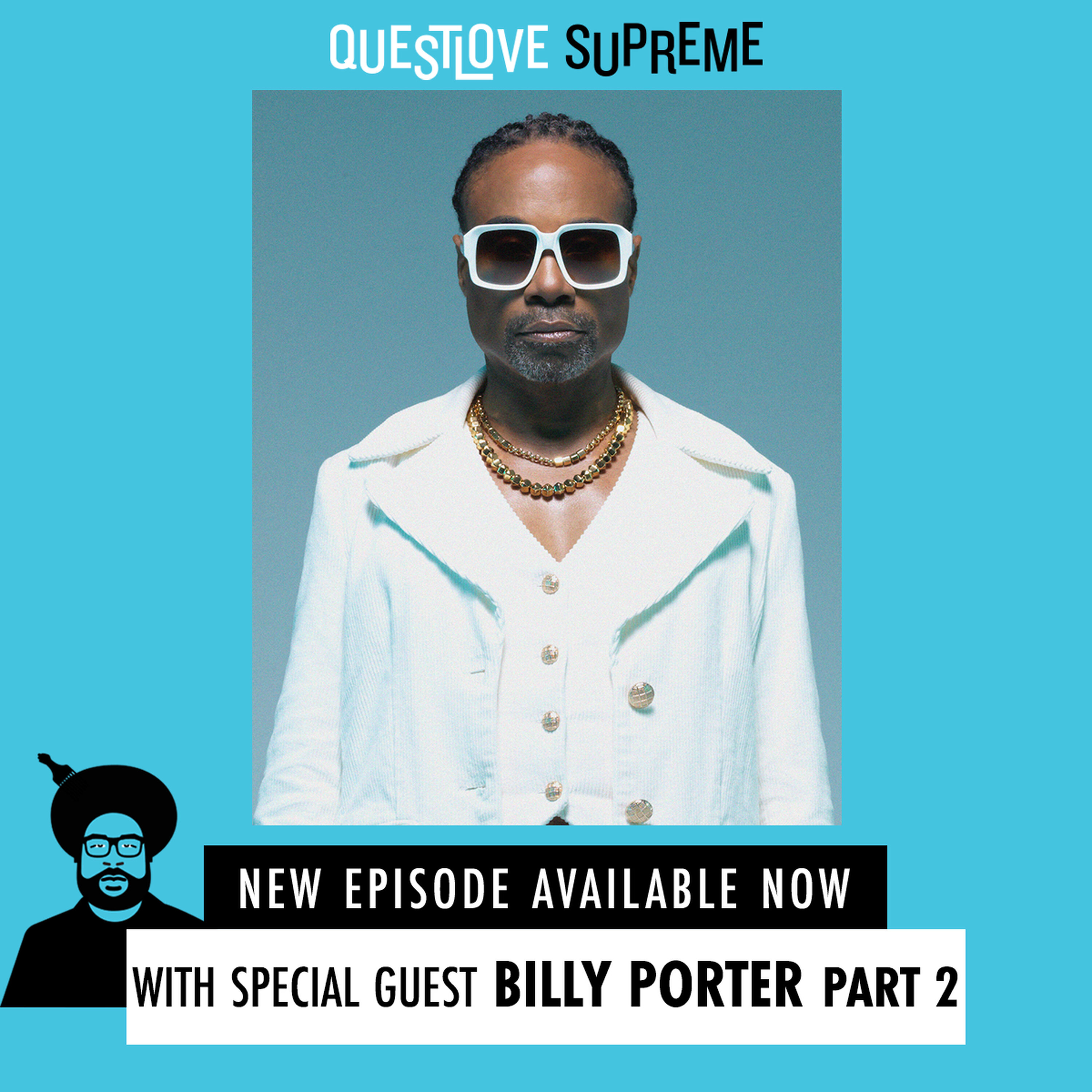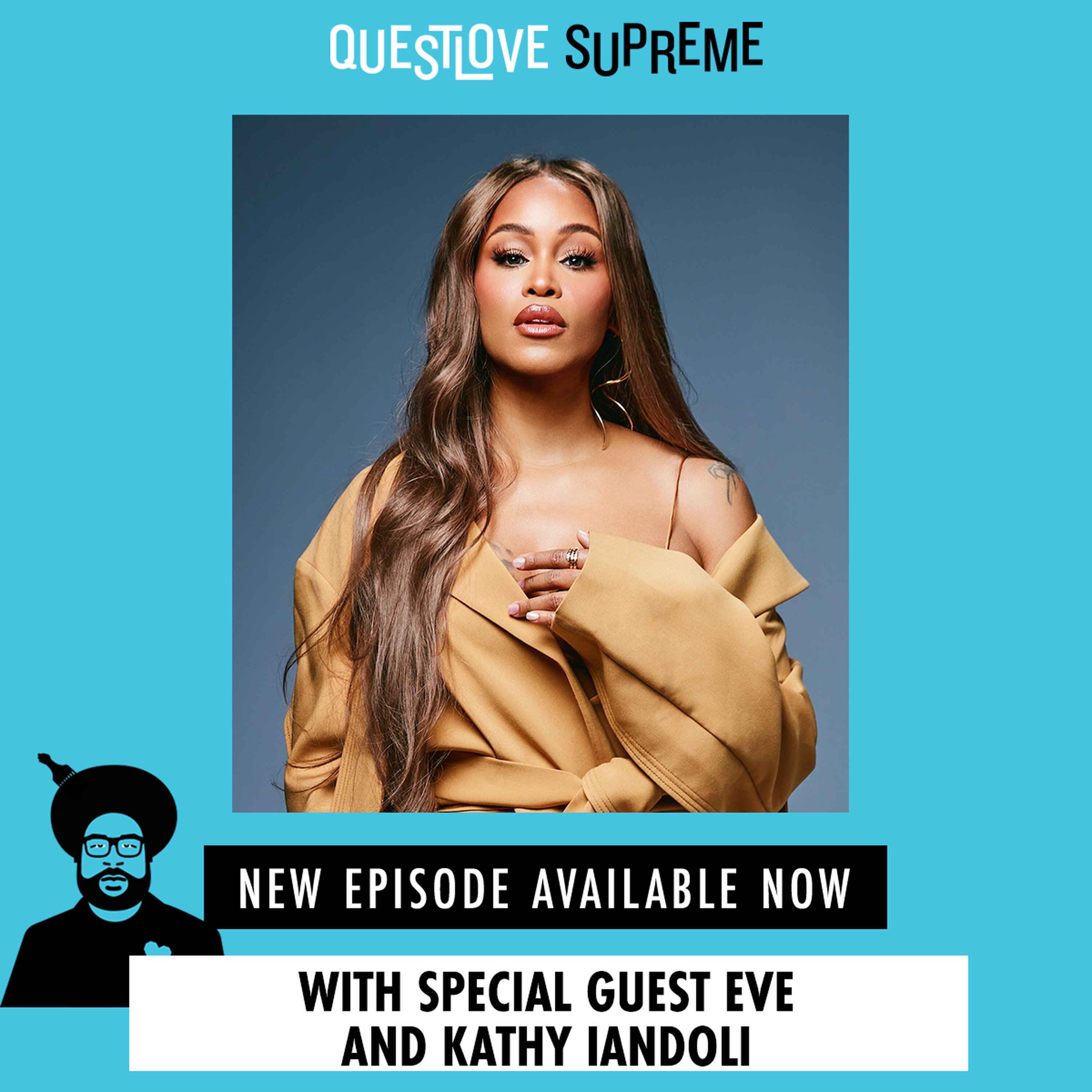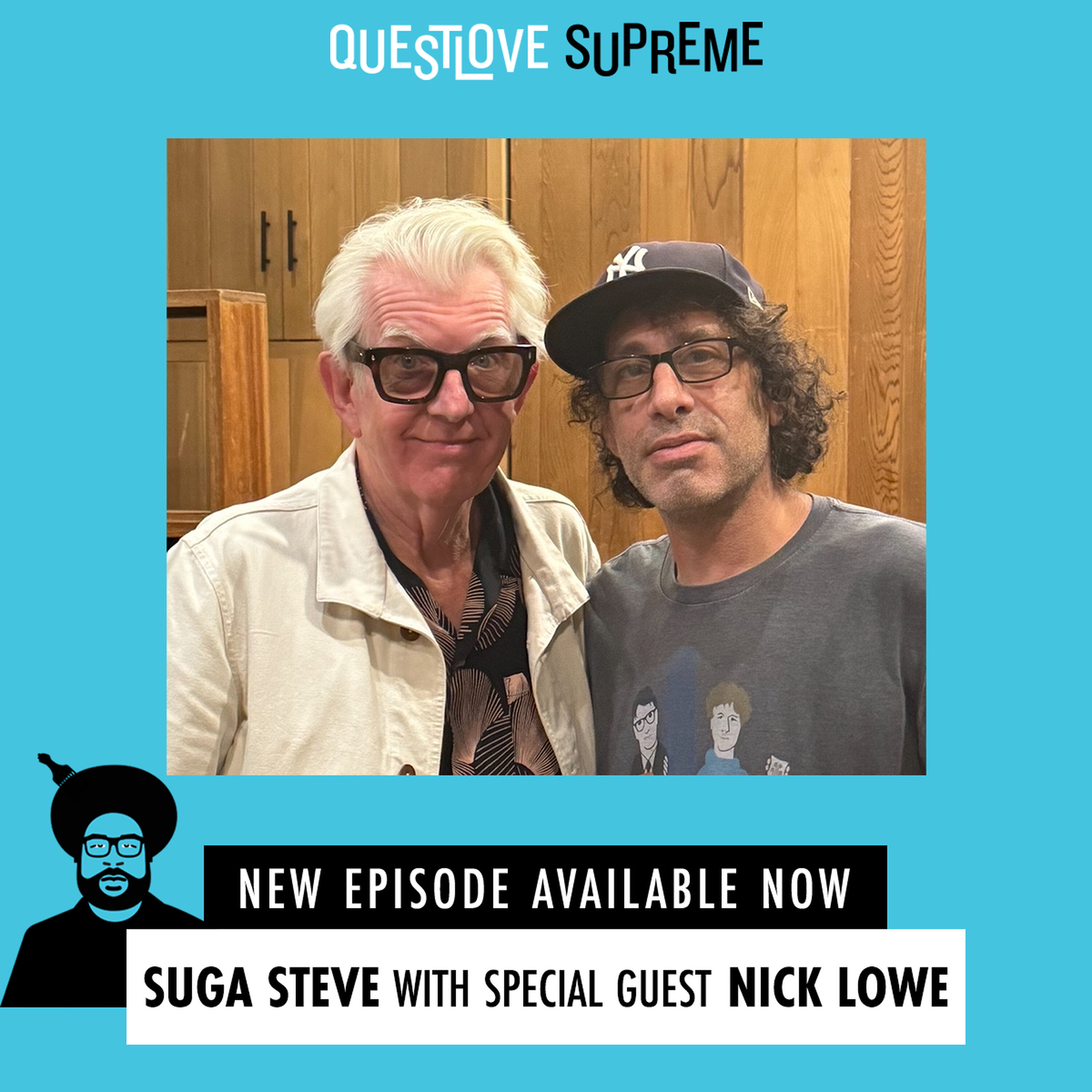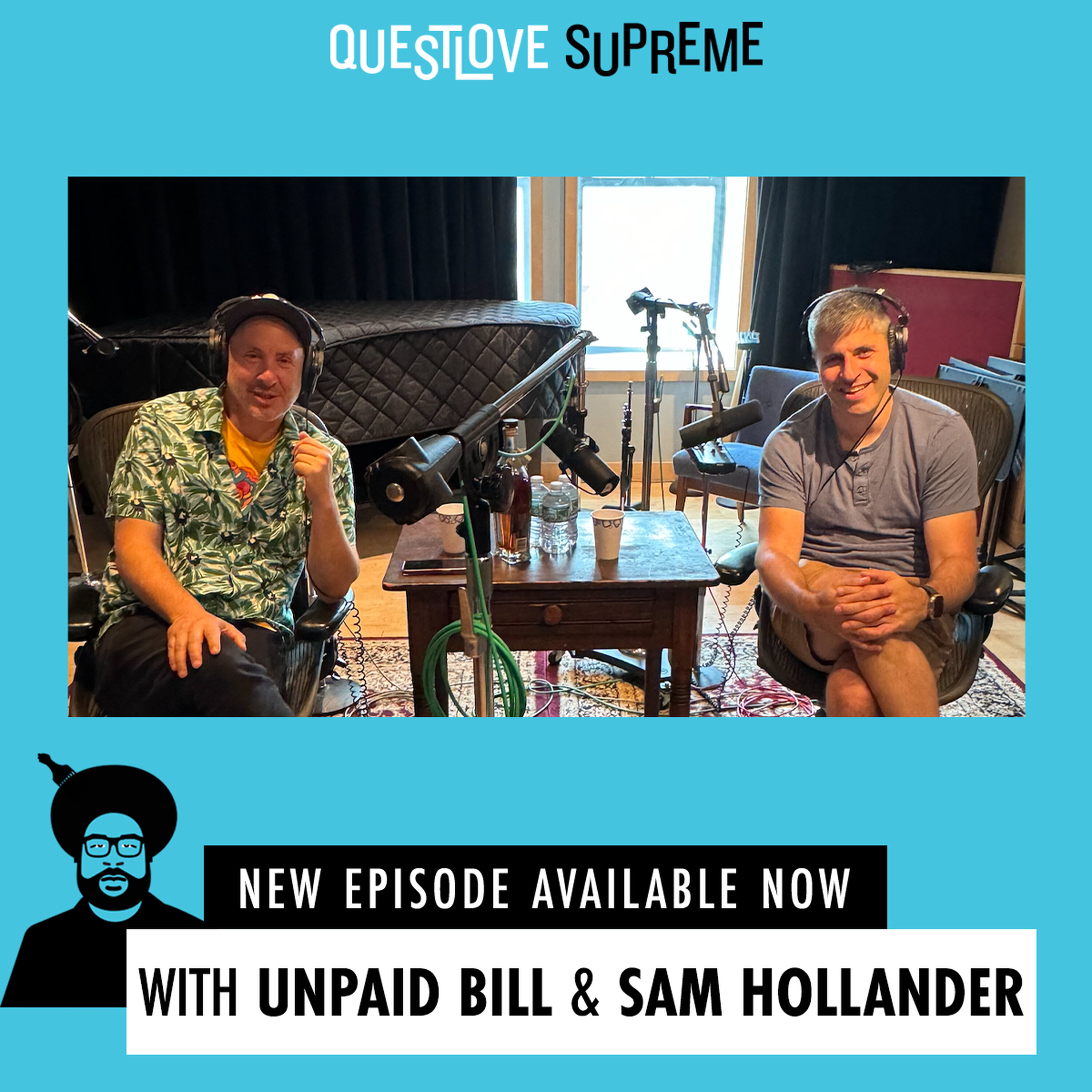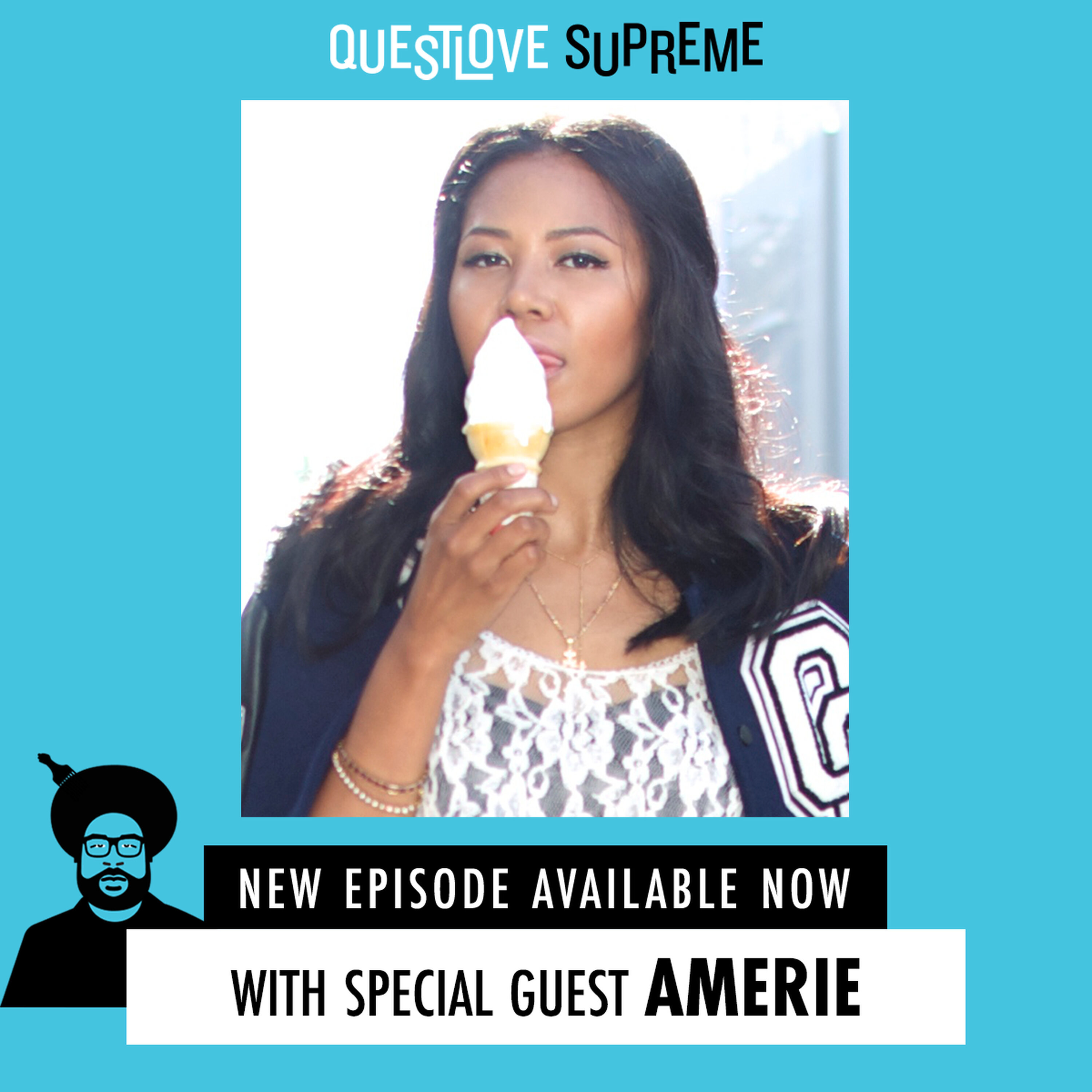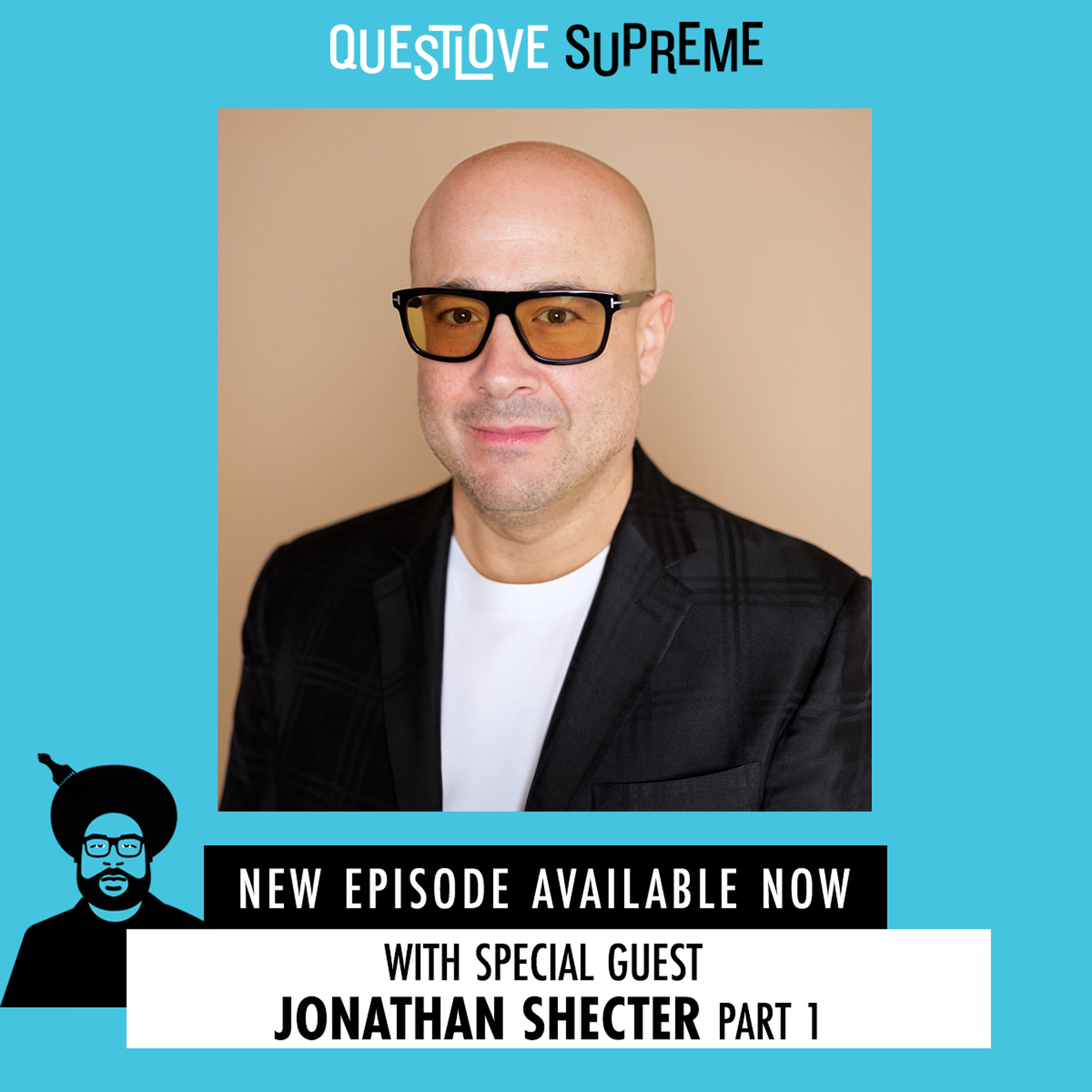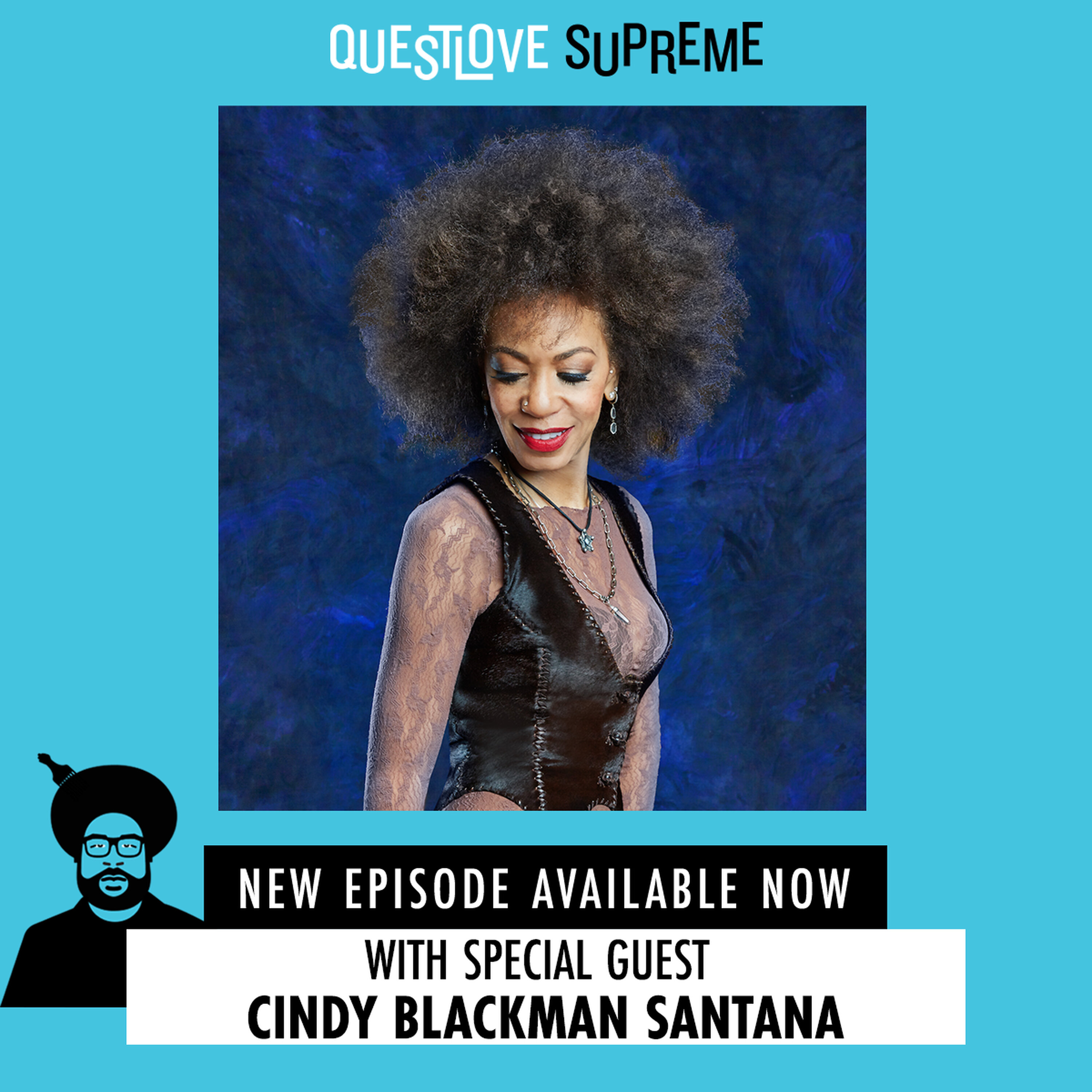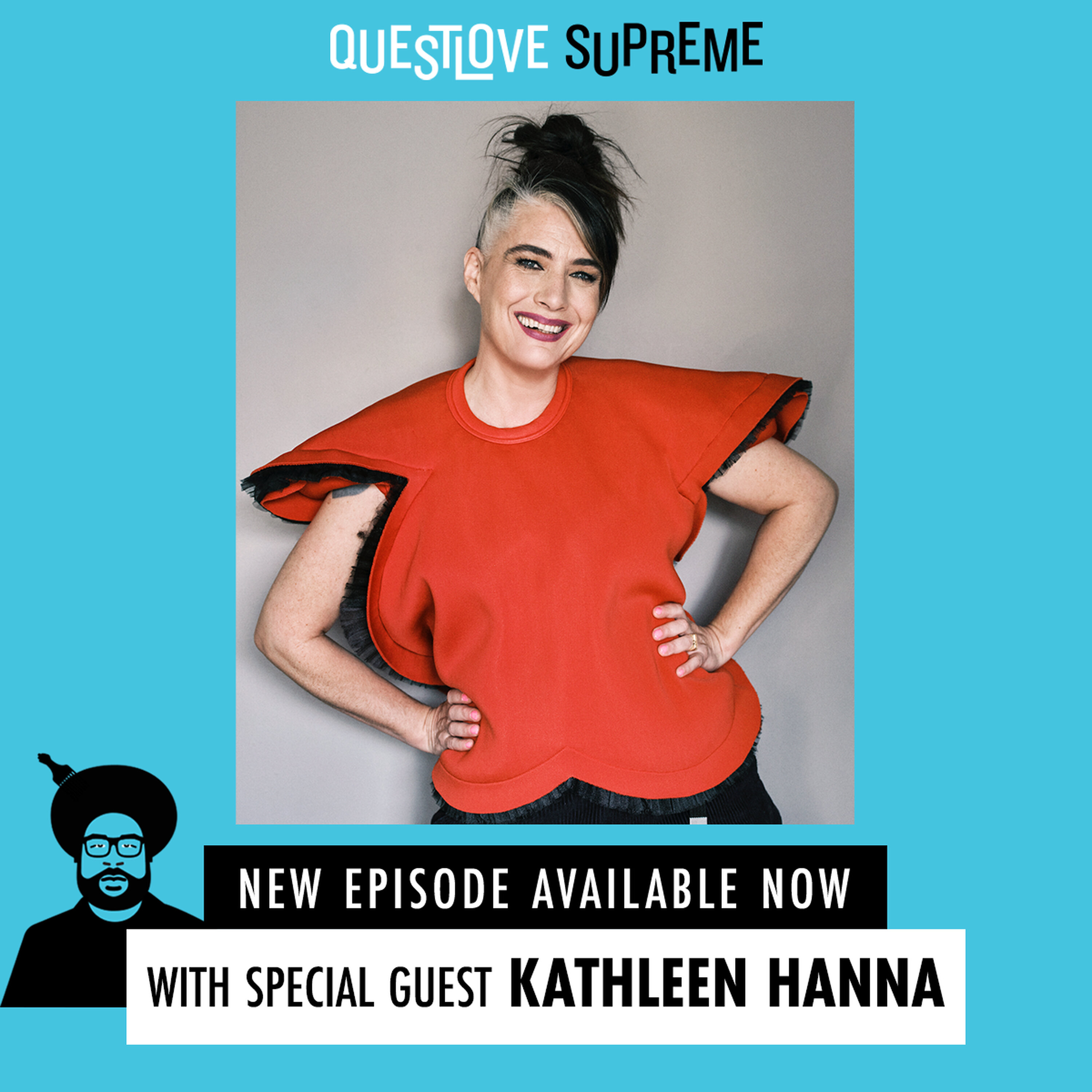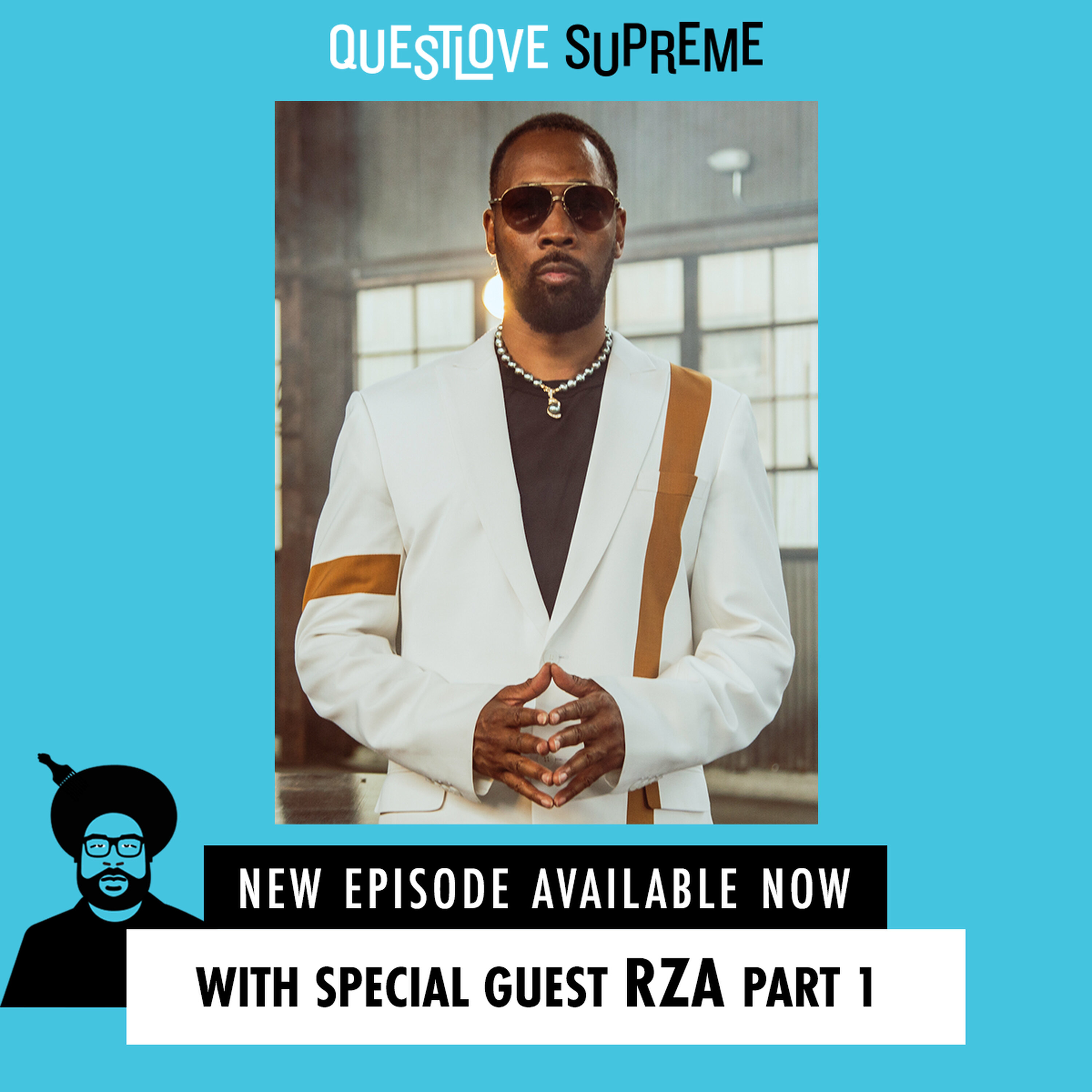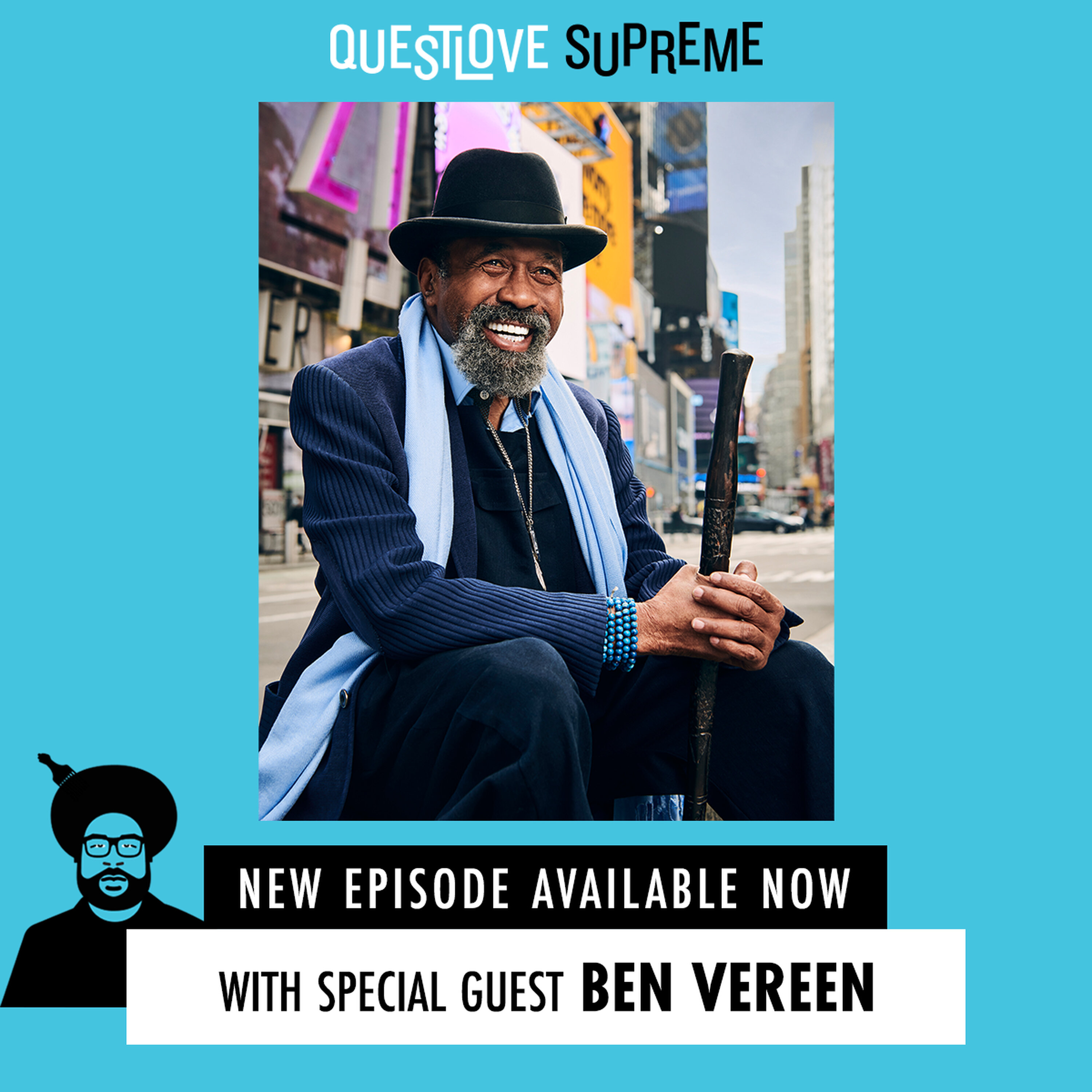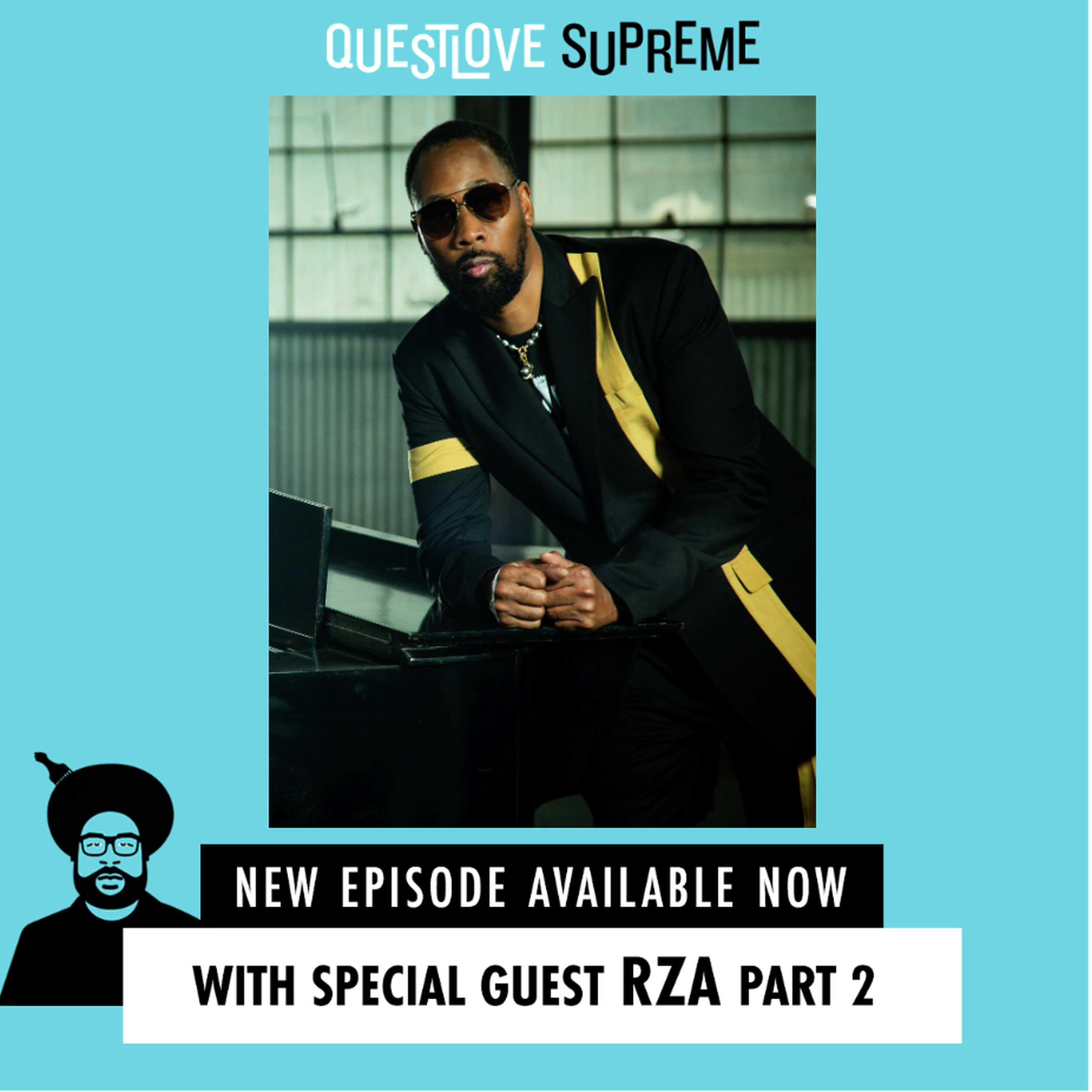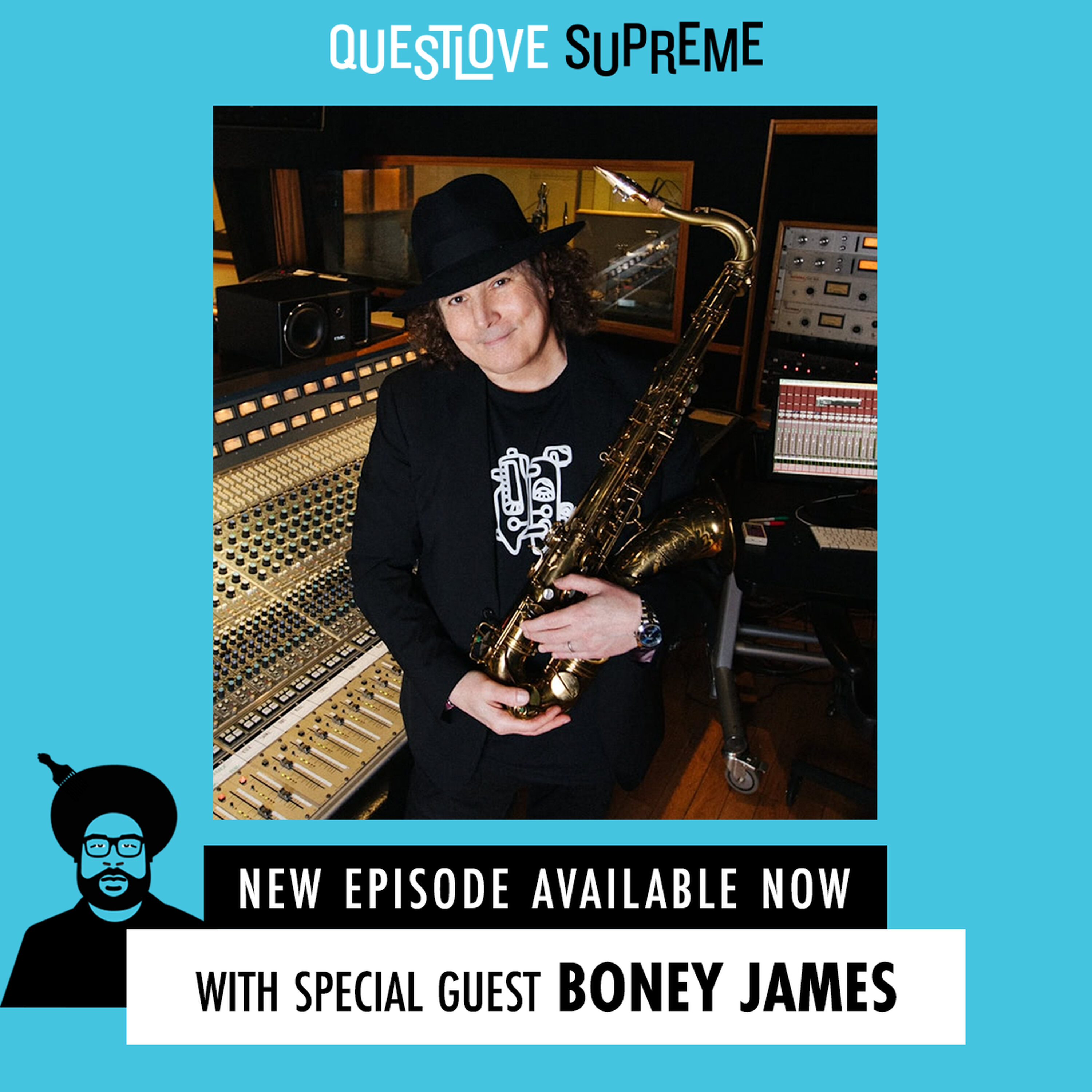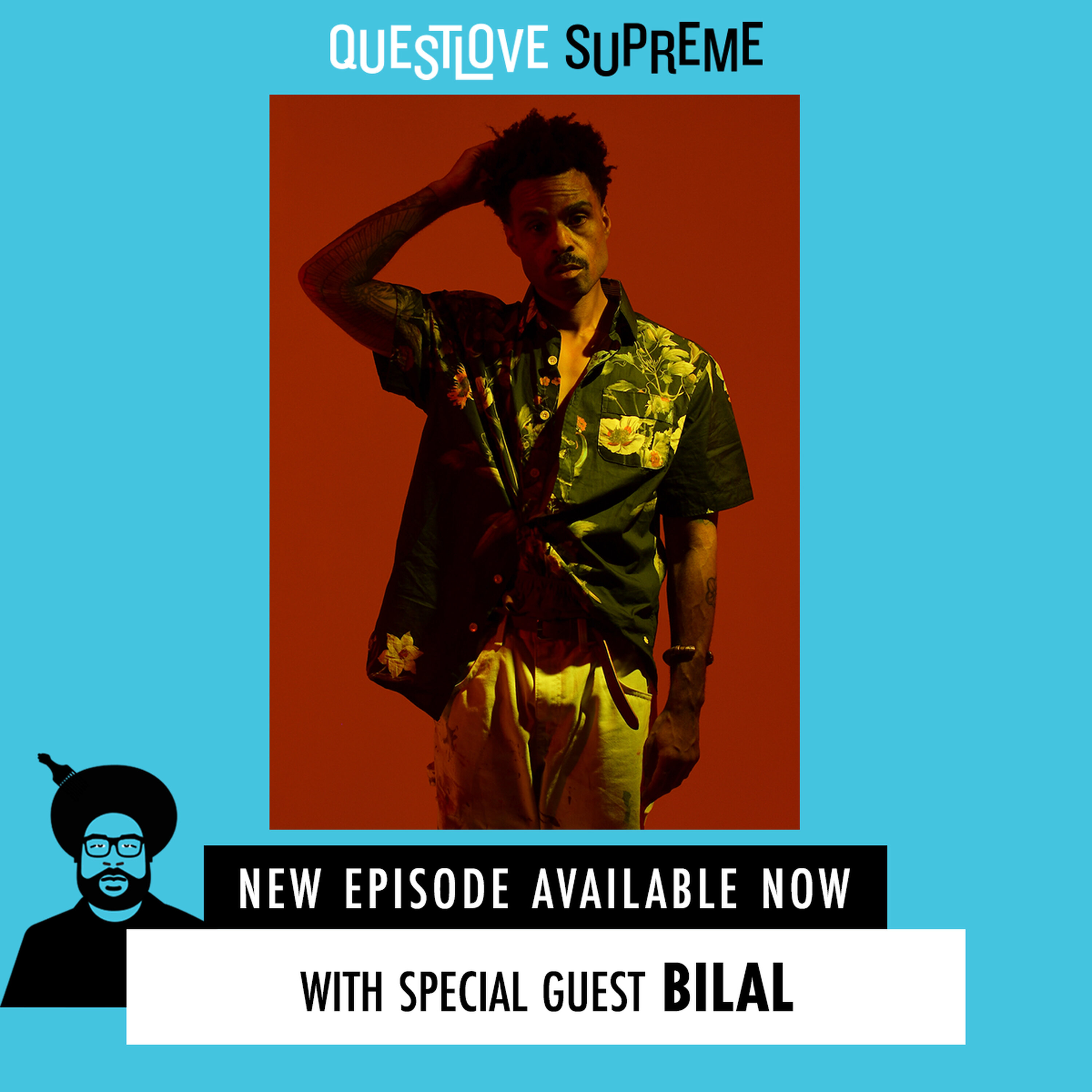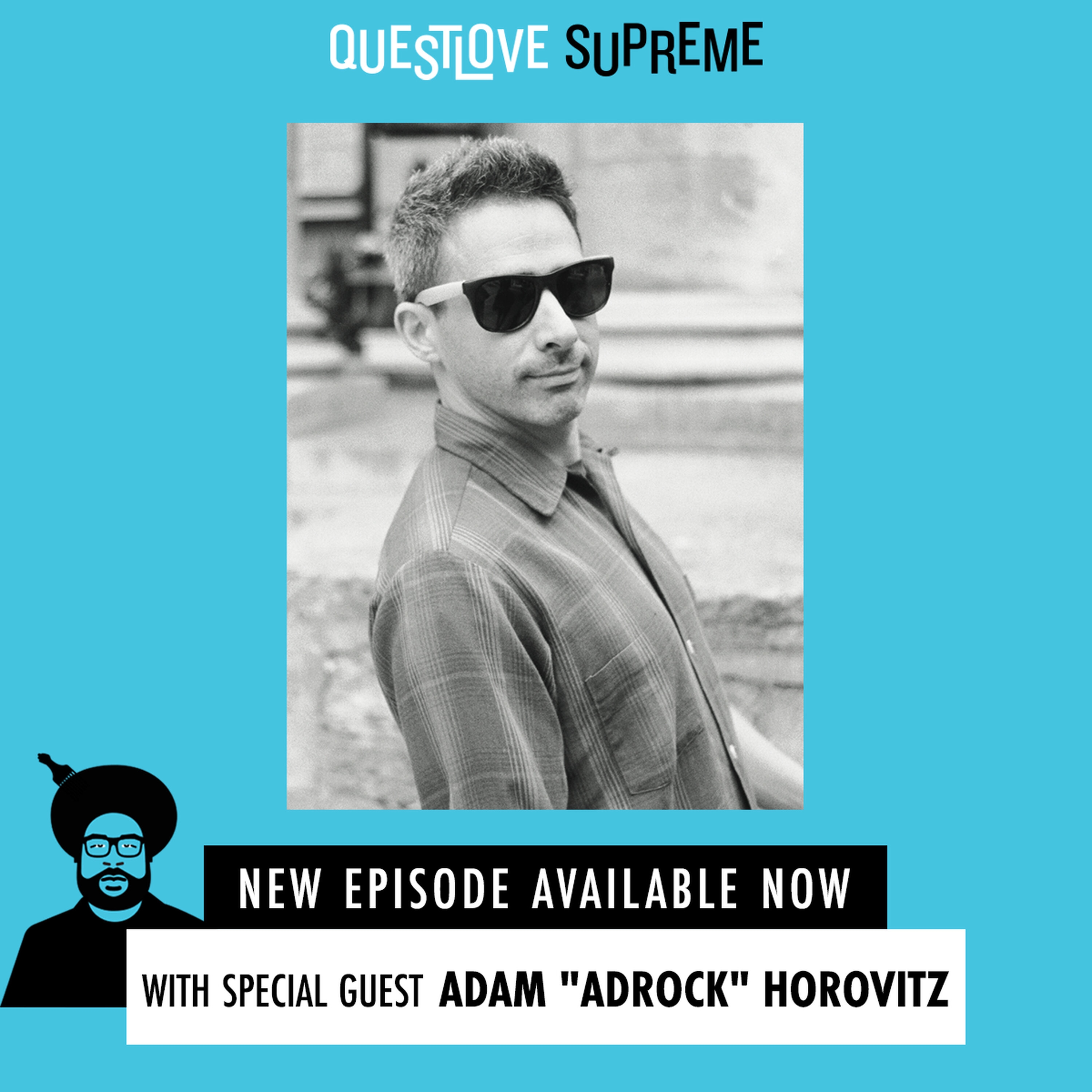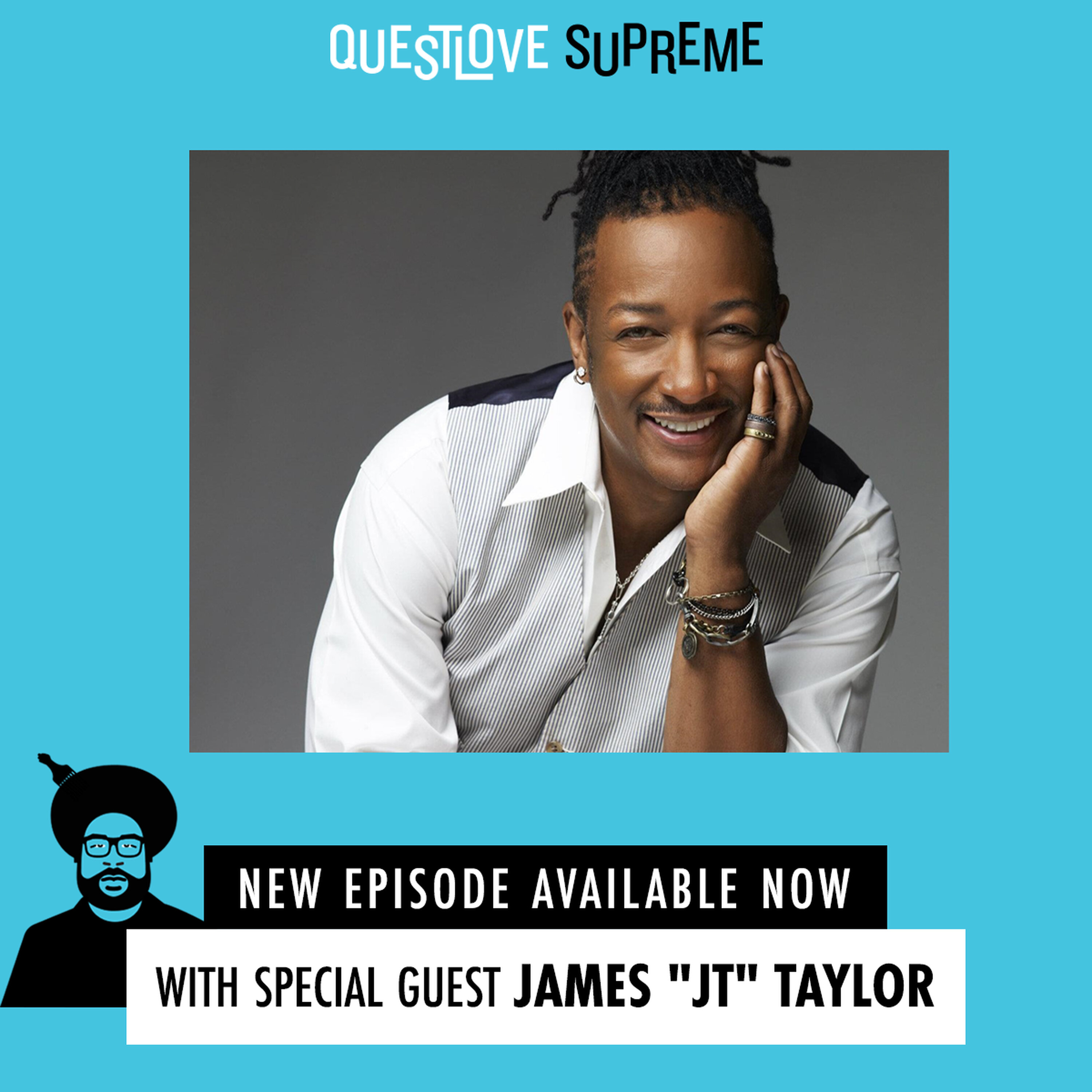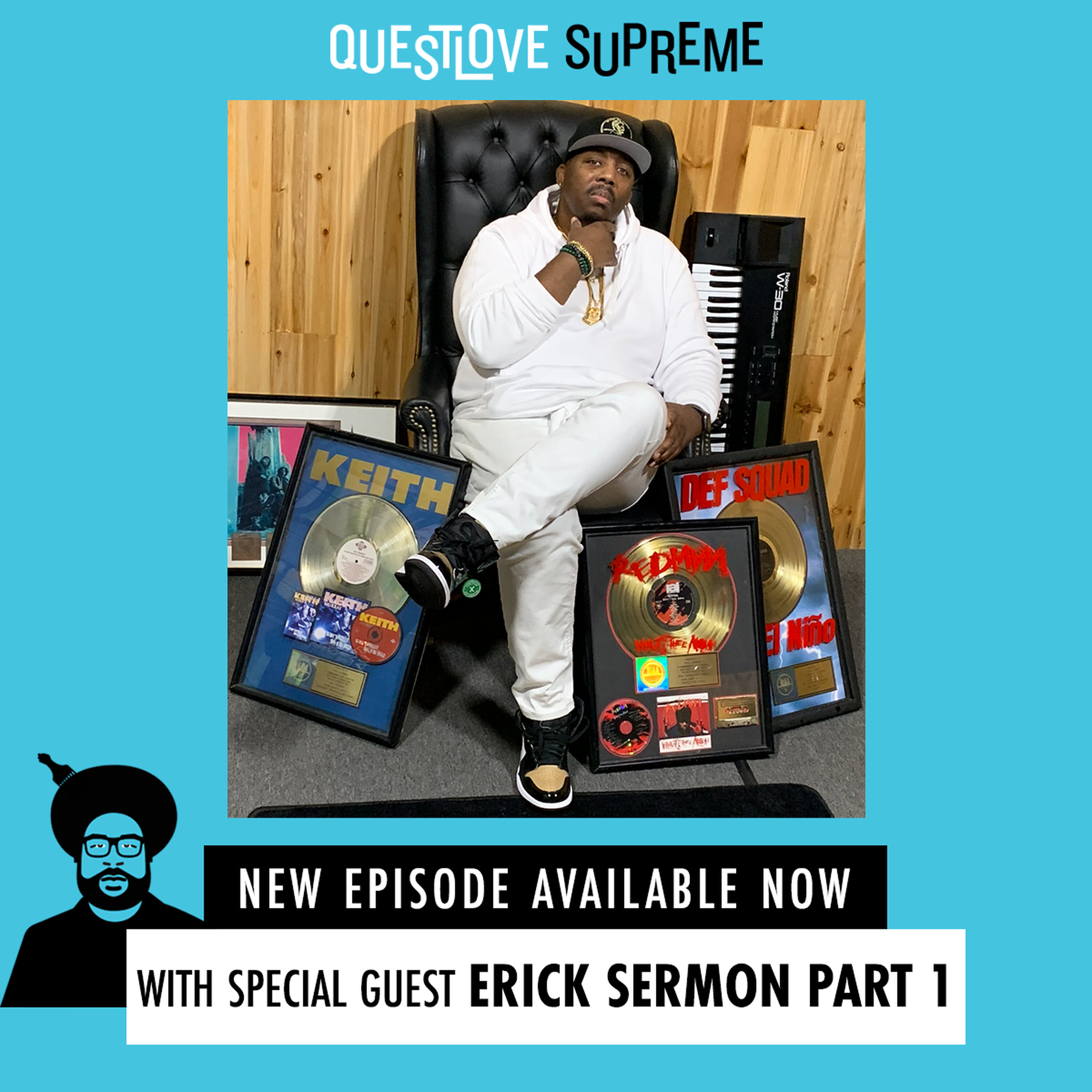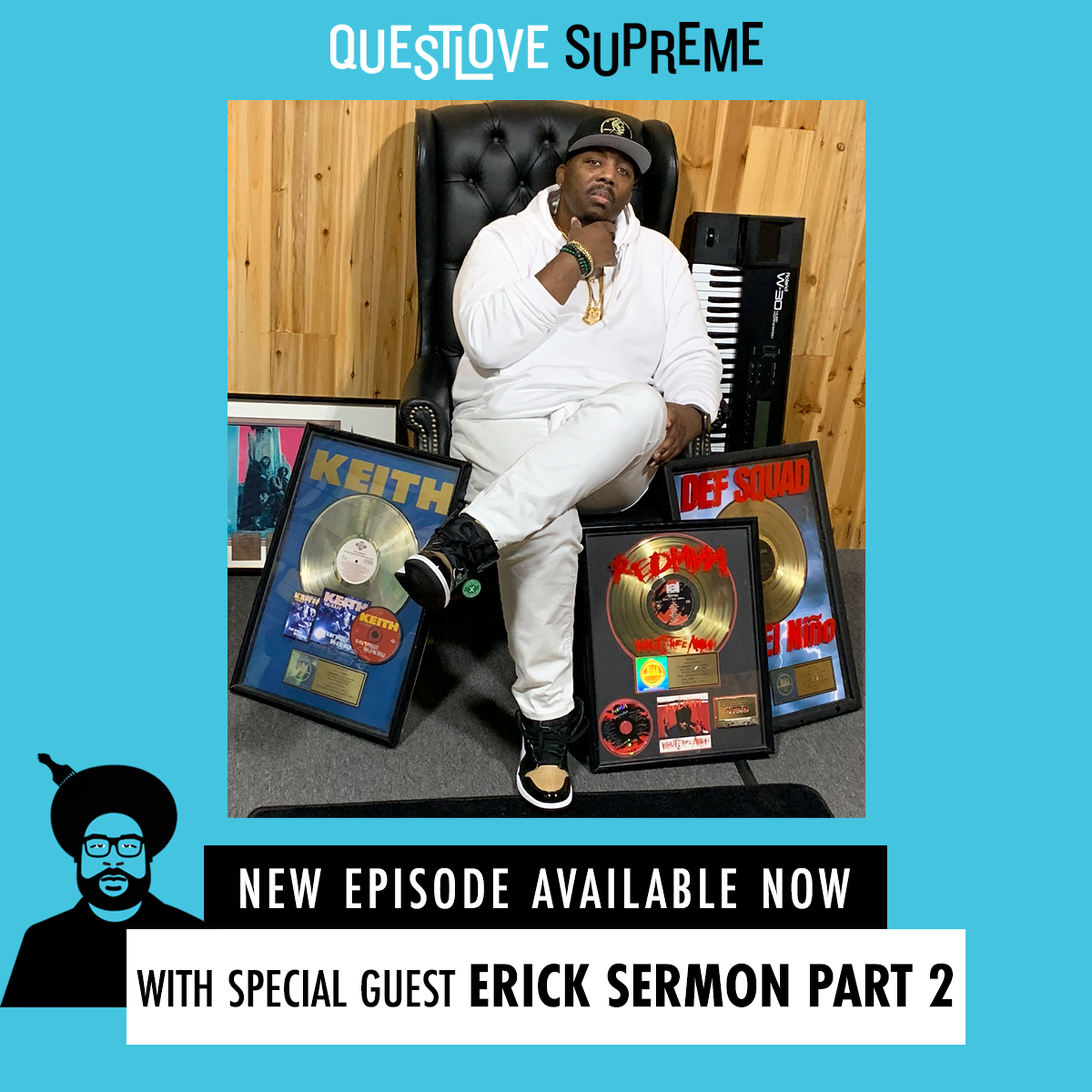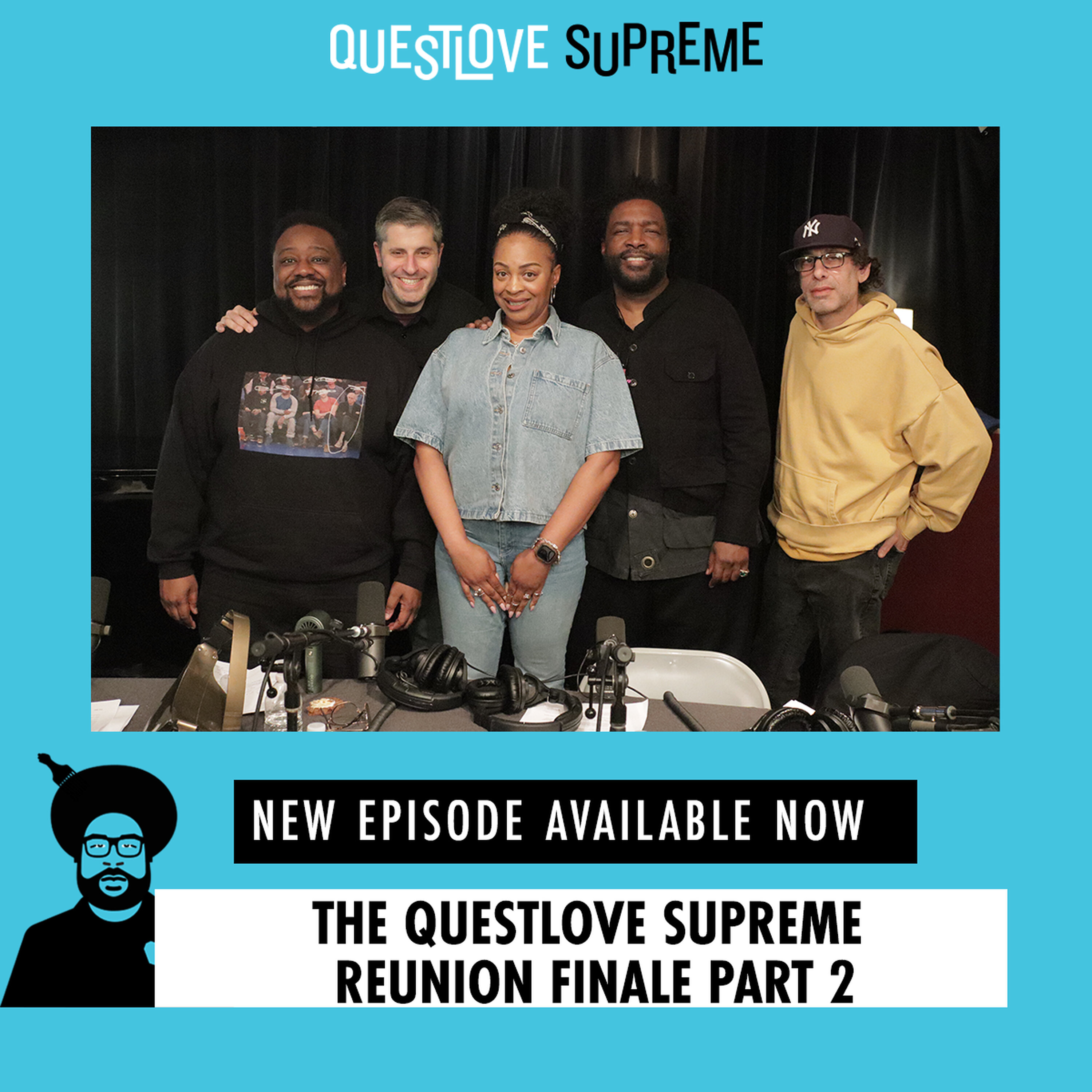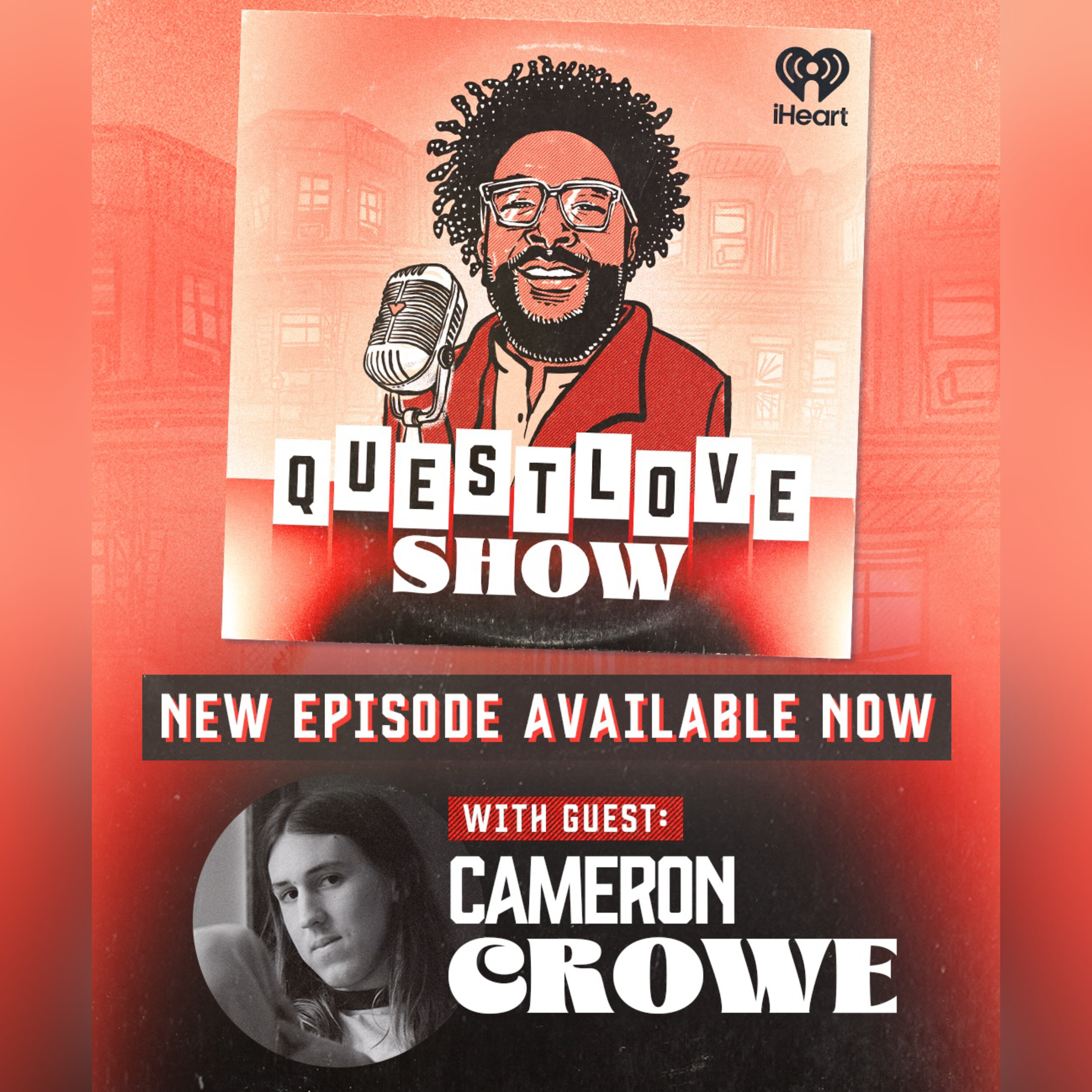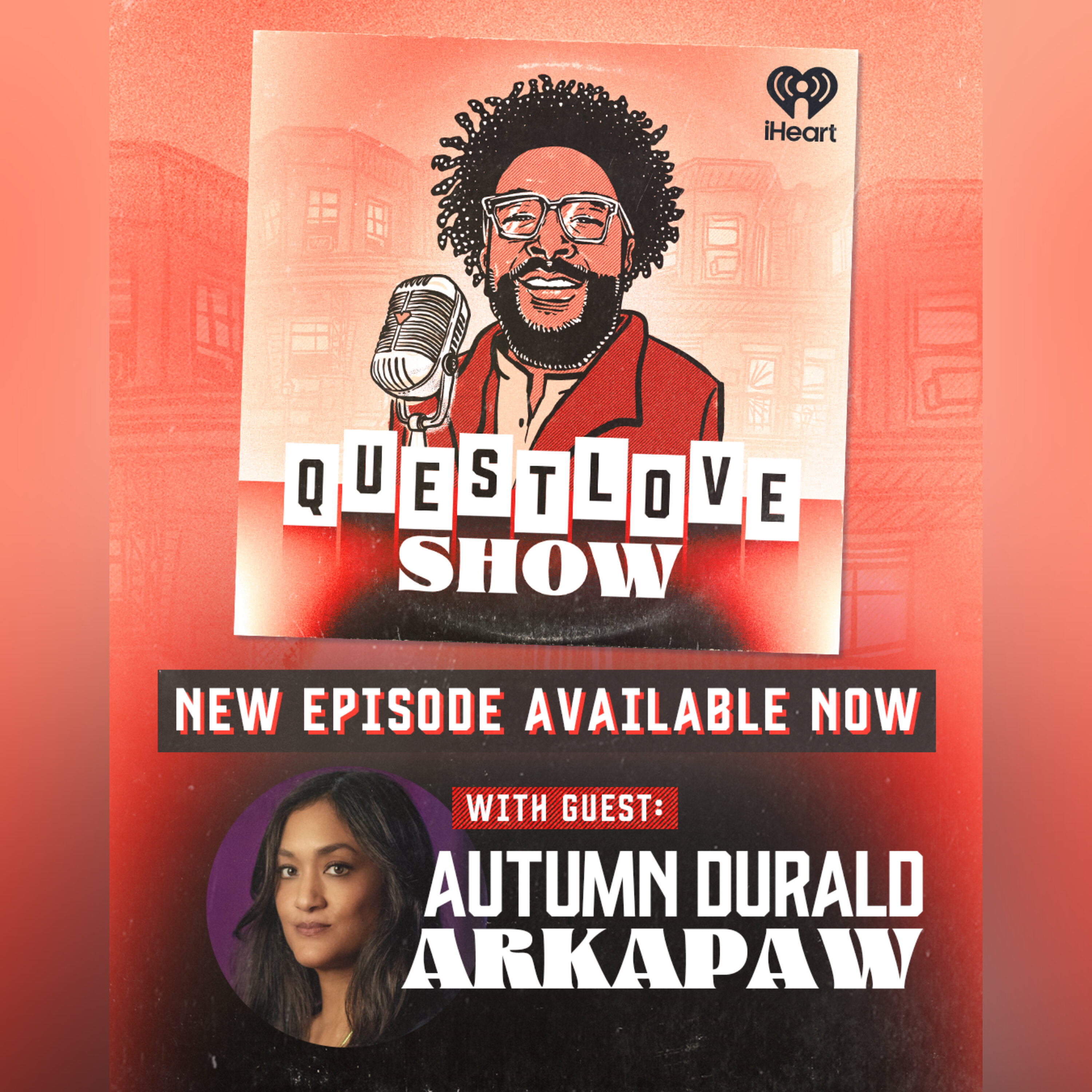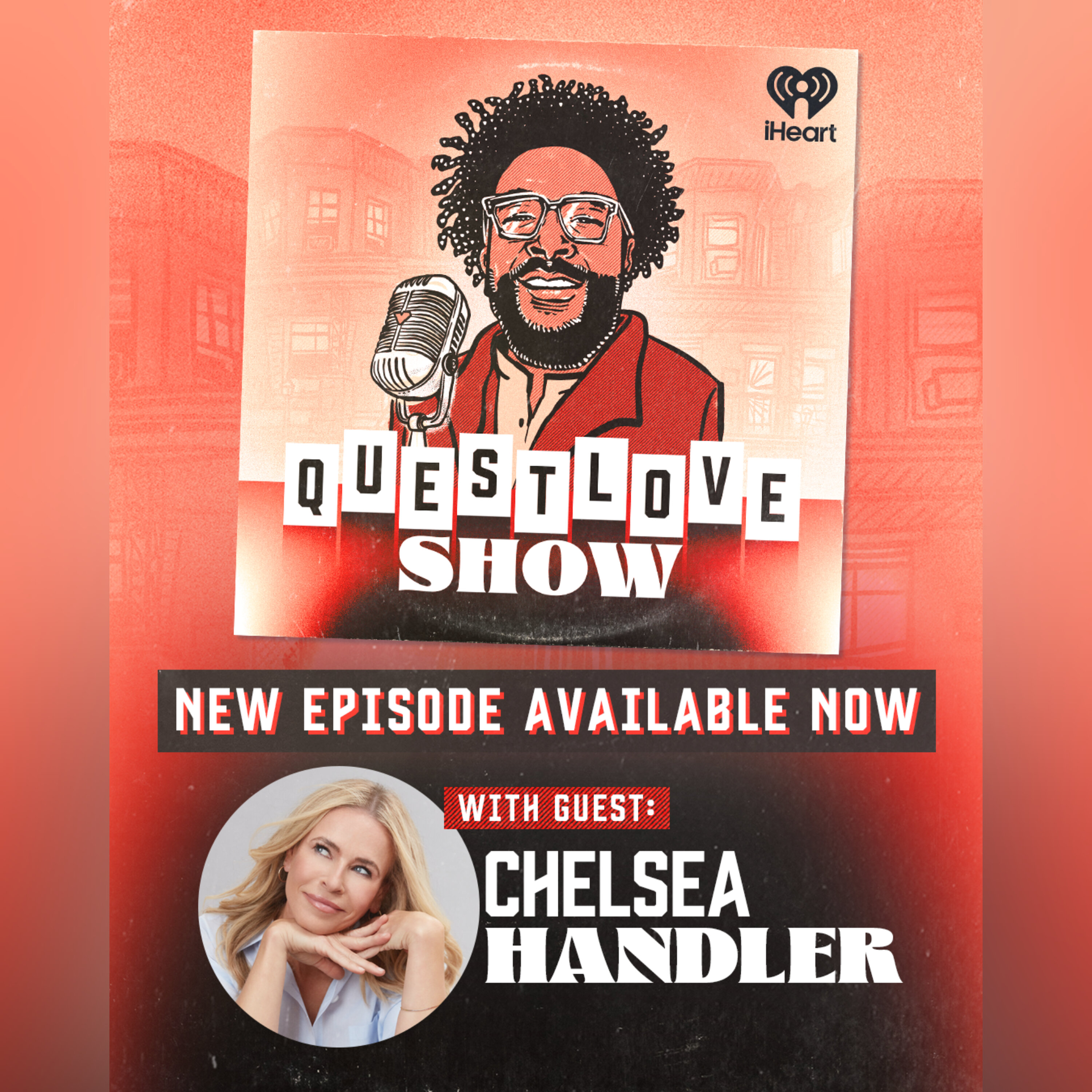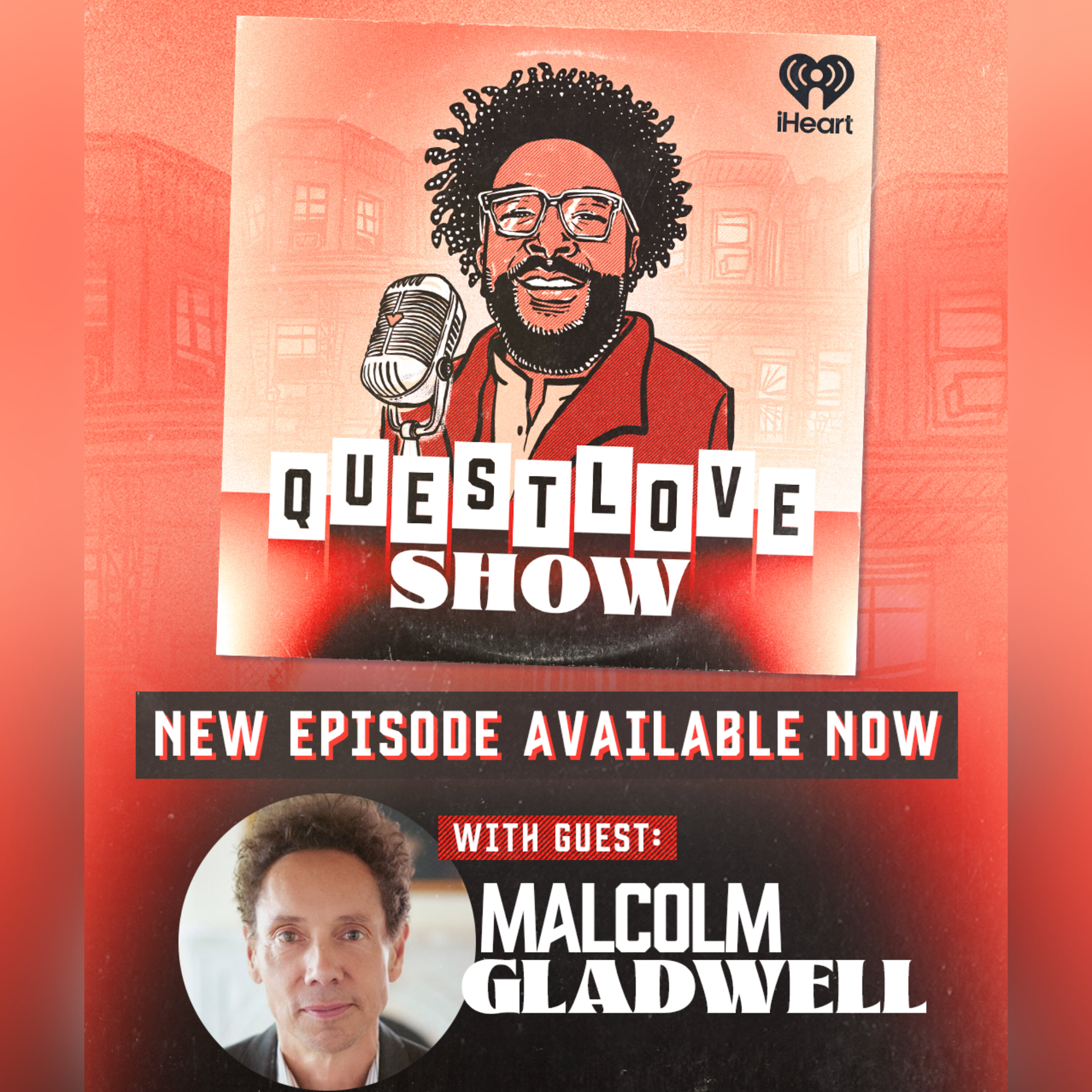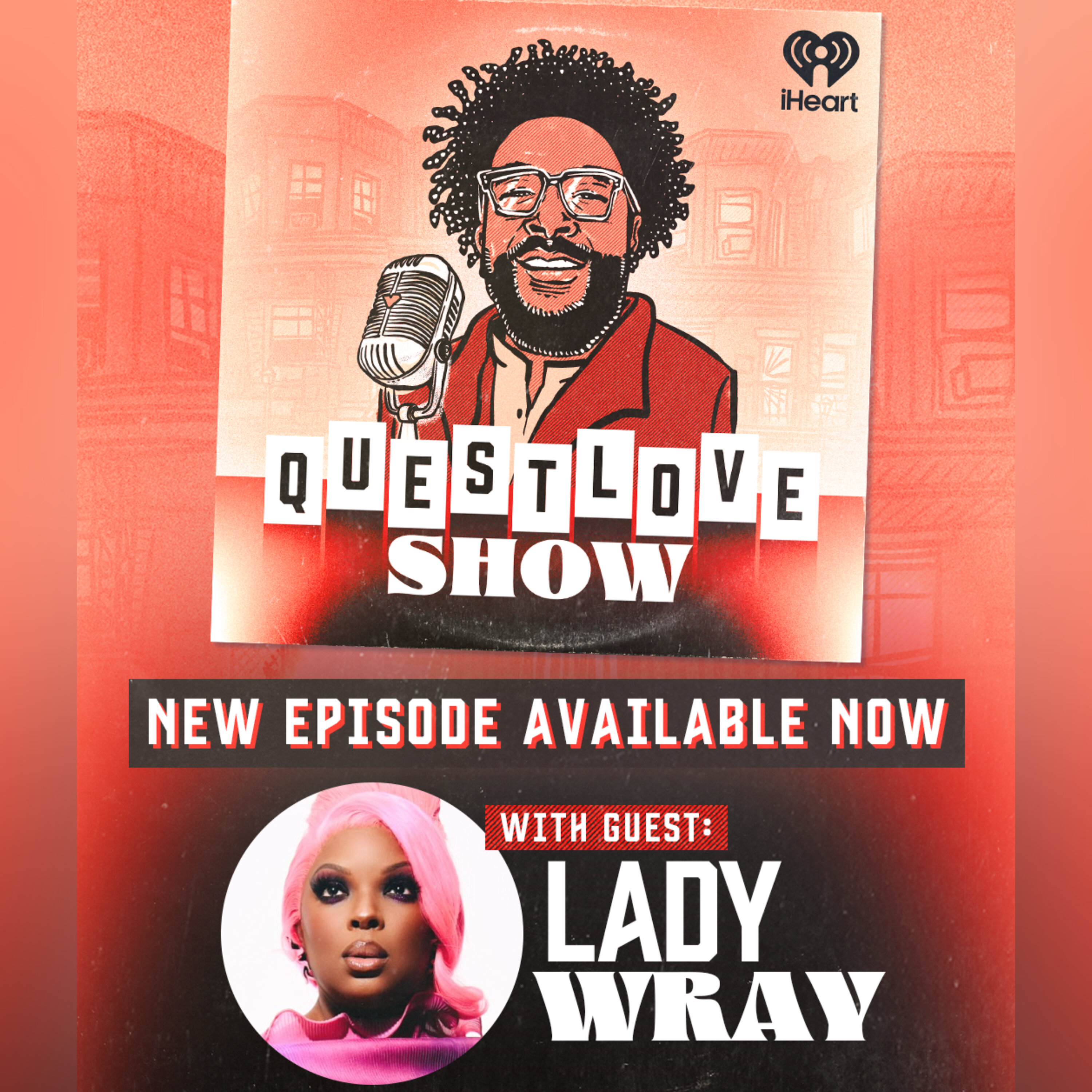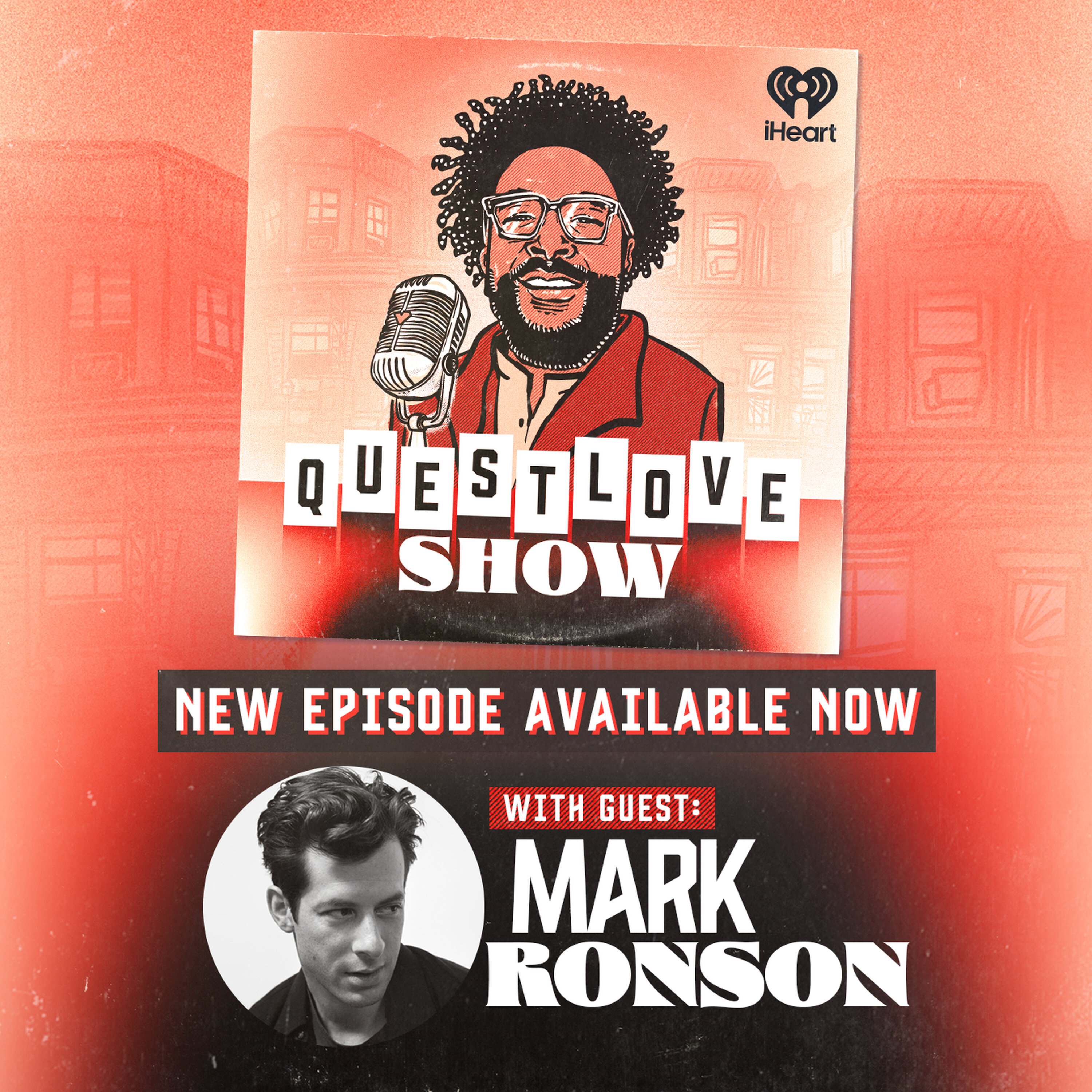Bilal
Bilal sits down with Questlove Supreme and shares his story. The Philadelphia native's complex upbringing and schooling explains why he is a true original, from Jazz scatting to his raw Soul vocals. The guest who recent released Adjust Brightness recalls working with Dr. Dre, Beyoncé, and Kendrick Lamar, while discussing his unreleased sophomore album, his second life as an independent artist, and refusal to be contained or predictable. This a long-awaited conversation that happened at just the right time.
00:00:00
Speaker 1: Quest Love Supreme is a production of iHeartRadio.
00:00:09
Speaker 2: Ladies and gentlemen, Welcome to another episode of Quest Love Supreme.
00:00:13
Speaker 1: I'm your host Questlove with Me.
00:00:15
Speaker 2: Today is the Team Supreme family, featuring our newly minted gottam Off rate Sugar Steve.
00:00:25
Speaker 3: I'm the New York.
00:00:29
Speaker 1: How was the Steve man?
00:00:31
Speaker 3: You know, it was really a good joke, Like I mean, it was supposed to get a joke.
00:00:35
Speaker 4: Me just campaigned to try to get on the float, and then you got me on the float, and then it was a matter of like sort of figuring out what the hell was going on that day. It was boring rain, and it just ended up, long story short, just ended up being so much more enjoyable and so much more heartwarming than I thought my heart could get. You know, like, I'm so jaded at this point, and you know, being from New York, you never think you can see.
00:01:01
Speaker 1: Uh, you're supposed to be jading new right, you know.
00:01:04
Speaker 3: Just yeah, and I'm there. I was, And I was just just waving at kids and just taking it all in.
00:01:10
Speaker 4: Seeing the city from that perspective, it was just it was kind of magic.
00:01:13
Speaker 1: Yeah.
00:01:14
Speaker 2: I have to say that if you're a generation person raised on like faris Muler's day off.
00:01:21
Speaker 1: I highly recommend getting in a parade by hook or crook.
00:01:25
Speaker 4: Yeah, now, I'm just looking around for people with parades, you know, So if you know.
00:01:31
Speaker 2: You're available for parades, good birthday boy Bill Houses, sir, how are you great?
00:01:37
Speaker 1: I'm so jada.
00:01:37
Speaker 5: I don't even go to the parade anymore. How about that? That's like next level jadedness.
00:01:42
Speaker 1: Anyway, you once got me on a parade float.
00:01:44
Speaker 5: Honestly, my favorite part about the parade every year is seeing you guys, because you always are the float that's right next to the same street float, and so there's always like something, there's always something happening. But the one year you were on ours, which is like a weird kismittee meeting of all the worlds, which is super cool.
00:01:59
Speaker 2: My favorite part of being on your float was that was Carol Spinney's last time being on a float.
00:02:04
Speaker 1: Carol Spinny, who played Big Bird Spending at the time is like.
00:02:08
Speaker 2: At least eighty eighty eight, right, so still playing Big Bird, and they were concerned that him being inside that hot ass costume would be too much for him to handle at eighty eight years old and so he was like, nah, I'll do it. I'll do it, and then maybe like two hours in he was sort of like, Okay, I need some mayor. And I know that one of the main things that you guys are vigilant about is not letting kids see a lifeless muppet because the second that the characters out of.
00:02:40
Speaker 1: Him, it just looks dead like.
00:02:43
Speaker 2: And so the way that they had to cover this entire bird, this eight foot bird, so that he could unzip himself and get some breath was hilarious because they didn't do it all the way. So it was like people on his on the west side of the float that could clearly see a.
00:03:03
Speaker 1: Slumped over, dead big bird light yep, and there was like one or two kids like but that was the most hilarious thing ever. Dream Crush. How was your vacation, your your Thanksgiving?
00:03:17
Speaker 6: Oh it was good, Yo. I just gotta say, I'm so proud of y'all. Y'all talking about people being off floats like this is a regular person thing, like but on your be on my float, I'm be on your float like it's a moment chill, but like, uh, and to really celebrate all of y'all, that's really dope.
00:03:32
Speaker 7: But Thanksgiving was great, DC, it was great. Now I'm in Cartagena, Colombia doing it.
00:03:39
Speaker 1: You're in Columbia right now.
00:03:42
Speaker 2: Jesus starts like, man, I'm not even going to talk about her house because I was like, that's the room I've never seen before.
00:03:49
Speaker 8: Yeah, yeah, yeah, yeah, y'all got to get into this.
00:03:51
Speaker 7: I'm like, Colombia is a beautiful place.
00:03:53
Speaker 2: So, ladies and gentlemen, I would like to say, our guest needs no introduction. Yes, but I also write, I also realize that whenever you have such a unique talent, oftentimes that particular being might be the favorite of your favorite singer. This might be one of the rare situations in which our guest today might be the favorite singer of your favorite singer's favorite singer.
00:04:28
Speaker 3: Like your favorite singer's mama likes this guy too.
00:04:32
Speaker 1: Yes, you.
00:04:35
Speaker 2: Know, I'm working on less hyperbole, but having been a witnessed to our guest today some twenty five twenty six years ago in my living room, like I've never had someone literally like you remember the moment and back to the future. When Marty McFly starts doing a modern guitar solo nineteen fifties, and you know, the entire band stops playing Johnny be Good and they're like, oh, I've never had a musician literally stopped me in my tracks. I remember we were playing in my living room and I think Anthony Tidd was next to me, and I was just like, yo, who. The only time I ever said like yo, who the fuck is that? Is usually like some girl that blows my mind. I've never had an artist just make me like what the hell is this?
00:05:35
Speaker 1: And more than that, how can I be down?
00:05:39
Speaker 2: And I'd stay consistent in saying that I absolutely squander no time to collaborate or work with this artist simply because like it gives me the best seat in the house sometimes just to really display a level of performance that you rarely, rarely truly get to see. Where we are and this sort of well rehearsed, well curated, instagram filtered, perfected kind of creative cycle.
00:06:12
Speaker 1: That we're in in which you know, you're not.
00:06:14
Speaker 2: Allowed to see any of the flaws or the bendit notes or whatever, and we're here to celebrate, of course, is his latest album of Just Brightness Really is the entire history, Ladies and Gentlemen, one of my favorite. It's almost a disservice to call him a performance artist because I can't say a singer.
00:06:33
Speaker 1: I can't say an artist.
00:06:35
Speaker 9: I can't even say people are beings like exotic answer, Maybe may we all truly channel in our creative energy. I have not even channeled in half the created energy that our guest today has displayed. Please welcome beloud, thank you very much.
00:07:02
Speaker 6: Can we say our favorite sick?
00:07:03
Speaker 7: Because our favorite?
00:07:05
Speaker 1: Yes?
00:07:05
Speaker 2: I felt bad making this personal introduction like it was just about me. Yes, but this far beyond giving you your flowers. My voice has been shot for the last like nine days. I assume that, yes, when you sing it's zero to one thousand on the autobond. As far as dynamics and wherever you think your voice should go at that particular moment, do you have a ritual to take care of your voice? Like how do you prevent what you're hearing right now?
00:07:35
Speaker 8: Me talking like I don't usually get horse like that, but I've got different concoctions that I make to stop it, like different teas like when I'm on the road, I got it, teet it I make every time because it's like I can be good all the way up until like maybe if I'm on the road for like a ball the last I start, it's not that I'm getting a horse, but I get like that.
00:08:04
Speaker 10: Uh.
00:08:05
Speaker 8: I can't sing soft no more, and I like to sing soft, so it's like I can't do nothing soft. I'm just straight power. But I boil Ginger, Limon and Kanye and Pepper got it, got it? Yeah? And the honey Yeah for sure. When I'm mad horse, I put.
00:08:28
Speaker 1: Garlic in there and it works.
00:08:31
Speaker 8: Sometimes it works every time, like brand new voice.
00:08:37
Speaker 1: Damn.
00:08:38
Speaker 8: That's like if I'm horse and I don't have no voice. But if I'm like good, I still got my voice. Just the Kanye, Pepper, Ginger Lemon thing, got it end up, just make it perfect. But if I sound like you, I put like a big ass piece of garlic in there, but a little bit of garlic in there.
00:08:58
Speaker 2: Everyone tells me garlic were regular, but I'm so anti bad breath I'd suffer.
00:09:06
Speaker 8: No. No. But it's it's like a tea, so it's not like you're eating it, so it's like you had something, some super something.
00:09:16
Speaker 1: It's always the next day, man, I wake up with the dragon.
00:09:20
Speaker 8: So I'll never eat go out like in my life.
00:09:26
Speaker 1: I'm that serious.
00:09:27
Speaker 2: So like the next day, the dragon just.
00:09:33
Speaker 8: Completely I completely understand. I mean I grew up with the name beloud when they had the movie A House Pardon right, and Martin was Stank breath Aloud. So like my whole fifth grade to eighth grade, I was spank breath Aloud and I was the singer. So like every time I sang, the whole auditorium was like, oh, I'll just smell it. It was just a movie. It like ruined my life till high school.
00:10:08
Speaker 1: All right.
00:10:08
Speaker 2: So for the benefit of audience members that don't know anything about your history, I'm gonna ask you some basic questions. Could you please tell us the glorious city? But you first came to this earth Philadelphia?
00:10:24
Speaker 8: Of course, yeah, German can't.
00:10:27
Speaker 1: I can't do the siren noise? Thank you. What was your first musical memory?
00:10:38
Speaker 8: First musical memory is probably in my pops house acting out Thriller, but shortly after that, like that's just me acting out music by myself. The Sterly used to always kind of scare me a little bit, but the video video scared ship, but also the album itself, who haha, all of that kind of Ship used to scare me. My pops used to play it. It kind of scooped me out.
00:11:12
Speaker 1: I was wondering what effect did that song have on.
00:11:17
Speaker 2: Kids, Like at a young age when my dad used to always play Curtis Mayfield's if There's Hell below, We're all going to go Oh Yeah, which is essentially just a bunch of psychedelic echoes and yelling like we're in hell. But to this day it scares me, you know what I mean? Like I always wondered if Thriller truly scared people to that level where they just don't want to because also Michael Jackson makes it appear like fun, like hey, zombies are fun, but you know.
00:11:48
Speaker 8: No, that's scared. That's all scared me. Before the video came up, I was that whole talking part in the intro Scared needed to scare me, and my brother skid the hell out of it. That's like my first musical, like early music memory. But then I've been singing shortly after that, like on church choir, Like I've been singing on church choir since a really long like little kid, like maybe four years old.
00:12:21
Speaker 7: So when did they hear it in you? When did everybody else go? Wait minute? What's that your family?
00:12:26
Speaker 8: Every I think I got like the lead vocal. Like the day I joined the choir, I went to a church where everybody in my family had to be on fire, Like the whole church was my family anyway, Like, uh, what church is this? There was a second Baptist Church of Franklin and it was just a little church. And I would say, on the other side of Brow Street toward nearing you go, keep going down. But literally, everybody in the church is my family. My grandmam had thirteen kids, so I got a big ass family. And everybody in the church around that time, like the eighties, you know, everybody went to church around there had to go to church. Yeah, like everybody had to go to church or passed through there. Like the only person that didn't go to the church was my.
00:13:22
Speaker 2: Uncle, and he was always.
00:13:26
Speaker 8: Like he was like the black Panther. He was Nation of Islam. I mean really nobody messed with him on that. But yeah, I was on a Sunbeam choir since four years old.
00:13:40
Speaker 6: So if everybody could sing, then the family wasn't easily impressed by your voice.
00:13:44
Speaker 8: Then everybody was like no, everybody couldn't say okay. It was just on the choir. You had to be on the choir even if you.
00:13:50
Speaker 2: Suck, just so that adults would know where you were twenty four to seven or h Okay. So you mentioned Thriller, which, incidentally, by the way, as of this recording, today is the forty first anniversary of Thriller debuting on MTV, and also today's the forty second anniversary of Thriller the album. Well technically some say November thirtieth, some state December first, but yeah, we're Thriller's almost fifty, a full grown adult with some kids.
00:14:25
Speaker 8: Wow.
00:14:27
Speaker 1: But the thing that you mentioned now.
00:14:29
Speaker 2: My church experience, especially in nineteen eighty three, that was the period where kind of two years after Ronald Reagan's kind of very conservative America agenda.
00:14:44
Speaker 1: Was really settling in.
00:14:48
Speaker 2: You know, a lot of the hedonistic seventies adults were air quote atoning for their sins by becoming born against Christians. So I once went to a church in which, like he had copies of Thriller in nineteen ninety nine and saying this demonic music you're letting your kids listen to, and da.
00:15:08
Speaker 1: Da da da da.
00:15:09
Speaker 2: So you grew up in a church heavy household and which secular music was allowed.
00:15:16
Speaker 8: Well, my pops was Muslim, so when I went to visit my pops, I was just listening to but mom around my mom, she listened to everything. Even though we was going to church. I wouldn't say my mom was like even to this day, even though she's like Christian, she was, she was never like super heavy in the church like that. She got into the church heavy because you know, I started to sing on everybody until at a certain point I was just in the church sing in Philly. So my mom was like she became Joe Jackson after that.
00:15:58
Speaker 1: So siblings, I got.
00:16:03
Speaker 2: You're for Philadelphia, so I know some are one of the books and off the books.
00:16:06
Speaker 8: So yeah, like from my mother, there's my older brother and my my younger sister. But my costs. I got a few brothers and sisters all right.
00:16:18
Speaker 2: But in general, and I guess you could even count your cousins as whatever. I had cousins that were just as close to me and siblings.
00:16:28
Speaker 1: Was it pretty clear cut that.
00:16:33
Speaker 2: You had a gift that was beyond what the other kids of your ilk or age.
00:16:40
Speaker 1: Had mm hmm.
00:16:42
Speaker 8: Yeah. From early on, like as soon as I started to get in and on acchore by by the time I was ten, I was directed acquire yes.
00:16:57
Speaker 2: Me, Like, how did you discover you had this voice? Were you just always crying with someone notating a note to you?
00:17:06
Speaker 8: He's like, I don't know. I just it became apparent in church that I could, like, I guess I could really sing or like do leaves and stuff when I was good. But before, man, I don't know, I was just always the weird one. My little sister is a musician, and my brother he's he does he's just I would say, gifted, But I don't know. I was always called like the weird cousin. I guess he's out. I always had that.
00:17:47
Speaker 2: It's the thing often, especially in the seventies and eighties, at least my observation and my personal experience. Usually you know, if you display a gift, you're automatically ostracized, and depending on your kind of your capacity to withstand attention, it's sort of up in the air of how it develops. Like for me, I would pretty much say, like, up until the age of seven, I was a well rounded artistic person. Like first of all, like before they taught me to play drums, I had to learn to tap dance and like all this other stuff. But when it came to singing, yeah, I could tap my ass off, like I was like, wow, us too, yeah killing oh tap dancing really okay? Right, But the thing was is that I could sing. But then just because I got relentlessly ostracized for artistic ability, I tried to squash it.
00:19:01
Speaker 1: Or as we say today, like you dim your light.
00:19:05
Speaker 2: So the one thing that I sacrificed on the altar was my singing voice, which I believe that I could have been. Probably singing would have been my north star, but I was like, okay, I got drums well, but I think by eight I psychologically killed my voice.
00:19:27
Speaker 1: I'm I can hold a tune.
00:19:28
Speaker 2: But being the oddball cousin of the black Sheep, how did you handle it?
00:19:34
Speaker 1: Or were you just like breakout in song? And I don't give a fuck. I could sing.
00:19:39
Speaker 8: It was my cousins who everybody kind of didd like my brothers. The thing was to be able to dance real good, and I couldn't dance. I sucked. I could never like really dance well. So my brothers were the superstars because they can fucking dance. All the dance is the running Man the Wop, like they would go to the parties and kill it, and I would always like clam up. So it's like the only time people even knew how I could do anything was when we was in church, like that's when I was shying. But when we would go out and we was just kids, like it never it never really stood out. I could never really get it out or if somebody would be like, hey, you sing for me, I couldn't like do it like if it's just us like as kids, you know.
00:20:30
Speaker 11: Even when like a song would come on, I had aunts that would just be like, oh, hey, boy, dance you know what I mean? Should I would even clean up in front of them, you know.
00:20:42
Speaker 8: But my brothers would push it aside and do all the moves they could sing, do all the Michael Jackson shit. I was always shy. I don't know I could. It could only come out when it was like a real audience, and then I was just like I felt like I was pretending or like escaping even though I was doing it.
00:21:02
Speaker 2: What is your go to song that you would sing? If adults made you, hey, sing something bloud?
00:21:07
Speaker 8: Like it would be like some Michael Jackson shit, you know.
00:21:13
Speaker 1: From four to seven or eight? Who were your north stars.
00:21:19
Speaker 8: Four to seven? I think I'm By then, I was just listening to pop music shit, Like I was just watching MGV and whatever was on TV. You know, I didn't really have like a I would say, Michael Jackson and Prince you know, okay, or like whatever. I wasn't really I wouldn't say I was like so into music until like it really didn't hit me until I would say, like around seven. But by then I was like deep into church, like singing on white Like by the time I got to ten years old, I think that's fifth grade, right, yeah. Yeah. By the time I went to fifth grade, I had started to go to a Catholic school, and so I was just that was it. I went to Saint Malek's right over there by break Brighthole Baptist Church, and I had this lady come into my like mother Brown and Mother Brown. She was the one that was like this motherfucker can say, like, you know, do.
00:22:32
Speaker 6: You remember what you preach them?
00:22:33
Speaker 8: Oh? My god, come on, please obey your parents. No, I don't know. I was just trying to work it all up to the park where you get the bluesy part, the Ogan gotta joined in.
00:22:53
Speaker 2: If social media was out, then you would have been like one of these kids that I would have been liking. Hell yeah, is there any documentation of you pretend like on taple or yo?
00:23:09
Speaker 1: Yeah.
00:23:10
Speaker 8: I was just at a concert the other day. I played at the Kimbel Center with Lauren Evans. A big man and a lady came backstage was like, yo, I got a video tape, but you I think you like nine years old? Look oh younger singing that so church you was like, sound just like you do now. I was like, I need to fucking get that tape. It's like it's so hilarious.
00:23:38
Speaker 1: Yeah.
00:23:40
Speaker 2: So the way that I think I first heard of you, there was a girl that I was seeing and she might have graduated KAPA before your time, and maybe her younger sister went there, whatever the case was, this is about the point when I had your demo and I was playing it in her car and never wanted to like people love their opportunity to dunk on me, like if I don't know something about music, and her dunk was like I know that. And the next week she brought in a cassette of you singing back when you were like ten years old or whatever. And the thing was that there wasn't a difference in I was like, there's no way you're telling me this person's ten and eleven years old, Like he sounds like a fully formed range, like I hear three to four octaves already. And she was like, yes, he goes to my church. I wish I remembered her name, but you like, poor girl, I wish I remember her name.
00:24:53
Speaker 1: Yeah? For you? Was there any other option?
00:24:56
Speaker 2: Did you have any other desire to do something in life besides singing?
00:25:02
Speaker 8: Yeah, I wanted to be an architect. I liked to draw cars as long as a little kid, So I wanted to be some type of life building. But it was always on the creative side. But yeah, I wanted to make cars.
00:25:20
Speaker 1: So bloud.
00:25:21
Speaker 2: What was the first creative project that you worked on the outside of the church, Like.
00:25:29
Speaker 8: As far as like the recording or just.
00:25:32
Speaker 2: Well, yeah, I mean as far as recordings concerned, or like just outside of church.
00:25:37
Speaker 8: I broke out at church, like I started breaking out of church. And not to mention, my pops always hated the fact.
00:25:47
Speaker 6: That I was about to say, when did your daddy be like this is enough?
00:25:50
Speaker 8: Dad always hated the fact that I was going to church. Now my dad's best friend is mister Ben buying them from down had the hole Zanza bar I've been grew up in there and yeah when when when Willhelmina's used to be Zanza bar blue. I grew up in that one when it was like two different floors and ship. But my dad used to take me there. She's just kind of getting me out of the whole going to church ship because he just always felt like that was just not the thing, right, you know. So he wanted me to see jazz. He was like, this is music. That ship's just hollered and hollered. But then he would wind up saying calling some of the up cats at the zeb holler he hat holler. To this day, my papa has never been in not one of my consints, Like, I don't think he ever never like.
00:26:59
Speaker 1: Your dad what you do.
00:27:01
Speaker 8: He knows what I do, but he ain't never heard of shit. I ain't never seen him at a concert ever.
00:27:06
Speaker 1: Are you fine with it?
00:27:08
Speaker 8: My pap say, is an eccentric guy like me, So whatever he does, I'm just like I remember one time my Papa was so pissed at me singing in church. He act literally came into church and like I was singing and took the mic and picked me up like and my mom was.
00:27:29
Speaker 1: Like no, Melvine, no.
00:27:32
Speaker 12: And my papa was like, my son ain't gonna be gay. My son ain't gonna be gay. I'm like, ah, it was embarrassing.
00:27:43
Speaker 8: Man. I think the keyboard player from Philly Meetzsche was the playing. It was like one of those workshop type things where you gotta pay to be in it.
00:27:54
Speaker 13: And my mom so high school, my papa was very happy that I had met He's cats, and so I went to Philadelphia Cup Club high school.
00:28:06
Speaker 8: Because all of my friends went to clup Club, Jill jillil Shaw, George Burton, the Lowie Brothers. They all told me if I wanted to hang with them, I needed to learn jazz theory and I need to learn chords and play piano because they didn't want to hear me sing. I went to the clup Club to learn piano and chords.
00:28:34
Speaker 2: And ship and at the time was the instructor was love Hans, Yeah, yeah, love it Hans.
00:28:42
Speaker 1: Okay. He was my instructor too.
00:28:44
Speaker 2: It's where you said that because we as people have a hard time expressing emotions, that there's such a vulnerability in singing, that there's a certain level of generally on people that I feel like singing is such a soft.
00:29:07
Speaker 1: Experience.
00:29:08
Speaker 2: But yet we love Eddie Kendricks, we love Smoky Robinson, we love Printing. Maybe I kind of sense that too, like because I definitely know that there was a period between like seventy four and eighty four where like if you sang, then you were just ridiculed, like you know, like you couldn't have a beautiful voice and surviving the hood like you soft because you you sing beautiful, which that wasn't how.
00:29:44
Speaker 6: It was in our parents' time. In our parents' time, he was singing. So something happened at disconnect.
00:29:51
Speaker 8: That's the hardest singers, was joonas that.
00:29:56
Speaker 2: In school, were you trying to start like groups with people or were you just like.
00:30:02
Speaker 8: Oh yeah, yeah, yeah. I went through phases. Like my freshman year I was in a singing group. It was a gospel group with the singers. I was like hardcour in the vocal department everybody because this is the same shit she was saying, that's breaking out singing and up you know in the hallway and ship and I was in the gospel group. And I switched sophomore year and I started trying to be in a jazz group. So I started going to jam sessions. I got my first gig as a vocalist Orren Evans band, the Blue Note or the Blue Moon. There was this club called the Blue Moon in Philly, and he used to do gigs. He had just graduated, but we he would hire, you know, he was still cats that was still in high school. So I played in his and like I did like one or two gigs then, and I shortly after that started trying to like make my own dad, but it was like a jazz trio. Like I from there, I got that jazz bug. Like I didn't even want to sing noll the style of music until like maybe I got signed. Like I was hard for it. Wanted to be the next Bobby McFerrin or some ship.
00:31:33
Speaker 6: You got sign not singing no R and b copic No.
00:31:37
Speaker 8: When I first met in teammate, I was in a singing group because it was I was in the singing group in high school. My cousin dated dollmu uh in Two Men's Son, and she would always talk about me to him and at the time, they was doing that show.
00:32:01
Speaker 1: New York Undercover, New.
00:32:03
Speaker 8: York Undercover and Natalie Yeah, and they would do the music stuff. So they got out that Tunes was looking for a group. So I put a group together just to go up there. And Tunes didn't like the cats, but he liked my voice. So that was like the second time I put a group together. And I think I put another group together to try and win a competition, but it was like a jazz man.
00:32:34
Speaker 2: I gotta get to the moment where I discover you and I forget Amir.
00:32:39
Speaker 6: You say human saxophone. That was a part of the story. I remember you told me that that wasn't a part of the story too, the human Saxophone game.
00:32:46
Speaker 1: No, Like I believe James the enemy a cassette.
00:32:53
Speaker 2: And for him, besides the fact that he knew Bloo's voice was going to blow my mind, there was one thing that was slightly more mind blowing about this cassette I was listening to, and Bloo's voice was the second thing that was mind blowing.
00:33:19
Speaker 1: The first thing he said to me was like, dude, the motherfucker.
00:33:23
Speaker 2: From the Spin Doctors co produced this, and he put it on and I was like, wait a minute, you trying to tell me the band of the Stupid Just go ahead, now that's been Doctors. And he's like, yeah, that's been Doctors. It was almost like it was a party trick. I was like, Yo, listen to this demo. Guess who produced this? And they just run out of shit, and you know, they would think of like, oh, it's some d'angelo's working on this new group and did it. And I was like, yo, let'spend doctors produced this. And then it was like, well, who's that singer? So next to some village is fantastic demo? Blaud was in second place, where like the demo, I would just make people listen to twenty four to seven and then like, guess who produced this? And then it went to like hey, make me a copy, make a copy, make me a copy. So can you tell the story of how that demo came to be and how that just started making the rounds.
00:34:34
Speaker 8: I met Aaron at the News School.
00:34:38
Speaker 1: Okay, he played Aaron Cornets, right, Yeah, yeah, he.
00:34:46
Speaker 8: Was going to the News School because he he had came back to like he wanted to get his jazz chops better and he wanted to get this. He always wanted to go back to school to get you know, hire, learn or whatever. He got hired by the guy that started our school. His name is slipping in my mind. I don't know why, but he started the New Street. He passed away recently, but he would get students to play a gig. He probably not hear no more about the Side Start Walk Cafe or some shit like that. But our gig started at two o'clock in the morning and we would play from two to five. This was back when Club jazz Buck stayed open like ever you know. Yeah, the only cats I would see at these ships was like ironically.
00:35:41
Speaker 14: Enough, was like Rod Hargrove Ward Hargrow Never he would go to every game, that always playing right. But he hired me while Aaron Wholeness and I forget he was playing bis. But we we could never stay up to get to the gig, so we would either go to a bunch of other clubs until it was time for us to play, or we would.
00:36:09
Speaker 1: And this is coming from Philadelphia or like your.
00:36:12
Speaker 8: School student at the New School. So I lived in Brooklyn and everybody else stayed at the dorm, So I didn't like to go all the way to Brooklyn, so I would just I wounded up staying at the dorm at Robs Dorm because I think the dude that he shared the room with was on some type of MTV show MT Road Rules or some shit like that. He had got accepted to do that, so he was never a school he was a superstar. We would just hang at rob Spot, and we found out that Aaron had a full blown studio at his house in the basement, and we started hanging out there till it was time to go do that gig. And when I found out that he had that shit in there, I used to go to the practice rooms at school and just write blute ideas to try and record at his studio. And that's where that demo came from.
00:37:14
Speaker 2: As far as I know, I believe that When Will You Call and Queen of Sanity? Who are those actual demos? I know that James and I replayed the drums and the keyboards for Queen of Sanity, but that vocal take is from that actual demo.
00:37:32
Speaker 8: Correct yep.
00:37:35
Speaker 2: So here's the thing, Like, instantly when I hear that first verse, like you kind of displayed a nuanced range of singing that especially during that time period, a lot of R and B singing was sort of post Stevie Wonder, Like Stevie Wonder begats Charlie Wilson who begats Aaron Hall, who begats R Kelly who begats Casey and Jojo like this level of humm oh type of hoos Stevie, I call him like R and B tho of which you really didn't approach that And not since Prince have I heard a primitive screamer on a record like do it in a way that wasn't like HR from Bad Brains or like punk rock related.
00:38:37
Speaker 1: So is anyone M two may or whoever is an authority?
00:38:42
Speaker 2: Is anyone like telling you, like, hey, tone it down a little bit, Like why don't you just sing nuanced and discipline and leave all that crazy stuff because that's not going to get you a hit? Like what are people telling you during this phase before you figure out who you really are, before your first album comes out?
00:39:01
Speaker 8: I was always told the dumb it down, even as a little kid, So I just was just like, I never really knew how to dumb ship down. But I think around this phase it was just they were trying a lot of things. It was mostly getting me to learn songwriting with other people, and then it was me trying to always fit what I was learning at school into a modern thing, you know, because I always wanted to get signed a blue note or something for single jazz because it became a discussion it's mad old people in the audience like we ain't gonna never get chicks or jets, like it sucks, you know. And literally we used to go to y'all's jam session that y'all used to deal with at the Wetlands come Back and we would see cats like Kreene Griggins there, like see, now that's the jazz we see. We always considered what y'all was doing as jazz, so we'd be like, that's the ship, Like we need to do some ship more in that kind of fucking thing, but add our core changes and ship because we're just gonna be dating old chicks.
00:40:25
Speaker 15: For the rest of our lives, like we gotta be modern, like we gotta go to Herbie jing.
00:40:29
Speaker 8: Cock route like you know what I mean? So right, Okay, that kind of like shifted everything to where I was like, we got Aaron studio less experiment.
00:40:46
Speaker 2: What's the path that leads to your actual record deal, Like how many labels did you see? How many showcases did you have to do? How many close with no cigars?
00:40:59
Speaker 8: I need to get signed to Peter R. Massenbird because I always felt like I didn't think we was doing neo soul, but I was like, that feels like we want to do. And I always felt like that would be a way to kind of infuse other our jazz shit, you.
00:41:22
Speaker 7: Know, modernized it a little bit, but keep it it hard.
00:41:27
Speaker 8: Right right right, like we could fit it in. And then we would start to notice like samples and be like, Yo, that's the actual they sampled the actual album that we love, Like that's the actual jazz I know that song, you know. So I always saw what y'all was doing as like the gateway into like still being a jazz musician in the vein of that, but being more modern and kind of really like growing. And then once I met y'all, I was like, I can and ease things more and kind of take it to a different level to where I don't even think of myself as a jazz musician anymore. It's just music, you know what I mean. But it was a whole catalyst from going in them jam sessions at will of meanings all right?
00:42:17
Speaker 1: When I DJ, I don't look at the audience and I.
00:42:21
Speaker 2: Think that you know, it's like a there's somewhat of a fear because I know that I'm doing something different and my whole thing is like, you know, force you to my will, to my side of the street. I'm not gonna play what's on radio, but I'm gonna trick you into dancing to music that you might not know, but I'm gonna make it sound good and artistic. Are you channeled into the energy of the audience, because for me, it's one thing to see a Blouse show when I'm drumming with you, but it's a whole nother. I feel like the very first time I saw a Blouse show in terms of to see how he does in the world, it was a teachable lesson.
00:43:06
Speaker 1: So do you remember the run that you did?
00:43:09
Speaker 2: You and music Soul Child did a series of shows together, like in two thousand, slightly before your album came out. He was pretty much established by then, and for me, I was there and I was really excited to see how would a quasi mainstream audience take to you. I can say this in sehindsight twenty five years later, like, much to my chagrin, they were frozen and it was so jarring to them that, like, you know, I was trying to figure out, like, well, wait, how come they didn't get the elation magic I felt when I first heard his voice. And then I started like, ah, man, people are just dumb. They don't know what real art is and d D they just want the hits. Like I was in a mind state of really not understanding subculture mainstream and you can't do what I did for at least the first ten years and really have a knowledge of the science of it all.
00:44:14
Speaker 6: I remember those shows on the flip side was too from an artist respective, it seemed like and I don't know how to say this politically correctly, so I'm just saying what it felt like. It felt like music was a little intimidated.
00:44:26
Speaker 1: I knew he respected it, but it was for me.
00:44:30
Speaker 2: I was more mad that the audience didn't instantaneously have the same reaction I did, and it made me doubt myself, like it was a shock.
00:44:39
Speaker 6: But still not like it was bad. It was just like whoa, whoa with.
00:44:45
Speaker 2: You though, And I seen like four of those shows in a row like during that month, either we were like on the same circuit or you just did a lot of shows in LA and each show you would get even more intense, or like you didn't shie away from it, whereas like I would have instantly chicken shit it and brought it down like Okay, they don't feel this, let me let me sneak.
00:45:10
Speaker 1: This on you.
00:45:12
Speaker 2: And your reaction was the exact opposite, like, oh really, now I'm really show y'all motherfuckers was up And so how aware are you or can I ask sort of in hindsight, did you have a conscious fear of rejection and your main reaction is, well, let me triple down on this ship and show y'all mother because you know I was. I was Michael Jackson Popcorn Jiff all day. Like the crazy you are, the more I love it, Like, oh my god, he's book, he's this, this is.
00:45:48
Speaker 1: The greatest shit ever. What was in your head at that time period.
00:45:53
Speaker 8: I came from just street, just being an artist, and I thought, if I don't get in the applau, as long as I get a shot, it's it don't matter, you.
00:46:04
Speaker 2: Know, So any reaction is better than new reaction.
00:46:09
Speaker 8: I looked at it like, oh man, they fucked up.
00:46:13
Speaker 1: That's what it was.
00:46:14
Speaker 6: That's exactly what it was.
00:46:16
Speaker 8: I was always like looked at as, oh man, this ship is out. Even when I was in the choir, like I would lose solos because cats would be like, you know, singing the straight way. I've never sang ship the straight way, so I'm used to just doing ship and even at church up to them where people get like what the fuck and even singing jazz, I was scatting more so than even singing. So I always saw that this.
00:46:45
Speaker 6: You've always been a proud weird though, like, and I love that because.
00:46:48
Speaker 8: I always I always looked out the audience and saw this like I was like, ah, they got they get it. I guess I'm misconstrued to effect when I started thinking that was the that was the smile that it was on the other.
00:47:04
Speaker 6: Side, is that insulting to say that you've always been a proud weirdo to me? Like, because I'm a weirdough too in a way, So it's crazy. Yeah, yeah, fuck it, like you want it anyway. They just don't know what they want.
00:47:16
Speaker 8: Yeah, I'm just like I always liked the black sheeps or the cast that was being out Like I remember reading Miles Davis books and him being like, man, I just got to a point I was like, fuck it. I just we're doing the whole show with my ass to the crowd. Fuck this ship, like you know what I mean? So I guess I could get into it. Sometimes I can't get into a place like fuck this ship and going inside and perform.
00:47:43
Speaker 2: You know, is there a memory of a show in which you might have felt you took it too far that you recall and when.
00:47:51
Speaker 1: You sing Jack?
00:47:53
Speaker 8: Oh yeah, shows singing with fucking Jack, Oh my god, that's a jack will go. She's a shop job too. So it was like almost trying to see in my head. I was like, let me see how far she'll go.
00:48:12
Speaker 16: I guess in her mind she's like, let me see how it was like, oh ship, all right?
00:48:18
Speaker 2: So let me ask this question then, So, when you know you are headed to a jam session, are you thinking this is about to be like gladiator wartime? Like it's going to be an arm wrestling match? And who can I outdo?
00:48:45
Speaker 1: Who can I? Son? Can I?
00:48:50
Speaker 2: There was moments where like again Michael Jackson, Popcorn Jeff where it's just like, what's going to happen tonight? Like no, I mean and shout out to all of them, especially I remember coming home from tour, honest to God, and you know, frightened of fatigue in Asia, like.
00:49:11
Speaker 1: Somehow they have to be there.
00:49:14
Speaker 2: They whooped that Toy Story band into shape in the summer of two thousand and one, like you know, and then it was like, oh shit, we gotta come. I remember having a conversation with the Roots, like the last two minutes of their show, we gotta get to that level with shit.
00:49:31
Speaker 1: So I was feeling the pressure.
00:49:33
Speaker 2: But would you often go especially during the period between ninety seven and two thousand and five when black little like these jam sessions are happening, are you thinking in terms of like hmmm, battle or just like it's how you feel at that moment.
00:49:54
Speaker 8: I just know wanted to get up there and make a statement, you know what I'm saying. I knew that, like, oh man, I hope I get up here tonight, Like I had that feeling like this, okay.
00:50:06
Speaker 2: So John Legend back, I mean's John Stevens not knowing he was in the audience at for a majority of these jam sessions we're basically just say that. You know, whenever Bla would come on, then it'd be like, uh huh, I'll do it next week. I'll come back next week. I'll come back next week.
00:50:25
Speaker 1: I'll come back.
00:50:27
Speaker 2: One of my one of my favorite moments of yours is in Dallas where we're doing Erica's birthday and yo, look this is a very this is a very old reference. But if our listeners could pause the podcast and go to YouTube and watch Ralph Carter aka Michael Evans of Good Times Fame sing when You're Young and in Love at a rent party for Helen and Helen on t and every line James Evans is the audience like, that's my boy, that's you know, like that person. Because the way that Prince would often enter our lives, you know, by this point in his thirtieth year, Prince knows the myth of Prince is a thing, and you know, he would just appear out of nowhere, and I knew he was there simply because I know the size of his bodyguard. So even though you're watching silhouettes, there's a point where you know, Prince enters the nightclub and in my head, I'm looking at shames.
00:51:43
Speaker 1: Like, yeah, we about to show him what's up.
00:51:48
Speaker 2: And I'm looking based on where Prince is sitting, I can see the bodyguards wait in a bet and Omar just finishing it, and I think Omar did a little Boys Saturdays and he did a cover of Golden Brown, and then Bloud comes up.
00:52:09
Speaker 1: I knew I wanted to start with Soul Sister first and.
00:52:14
Speaker 2: Then warm him up, and then I knew when Sometimes comes, it's gonna be on. And sure enough we did a very nuanced Soul Sister, and you know, this isn't the back watching. And then when we get to Sometimes Dog, it's like Prince levitated.
00:52:32
Speaker 1: It was in the front row.
00:52:34
Speaker 2: Now I know that game because he did it once to another singer where this other singer was giving a concert in his hometown and there was very strict instructions, like you know, like no distractions, no whatever. Prince, knowing who the fuck he is, decides I'm gonna stand right in the wings and watch you. And sure enough, you know, the singer like looks at the laugh and gets paralyzed and literally freaks out, even though you know, he goes through the song and walks off stage screams at the staff like get rid of him, get rid of him, you know that sort of thing.
00:53:18
Speaker 1: And I could tell, uh, this is a flex thing.
00:53:23
Speaker 2: But again, Bloud never cowers to any He's one of the most fearless performers.
00:53:32
Speaker 8: I know.
00:53:34
Speaker 2: He just he was in the front row without the bodyguards and belowd them back down.
00:53:39
Speaker 1: He just went even crazier. Do you remember that moment at all?
00:53:43
Speaker 8: I do. I don't remember the performance, but I remember coming off the stage and you coming over and sing we got him and you didn't need to let him come up on stage. Man, And I was like, what are you talking about? And he was like France was at the front and you didn't even let him come up on stage. I think he wanted to come up and jam with us, and you just ignored them. Bro. That was awesome, y'all. I felt like shit. I was like I was. That was the one time I was too zoned out.
00:54:18
Speaker 7: I know you made up for I know, y'all, y'all saw each other again.
00:54:23
Speaker 8: It was weird.
00:54:28
Speaker 2: I want you to tell this version of the story, all right, And I apologize listeners.
00:54:33
Speaker 8: I know.
00:54:35
Speaker 1: I feel like there's a group disgusting more than it is.
00:54:37
Speaker 6: Like it was not because Loud did so much stuff after Prince died and stuff and did a lot of performances old to him. So no, this makes this is good? Please I want to know.
00:54:44
Speaker 1: So all right.
00:54:45
Speaker 2: One of my favorite moments, I believe allows in town when the finishing touches on.
00:54:52
Speaker 1: Jimmy was a rock.
00:54:53
Speaker 2: Star and star sixty nine at Electric Lady for Common some Electric Circus album and this back when it was just Mammoth twenty four hours, like you know, and Steve can also attest to this. Like usually vocals, Common would do vocals like Emma Day eleven am.
00:55:11
Speaker 1: Till Yeah to three or something, and then like Al.
00:55:15
Speaker 2: Mousey and James comes in, we'll work on some music and then Colin thumbs up thumbs down it, and we'll create the music at night and then he'll work on the song of the day right to it and all that stuff. So I knew that Blaal was doing his vocals and we decided to take a dinner break. And it's two thousand and two, so kind of the this is the beginning of the nariety of everything catching on, like we're no longer these unknown, obscure underground artists like everyone's going golden platinum, and with that you can invite it to industry events.
00:55:50
Speaker 1: So the first like major.
00:55:54
Speaker 2: Thing that we go to is somewhere like I think the Apollo Theater had a nightclub attached to it, and Kelly Clarkson and what's the old boy's name with a bro Justin.
00:56:09
Speaker 8: Right.
00:56:10
Speaker 2: So it was like the first year of American Idol and those two were kind of doing like a tour.
00:56:15
Speaker 1: I don't know what project they had was justin.
00:56:18
Speaker 7: Loves they had a movie?
00:56:19
Speaker 1: Ye, yeah, like they were.
00:56:22
Speaker 2: There to promote something. And so they invited us to like come up to the Apollo and and we went there for a bit and then it was me Common and Blau Steve, did you roll with us?
00:56:37
Speaker 7: Then?
00:56:38
Speaker 1: I think you were part of this?
00:56:40
Speaker 3: Yeah, hang out at the Apollo all the time.
00:56:41
Speaker 2: I mean, but it was the Apollo was like it was like a club next to it, like Club Apollo.
00:56:47
Speaker 1: But whatever the case was.
00:56:50
Speaker 2: This was also the period in which Prince was indeed deep and its Jehovah's witness phase and and that's the Prince that ID like to avoid because he would do nothing but preach at you for hours. And so someone comes up and says, oh, Prince is on his way there. And that was literally like our check please moment. I never thought I'd run away from my idol the way we did. Like we are like, hey, let's get out here because he's just going to keep us here all night and talk about God.
00:57:29
Speaker 1: So let's go. So we snuck out. We snuck out.
00:57:33
Speaker 2: The bat got back to Electric Lady Studios to start mixing Jimmy was a rock Star and then the phone rings. Brand new receptionist says, Amir, there's someone named Prince asking for Prince. And I was like, what someone from named Prince asking for Prince? And I pick up the phone and he says hello, and I'm like, hello, this is Prince. I said, huh, I'm speaking to Prince. I said, A merely means Prince. So he would always do that game with me, and he's like, how long will you guys be down there? And I'm like trying to think of a lie, but you know, he makes me. We're yeah, but we were mixing the song, so I was like, yeah, we're here all night.
00:58:26
Speaker 1: Meet me. So Prince shows up, did he knock? Yeah, a puffa smoke.
00:58:35
Speaker 2: He shows up at two thirty of the morning and we're mixing Jimmy was a rock Star was a very very intricate song, and we play it for him and his mind is blown, like he gives us all the praise and like, wow, he really likes it. And by the way, Prince is on Star sixty nine. He's playing keyboards all over it. So him in Common like had a really good relationship. Anyway, it's a point where he's like, I want to talk to you guys, and it's like it's a fourth person and it's not Erica and it's not Steve.
00:59:08
Speaker 1: Maybe it was Glassper. It was a fourth person with us.
00:59:13
Speaker 2: But the only way I could describe it is if you google the album cover to the who's the kids?
00:59:19
Speaker 1: All right?
00:59:20
Speaker 2: You know they're all sleeping like on each other's shoulders. It became a religious battle, and all I remember was like blow was basically going toe to toe with Prince.
00:59:34
Speaker 17: Oh Christianity, dude, me Common and whoever.
00:59:42
Speaker 2: The third person is just sitting on the floor, sleep on each other's shoulders.
00:59:47
Speaker 7: Good for you, Good for you?
00:59:49
Speaker 8: Remember that?
00:59:50
Speaker 2: And I just wake up occasionally and bloud prints are just do you remember battling him at all?
00:59:57
Speaker 1: Like just with theology, like it was a two hour conversation.
01:00:00
Speaker 8: Was just he was saying, uh, he had different takes on versus from the Bible, and I think I was just trying to relate to him and I was like, oh you know, oh that's in the Qur'an too, And I was trying to have a conversation with him, but I don't think it was working out. I just remember you going behind. You kept going behind, the been going stop, and I was like, I'm trying to stop. If he had a question, oh yeah, well what about this? And I would just be like, ah.
01:00:41
Speaker 6: That was a long time before he passed, So like y'all kept seeing each other throughout the years. I mean the meror I know y'all, did y'all have a whole relationship, But what about you and Prince? Like how did that that one conversation kind of evolved or did it?
01:00:54
Speaker 16: No, it was just like a he evolved into I think the way I broke out of it was I started asking him about his shoes because he had on dope ass white shoes that the zipper was diamonds, Like, the.
01:01:08
Speaker 8: Zipper was full on dime. It looked like a diamond ring, but it was the zipper was made out of diamonds. So I just started talking to him about that.
01:01:17
Speaker 3: Sounds like a very religious man him.
01:01:22
Speaker 8: His blots. And then then we kind of like skipped skipped everything. Yeah, nothing, what stopped? Did D'Angelo come in or something?
01:01:31
Speaker 7: No?
01:01:32
Speaker 8: No, something happened.
01:01:33
Speaker 2: Well, well no, I said, basically like Russell, because we were mixing Jimmy on forty eight tracks and it was very old school. Of course, now twenty five years later, you can do everything on your computer.
01:01:49
Speaker 1: Things are remembered. But if you're working on.
01:01:51
Speaker 2: Like an old school SSL board, a guy like Steve has to it'll take him like three hours to notate everything that we did on the mix.
01:02:02
Speaker 1: Like you just can't go to the studio and be like they put.
01:02:05
Speaker 2: My song up, like Steve, well have to take you know, an hour to two hours of readjusting.
01:02:15
Speaker 1: It's it's called recalling a mix. Correct correct.
01:02:19
Speaker 3: You're absolutely fantasy.
01:02:21
Speaker 6: Of my whole like thought of Prince being like, oh, but you you the next I can see and.
01:02:28
Speaker 8: He said, well, he said, yo, you're the black Bet. You remind me of Bet.
01:02:34
Speaker 15: And I was like that, don't meet your hair and I was like don't. I was like, Beck, like you gotta. He's like, you gotta little bit. You could go wop if you want to. You could bring that sensibility into your.
01:02:50
Speaker 7: Stay away from her.
01:02:53
Speaker 8: But I was like totally like that. He was like, you know, you remind me.
01:02:57
Speaker 1: And I was like, look, man, begs my boy. I respect that. He calmed down.
01:03:08
Speaker 2: He calmed down like as with most people, and maybe this all happened to me too, like after you do like seven years of your spirituality phase or your religious phase or back into your regular self, so down two thousand and seventy calmed down a lot. But I do remember saying, like, yo, we gotta wrap this mix up. When he left, it was like five thirty in the morning, and you're not really supposed to mix when you're tired.
01:03:40
Speaker 1: So kind of.
01:03:40
Speaker 2: The the radical drawing way that song sounds to me is sort of indicative of the night we had to endure of that two and a half hour preaching that that that's ceremony or whatever. So what were your expectations with Firstborn second one? Why did you name it firstborn second and did you have expectations for it?
01:04:10
Speaker 8: I named it firstborn second that was my second name. I was just trying to do like a weird name. So I think it was called uh hot glass of a cold glass of hell fire jeange Haiti. So I was like, I want something this kind of double line condre or whatever. I don't even think that's what it was. I was just like, I want to be out. He's like, that don't even make sense. So I was I'm my mom's second child, so I was like, this is my first album, second job got He was like, that's weird. But alright, you know, was.
01:04:53
Speaker 1: The title track biographical the closing song.
01:04:57
Speaker 8: No, yeah, it was just a wildhit. There wasn't order biography. It was writing something wild, something strange. I guess he always had like a wid wildness to our ship.
01:05:10
Speaker 1: Right, this is word become professional.
01:05:12
Speaker 2: I'm totally skipping the sometimes story because I don't think I could tell that story better than I told it at the Glasshouse Live the Glasshouse album.
01:05:21
Speaker 6: But you did a good job. You left something out though, because I did hear you tell the story, because I don't want you to skip this sometimes just in the sense of like since we talked, no, no, you didn't skip nothing. In the sense of how it came together. However, y'all did skip on the sense of like how this is the most beloved Blouse song and like it never became a single off that album, and why that was a thing.
01:05:42
Speaker 8: It was almost a single. It was almost as it was like the last shot. They wanted to make it a single for starting on a new album. I think it was yes, met she Stout wanted to do a video and he was like, this is the we needed to do on this, But I think he picked fast, laying but loud.
01:06:06
Speaker 6: I remember being a radio and I was like, this is really because of doctor Dress.
01:06:11
Speaker 2: Stout went on record to say on this podcast that he really regrets kind of how the ball got dropped with you, because you know, he felt that you were that supernova figure that really you know, and I hate that whole could have been of contender talk because you know, for a lot of artists that do get to the mountaintop, we see what happens to them. From my perspective, when when I did this record, I wanted to be a part of the filler cuts because I feel that the mark of a great artist like Stevie Wonder, like Prince. I don't like the singles like Prince Singles, Delirious, Let's go crazy.
01:06:55
Speaker 1: Now I'm gonna listen to Dorothy Parker Like.
01:06:57
Speaker 6: For me, great tradition, Why does singles? I gotta beat that way like I've been I've been screaming this to you for years about these singles, like, I.
01:07:04
Speaker 1: Just don't pick this.
01:07:06
Speaker 8: It was hardcore.
01:07:08
Speaker 2: I feel like the margaret artist is who has the best feller like and to me, a lot of our favorite songs on this record are the outcuts.
01:07:18
Speaker 6: The radio songs were fast laying, soul Sister and love Love It. But we was on Queen of Sanity.
01:07:24
Speaker 7: Sometimes when would you talk.
01:07:26
Speaker 1: Like because you're a different mind state, Like I.
01:07:30
Speaker 6: Was working in urban radio at the time, and I was like, y'all are not listening to the women.
01:07:34
Speaker 7: All the men are making songs.
01:07:36
Speaker 6: I'm making these decisions about.
01:07:37
Speaker 1: The doctor Dre had something to do with it.
01:07:40
Speaker 8: Yeah, I'm saying that was Innerscope Records. Like I that's why I wanted to be signed to UH. Initially I wanted to be signed to Kadar because I wanted the core of the album was songs like this and then the singles. After everything was done, you know, I was happy to work with Drago, you know, so I didn't really have no complaints.
01:08:08
Speaker 1: Doctor was all right. So can you describe that process, like how do.
01:08:13
Speaker 2: You meet doctor Dre, how do you work with him?
01:08:17
Speaker 1: Like what was it like?
01:08:19
Speaker 8: It was polarizing, like through the uh, one minute we just in Jimmy's offices and the next day we were riding up to like this place don't even look like a studio though, and just like some get but it was back and it's like all these dope bass cars. We go in there, and that was the first time I saw that maybe speakers in the studio and it was like six speakers, like.
01:08:44
Speaker 15: Six up like it was like three yet the top three wolfers at the bottom.
01:08:49
Speaker 8: And then he had to I've never seen anybody turn the console all the way up to eleven, and he turned it all the way up playing I think fascinating was the first joint he did. And it was the loudest shit I've ever heard in my life. But its nothing that broke, nothing in the speaker's crackle. It was amazing, but it was painful at the same time. That was when I noticed he was the only one in the studio that didn't have earbudd and everybody that was working there had it like they knew what was up, but I didn't want to tell him to turn it down? Was that doctor Drake? So I'm just has.
01:09:38
Speaker 17: He has to because that was the loudest ship I've heard about life.
01:09:41
Speaker 8: Like it was stadium loud but in a small room.
01:09:46
Speaker 3: Soon we're going to have a hearing age by Drake.
01:09:51
Speaker 2: So I will get murdered if I do not ask this question? Can you tell us where in the hell is the Love for Sale album? This is probably of all Soul Quarium related projects, not related to is this the year that makes a record your fan base? I almost feel like you should never release Love for Sale or whatever, because it's like the legend.
01:10:21
Speaker 1: Of it is more than what it will equal. But what is? What is the story of Love for Sale? Just never coming.
01:10:31
Speaker 18: Out tied up in a bunch of shit with Inner School and Loyo and changed past and go moved past, and that was their label. So that got shifted over to Faulu.
01:10:49
Speaker 8: Who's the brother and for a long time I had I didn't even know where the files were, but I think fa as the files now, so right now, might he might have gotten it. We might have gotten the files from after Move Fast he got his hands on it or something, but I know file has the files.
01:11:14
Speaker 6: Seems I got his fingers on a lot of things because I'm like, man, those two past all that history.
01:11:21
Speaker 8: But the inner scope I think in school boons. But we had the files, we have the mix because everything was mixed.
01:11:31
Speaker 2: Do you have a desire to see you through or release it?
01:11:36
Speaker 8: Or I did at one time, but they're not. Just every time I put my mind into wanting to release it, it just kind of like doesn't work out. I was trying to get it. He had came up to try and release it again. I remember I was talking to Naim from Universal and there he said that there was me an interest, but I'm just on this thing where it happened, and it happens. You know, it was already a lot of people claiming it and having claims to it anyway, so right, I just fucking while. It was so funny because while I was doing the ship, the people that want to hold on to it didn't like it.
01:12:28
Speaker 2: I don't think I've heard it. So I was going to say, what direction was it that made it so jarring? Like people know what they're getting when they get with you, correct.
01:12:36
Speaker 8: I would think, But I mean around the time that I started doing it, I was kind of full on, like that was pile stage. I was. I was heavy and drinking, you know, just I wasn't the easiest to kind of work with. So I think that kind of length itself to what where it happened and whytt Neffer went out, and then towards the end, I just went on strikers showing up.
01:13:07
Speaker 6: To make wait, year is this sean dude?
01:13:13
Speaker 2: Two thousand and three, two thousand and three, I was gonna say, I just doing this last.
01:13:21
Speaker 1: Run of Detroit.
01:13:22
Speaker 2: I did in the summer, to my pleasant surprise, heard like five to six other j Dilla collapsed that I didn't realize that you did, like.
01:13:35
Speaker 8: Because Dyla was going to They had agreed to let me produce half and then let Dyla produce the other half. But then Dyla started getting sick. I was going out there to the Detroit. He was working happy. That's what, Duke. That was my vision for the record, to have Billa like executive produced, but just let me get get my get my ship off with him come in and kind of like dollar because I was like I've led Dyla dollar back because it'll still be a little bit out. And then he had brought James and so I was like, it's in good hands. But then he had started to get sick, so that kind of threw me into a loop, and I started drinking more, just upset and shit and then just arguing with everybody about it and just trying to keep the vision of what I wanted alive, but like not knowing how to finish his tubes, you know, and Dyla has started making some out shit for me to do, Like he did this one track. I just didn't even know how to put it together because it was so out. I was like, he's the only one that could fucking help me, Like what am I gonna do?
01:14:53
Speaker 2: Like yeah, I didn't know whether he programmed it in his NBC and I didn't know where the one was.
01:15:00
Speaker 17: And he would be like, Yo, you can't understand this is right here and you would have to be in the book, like and what And I'm like God, So like when he passed, I was like, that's it.
01:15:17
Speaker 8: I'm lost. Fuck. I hear that beat to this day because randomly, I don't know who played me.
01:15:26
Speaker 2: I found that beat and to this day, I don't know where the one is and I'm the king of be rating someone for not knowing where the one is.
01:15:34
Speaker 1: And yeah, so for.
01:15:37
Speaker 2: You now, And I guess that this could also tie into I love surreal and also air tight and in another life like this period, especially you kind of leaving them two maate organization.
01:15:55
Speaker 1: And whatnot, and like how do you.
01:15:59
Speaker 2: Out did you manage to kind of on your own figure out how to navigate with you kind of at the driver's seat whereas you would have a team in management and.
01:16:12
Speaker 1: People to make decisions for you.
01:16:14
Speaker 2: But as an indie artist, like what were your basic plans like in terms of getting your art out there?
01:16:21
Speaker 8: I didn't really have a plan. I had went just for a long time after that album got bootleg, and I didn't have a plan. It was just hanging out at my girls house, making shit up on the Roger Man, not really knowing what was going on, like sign if I was still signed, if I wasn't, If I wasn't signed, you know, if I was able to kind of get a record deal people that I would. I had fell out of contact with the Jumys, so I didn't know what the hell was going on, and my boy Steve McKee, he was fielding the studio in Philly, so I just I started going there because he knew like whenever we would do shows, I would just be in my hotel roor making beats on my garage fan, right, So he was just like, I got the studio, played me the shit that you've been doing on your garage band, and I played him with shit and that turned into every Tice revenge. But I was just making it up on my computer, just waiting around to know when we could get back in and then you know, to deal all that shit full of parcels. I was kind of like self conscious, but I can go into my head and just entertain myself at any point. So like that's what I just did, you know. And then from doing that, I started hanging out and I became friends with Cyro Creative partners working on their stuff, and My Feet was introduced.
01:18:03
Speaker 10: Me to Andrew Maharo, who works with Adrian Young now. But he just had this small label that he was putting Shot Feat's records out and Shot Feet I was like, man, your ship is bunky, but it's electronic and they're letting you do whatever you want and we just hanging out with Flying Lotus and just that whole crew.
01:18:26
Speaker 8: I was like, y'all remind me of the New York crew, but I'll get in LA and plug research. Cast was like, wet's sign? What you doing? And you know I had this ship that I was, you know, ship I was just working out on at Steve's studio and they dug it, you know. So I was like, I don't know if I'm still signed, I don't know if I put ship out of whatever, but fuck it, let's get sued so we could find out where I'm at.
01:18:58
Speaker 1: So what happened, like business plans.
01:19:02
Speaker 8: Well, nothing happened, you know, nothing happened. So it was like, oh, let's go to keep going.
01:19:12
Speaker 1: So for a lot of people, especially gen Z and Jen Alpha.
01:19:17
Speaker 8: They got the new ones.
01:19:19
Speaker 2: Who Alpha's Jen Alpha? You gotta start back after gen Z, you gotta start.
01:19:22
Speaker 1: To the letter. Hey, yeah, the new ones.
01:19:25
Speaker 2: Your work with Kensick Lamar is kind of their introduction or your your reintroduction. How deep involved were you with the Pimple Butterfly, Like, were you guys as always?
01:19:39
Speaker 1: Was it like a second coming up?
01:19:40
Speaker 2: So aquariums where you're just always on standby or were you there to just specifically work for one song.
01:19:47
Speaker 8: Yeah, I just came to the first I did like a few sessions, but I came.
01:19:53
Speaker 10: In at the last half of the record, like they are already front La Roy had already wrote the chorus.
01:20:01
Speaker 8: For that song these Walls. I just came in to do that, and I kind of recorded it so fast that Keintrick was like, oh, well, throw this up, put this up, put this up. Let me see what you can do. And it kind of just turned into that.
01:20:17
Speaker 2: And was he familiar with you or was it just like ar boys things like how much did he know about it?
01:20:24
Speaker 8: No, he had wanted me to be on the first album, but I don't know what happened. It didn't work out in time. And so we had always said that we wanted because he's cool with the whole sack creative partners, right, So I knew from then and then fly Low and of course Thundercat so and Karis Martin, like those are all my cats. I've known him for years.
01:20:53
Speaker 6: So did they recognize you in a way of like, yo, so I can below And that's because you're older, a couple of years.
01:20:59
Speaker 7: Older than these folks, right, wrong talk about uh Ken drum about to Leroy.
01:21:13
Speaker 8: Ironically, those they thought I was their age. I don't know.
01:21:18
Speaker 2: I see when you're youngest, like even now, like you look the same way you did. Mine's the dreadlocks like this, this is like talking to you back in the day, so.
01:21:30
Speaker 6: And being a weird I'll keep you fresh and open a new thing. So that keeps you young too.
01:21:34
Speaker 8: Yeah, I guess so.
01:21:37
Speaker 2: So now now that you're in a space where like your your level of artistry, and I'm talking about like even the stuff that's happened in Australia right now, like with like uh you know, like Hiatus Coyote and you know, like do you now feel as though the world has caught up to you and you're able to like for you you where is your market at? Like who what marketplace embraces you the most?
01:22:06
Speaker 8: I don't know.
01:22:10
Speaker 2: You're a pure artist, like and I think it's important to every tour.
01:22:16
Speaker 8: Every tour, different audience shows up. It's like we just know.
01:22:21
Speaker 6: That's a blessing.
01:22:24
Speaker 8: We still get the cast that show up that want to hear the the first album, more and more like Cats and one a year the newer stuff and they don't necessarily look like the first album audience per se, you know, so it's kind of a mix. I never know. If I knew, I would be probably further along.
01:22:54
Speaker 2: Kimber told me that, well, the way that radio is in Australia, like the way that your radio show was Laya, that is actually mainstream radio in Australia, which really explains well, yeah, but the thing is is like over in Australia you can still hear Blal and then they'll put on Sabrina Carpenter and then they'll put on Charlie x X and then they'll put on Hiatus kind of right, which is I mean, shit, we're doing our New Year's Christmas shit over there in very big venues because Australia hasn't fallen under the way of like where Clear Channel takes over radio and segregates it and makes you a niche artist for you now though, especially with the Just Brightness project, do you feel like people are slowly now coming around after having you know, been on this journey for twenty five years.
01:23:56
Speaker 8: Yeah, folutely people are has happened where you know, it's the thing that I'm doing is starting to settle. I feel that a little and I've been a little bit of getting a little bit more grounding on the on the business side too. So you know, for a long time, I didn't really give a shit about provisions ship. I just wanted to make enough money to smoke weed and you know they rent. Then you had kids, so a lot of ship changed. I got kids, like you know.
01:24:32
Speaker 1: Right, yeah, you got children.
01:24:35
Speaker 8: My approaches.
01:24:38
Speaker 2: You've done so much work with so many other people. I gotta ask you about like some of our favorites. One of the last complete albums of a hip hop group that I totally love was Hell.
01:24:50
Speaker 1: Hath No Fury?
01:24:51
Speaker 2: And I didn't look on the credits to know that you were singing on nightmares a sergyr voice, Like, wait a minute, how did you hook up with the clips for Hell Have No Fury?
01:25:05
Speaker 8: I was down there working on my record. They wouldn't with the Neptunes. Yeah, I went through this. I went through working with everybody. So it was right after he did the record for Justin Timberley. You know, he was doing it just banger after banger, and so every time I would get into a room with with with cats on that.
01:25:34
Speaker 2: Well, talk about your working relationship with Beyonce and the Fight.
01:25:39
Speaker 7: Invitations collaborations at all.
01:25:43
Speaker 8: Oh, that was dope. I think she she she asked for me to be a part of that, so that was dope. I didn't even I think they had in mind it to be something else, but she she like specifically has for me to join that joint, which is dope. You know. Yeah, I think I always thought she was ill and just such a student of the music, you know what I mean.
01:26:12
Speaker 6: Did y'all get that in the studio together and we all recorded it together?
01:26:15
Speaker 8: Yeah? Yeah, yeah, she was there with with Jimmy jam and Cherry Lewis. They wrote the song, so we we all was in the studio working on it. That was a learning experience too, because they are very like particular about what they want, very particular, and I'm like, I half the time don't know what I'm doing. I like to make what I call beautiful mistakes and they're like, no, you gotta do it, like yeah, you gotta do it like this or you know. And every time they would tell me to do something, I would do it different, like I wouldn't even know what I'm doing, you know, You're like, dude, that again, I'm like I don't know you did you record it?
01:27:04
Speaker 1: I hear it? What was one of the hardest sessions you have to do?
01:27:08
Speaker 8: That was probably one of the hardest sessions because Beyonce is like a professional in the studio. She just she's got her Her studio technique is ill, you know what I mean. She can knock shout out nose all right, put this on through this double it, you know. And I was just in there, like I said, making beautiful mistakes. So everybody was.
01:27:28
Speaker 1: Just like, didn't Jermaine to pre produce you on Jay's Falling?
01:27:37
Speaker 8: Yep? Yeah, how did that come to be?
01:27:41
Speaker 1: That was an American gangster?
01:27:43
Speaker 7: Yeah?
01:27:43
Speaker 8: That was a random phone call and it was like, hello, is this allowed? Jay Z would like for you to come to the studio and this is the address, and then randomly I showed her. I got there. It's like some random building. You go up and kay Z and Beyonce was in the studio waiting for me, like hello. I was like, what it's like being summoned by the president or something.
01:28:11
Speaker 7: Put the bug in his air?
01:28:12
Speaker 8: Like I don't know, maybe, but when I got there, he knew everything he wanted me to do. He was kind of he knew what he was looking for me to do. I was like, man, I didn't even know you knew about my ship like that, But.
01:28:28
Speaker 2: Wait a minute, didn't Did I not use you once for any of those Jay Giggs?
01:28:35
Speaker 1: Yeah, I was about to.
01:28:35
Speaker 8: Say, I think he came aboard for Carnegie Hall, but I think this was before that. Okay, Okay, it was Carnegie. The Carnegie Hall thing happened after that.
01:28:46
Speaker 1: But I definitely remember he asked for you.
01:28:48
Speaker 2: You know, I know for the fact that those two were big experience of yours. Did you have any clue whatsoever? But at the time, when you're recording Master Teacher with its infamous hook, I stay woke. Did you have any idea about how you singing that hook would wind up almost being like kind of the zeitgeist of where we are right now politically?
01:29:21
Speaker 8: Nah?
01:29:23
Speaker 2: That was like talking about Master Teacher because it's one of my favorite songs on New America, but it also it's just such a beautiful mess of a song, like I don't know where the hook starts.
01:29:36
Speaker 1: I don't know.
01:29:39
Speaker 2: Georgia Georgia had mat him, Yeah, what does she like to work with? Because I was such a fan of herse But I've never really got to chop it up in a way that I wanted to, So I never got to watch her make beats or anything.
01:29:56
Speaker 8: She's a genius. Georgia is a genius, incredible, incredible musician and nasty beat maker. Like wow, yes she's thirty, like so working with hers dope. You know. She went to the New School.
01:30:16
Speaker 1: What year did you first go there?
01:30:19
Speaker 8: Ninety? I went there from ninety seven to like ninety ninety, like the end of ninety eight.
01:30:31
Speaker 2: So the weird thing is that had I did what my dad wanted me to do, I would have been a senior because I you know, I took years off to I called myself paying for the Roots demo. My dad thought I was saving up for college. Really I was saving up for the Roots demo. So, you know, by ninety four, I was like, all right, I gotta get into a college.
01:30:52
Speaker 1: Like I let four years go by. So I'm either it was cheaper to go to the New School than it was the Juilliard.
01:31:00
Speaker 2: Know, if there wasn't a record deal in my future, I would have probably started going to the New School from ninety three to ninety seven. So somehow our our paths were a quasi cross for sure, had I done that? But who else was there besides you and glaspar Was Chris there as well?
01:31:20
Speaker 8: Or no, Chris wasn't there. Cedric Mitchell was there, Kean Harrold Marcus and E. J. Strickland brothers saxophone cat they was there?
01:31:33
Speaker 1: Is this under Ellie Howe's tutelage.
01:31:36
Speaker 8: Yep, okay, you know, shout out Ksey, Benjamin, it's there.
01:31:45
Speaker 1: Rest Benjamin. Wonder were they all as advanced as now? Or is it just like mm hmm? Was it intimidating?
01:31:57
Speaker 8: I wasn't intimidating. I was It was just right back to high school though, Like I always felt like as the singer, just trying to prove myself to be around the bad cats, you know what I mean, Like, oh, you know, hey, what about that suspended forth?
01:32:14
Speaker 5: Huhuh?
01:32:23
Speaker 1: You got respect?
01:32:25
Speaker 8: Oh yeah, well yeah, because Rob was the first one to be like this shit is dope. He's dope, y'all, you know. But he his mother was a vocalist, so he kind of like warmed them up to me. But I was kind of the weird oh, because I really didn't fit in with the singers either, because I was I'm still had PTSD from high school. So I came to jazz school just scatting, nothing but scatting, like I.
01:32:55
Speaker 2: So, how confident were you in your scatting skills? Like did you first adapt to I.
01:33:01
Speaker 8: Was mad by then. I was mad confident because I started to learn all the st like I had learned all Lee Morgan solos. I learned all fucking Miles Davis's.
01:33:13
Speaker 2: So I remember I had, I had them on memory, like yeah, but I didn't know he was the outcast.
01:33:21
Speaker 8: But that was my way, that was my way in. I had to like, I had to like go to the jam sessions and just battle, trade trade bars with these cats. And I had learned changes by then, so I was I was cutting some of them casts back in.
01:33:35
Speaker 1: So did you? Of course I couldn't now, but so, but.
01:33:39
Speaker 2: Did you have to like did you subscribe to the John Hendricks vocalist?
01:33:46
Speaker 8: I used to house wait.
01:33:52
Speaker 1: You Hendricks?
01:33:55
Speaker 8: Yeah, because I had tried to talk about that. Knew each other, yeah, right out for the Manhattan transfer in college and me and me and Rob used to go over to John Hendrick's house and jam with him.
01:34:09
Speaker 1: Oh my god.
01:34:11
Speaker 8: He used to cut both me and Rob whistling, and I would be in there scatting all my scatting shit and he would just whistle some of the baddest shit. But yeah, that would go over his house and do duo all the time. That was the cool thing about the News school because they could get in contact with whoever they knew if they had it in the rollo decks, and then they would just ask them right out. You know, we got a young cat that just wants to chill with you. I was like, John Hendrick, what all right?
01:34:45
Speaker 2: So for our listeners, let me explain for our listeners. In the jazz world, there's a thing called technical vocalist, which is basically it's kind of version of we invented the remix where they were taking established If a song becomes an established standards and it was just traditionally jazz, then a figure like Eddie Jefferson or John Hendricks or his other group Lambert Hendricks and Ross, Yeah, they would add lyrics to these songs. But the thing was you had to be faithful to the definitive solo. So for a great example, listen to John Hendricks Freddy Freeloader with Bobby McFerrin, Algiou George Benson and John Hendricks, in which the four of them note for note nail Miles Adderley's like all the solos on the original, and I just to me, it just seems so intimidating one to study a solo, but then to memorize it so like as a singer, am I able to put like a fake book in front of you?
01:35:57
Speaker 1: Fake book is a jazz bible.
01:36:00
Speaker 2: To put a fake book in front of you and you instantly read the note to notate and know exactly where to go, or do you have to listen and study the song?
01:36:08
Speaker 8: And back then I could now no. Ever since I got signed, I fucking forgot everything but.
01:36:15
Speaker 1: Back then, and I'm glad you did.
01:36:19
Speaker 8: Back then, I played enough piano. I was on All City Jazz band as piano in Philly. What they had they had beaten, beat me over the head to the point where I was reading charts in the big band. I forgot all that shit though. But yeah, in college, I didn't want to study with none of the vocalists, so I studied with Reggie Workman, the bass player for for training. I studied Reggie Reggie Workman, and I studied with his guitar player, uh arm and arming the Danilian but he's like a jazz virtual so guitar player. But his whole shit was, man, you gotta ear like him. And Reggie would always say, you gotta ear like a musician, so you should lean into that, like just hearing things as a musician. And from then on, like I, they had me buying saxophone concerto books and learning the concertos, the saxophone concertos, and then Arman introduced me to Robbie Shankar's music, and then we just started learning all of the Middle Eastern scales and all of that. And by then I was just on a whole nother level as far as just hearing shit and scatting to where the cast I was hanging with, they saw me as a musician right when that around, I would say like yeah, by the time I got to college, like I wasn't intimidated by that anybody, no more, especially a musician, and like I was just I heard just like a musician, like I heard everything.
01:38:05
Speaker 2: Now I believe that you are the last anointed vocalist, just in terms of the masters of the sixties who wrote the blueprint, Like you're you're naming people whom like you know I find in Dyla's record collection. In terms of sampling.
01:38:27
Speaker 7: He said he tried off with a Manhattan Transfer, is what he said. You said he tried off with a Manhattan Transfer. That's what he said.
01:38:36
Speaker 2: Is there a project that you long to do that you haven't done yet? Like Manhattan Transfer type groups like uh, the Boy, the their their counterpart group voices.
01:38:50
Speaker 1: I forget no, no, no, not.
01:38:52
Speaker 8: Them, but not like Take six.
01:38:56
Speaker 2: Well I mean that, but there's there's another group that I'm I'm forgetting.
01:39:00
Speaker 8: Right now and transfer don't talk about.
01:39:04
Speaker 1: But that's what I'm saying.
01:39:06
Speaker 2: Do you have a desire to ever put a vocal group together to try some ship out or hmmm, see he lives in the presence. You didn't think about that once in your thirty year at Journey.
01:39:18
Speaker 8: Did you?
01:39:19
Speaker 10: No?
01:39:19
Speaker 8: No, I did it one time with Erica, just on like a skit. We was playing around and in electric lead and we did sometimes I'm Happy by King Pleasure Okay, And we did sometimes in that bame and we wrote out the harmonies and did it. But I never thought that would be cool though I was seriously a jazz hit before I got signed, Like I got talked into like doing R and B and ship from like the two and two Brothers, Like I was really wanted to be like Kirk Ellen. There's some ship Steve.
01:40:03
Speaker 1: Guess what time it is going to be Kirk elling a record?
01:40:06
Speaker 3: That's what project jam my time?
01:40:09
Speaker 2: Yeah, all right, we always say this twenty twenty five A real project, twenty twenty.
01:40:14
Speaker 7: Five black, real black projects.
01:40:18
Speaker 1: Yes, I want to do that.
01:40:22
Speaker 6: What is so great about working with Robert glassper Did y'all work together?
01:40:26
Speaker 1: Say? We never mentioned glass properly?
01:40:30
Speaker 7: Yes?
01:40:30
Speaker 6: Please tell me about this this working relationship that you guys have or why it just works well.
01:40:35
Speaker 8: Robert, It's like it feels like it feels like I'm working with my like with myself, because he we have the same kind of thoughts on music, on how to blend the genres and kind of like I had the same sensibility of jazz but go anywhere with it, you know. So that's like my musical brother. A lot of times when we were we're not even we don't even if it's not even planned, you know, it's just once again like these just cool mistakes, and in the middle of the mistake we make it mean something. You know, but it's the beautiful mistakes. Yeah, when I work a rob I don't even it's so home, you know what I mean where I don't really I don't really think too much while I'm doing it.
01:41:28
Speaker 1: I think that's how it has to be.
01:41:30
Speaker 2: Like again when I say in the present, it's how you feel at that moment with your children, has has the epigenetic effect happened? Like are they singers as well? Do the musical talent? What do they think when they watch you?
01:41:46
Speaker 1: Before?
01:41:47
Speaker 8: My kids think I'm an odd bird. None of them are are musicians, even though I've tried my best. You know, they've been in piano and drums and everything. When my kids like art, they like all things, are all things anime. They're in that kind of a world. So I think they could possibly maybe rapped. Like when they were little kids, they used to represent ta Live Quali's son Amani, we lived across the hall from I lived across the hall from from Tai Live for for a while and his son Amani used to watch my kids. And I think that's another way that I got into learning. These dude, the young kids like Pink Seafood or Live and all these young musicians out today because they would always hang out at Amani's house and they had my kids rapping like as little kids. So I know they have the skill to rap, but they want to be like anime cats.
01:42:52
Speaker 1: Okay.
01:42:53
Speaker 8: My wife says that my son Paris can sing, but he's very secretive with his town. It's like he did you know, he's shy about it. I don't know why.
01:43:04
Speaker 2: There's one of the fruit falling far from the tree moments where I'm like, I know that one of them has a voice in them.
01:43:11
Speaker 8: But you know, I was the only musician in my family though, you know that kind of like made this step to be a musician. Like my only musician in my family. Everybody else is like my sister is an electrician, my brother does construction, like my my father does construction. Come from a family construction workers.
01:43:36
Speaker 6: Really want to be an architect.
01:43:38
Speaker 8: Wow, Yeah, I'm like the only one that kind of like leaned into music. I don't come from like a musical family or anything like that. So like everything that I do, I kind of like maybe all the talent.
01:43:53
Speaker 1: You do and inherited.
01:43:55
Speaker 4: A lot of people ask me what are my favorite sessions have been over the years, and a lot of times I'll talk about Hard Groove, the Roy Hargrove album with Russ at Electrical Lyady and that whole amazing record, And then I also mentioned my time with Bellile up and studio see at Electrical Lyady working on I Guess Are We? Is it called Love for Sale? The album that we were working on. Yeah, those sessions, just man.
01:44:23
Speaker 8: You're dared a lot of that shit.
01:44:25
Speaker 3: You were the first.
01:44:26
Speaker 4: Artist who really gave me just complete freedom in the studio to experiment and to you know, we'd lay stuff down during the day and then I'd stay late and come in early and sort of do rough mixes for you and just you just let me do whatever. We were doing some some real experimental stuff, and I wanted to thank you for that because that was really when I first started to feel my own voice, I guess, as an engineer and producer and stuff like that. Also, if anybody is am I the second, yeah you're somewhere down the list, but yeah you're dead.
01:45:02
Speaker 3: Yeah.
01:45:03
Speaker 4: But if anyone's out there looking for a Bloo song that they've probably never heard before, check out Black Coffee and Bed a squeeze song that gracious enough to sign with Nikki Jean. Yeah, it's just it's forty five right, Yeah, yeah, it's it's how you can stream it.
01:45:21
Speaker 8: Black Coffee and bed.
01:45:24
Speaker 3: Thank you for that. That was a big, big song already. Yep.
01:45:29
Speaker 8: Yeah, we just some real experimental ship. Those were the days.
01:45:33
Speaker 3: Yeah, those were the taste.
01:45:34
Speaker 1: Yeah.
01:45:35
Speaker 2: Well look, man, this being our first professional interview with you.
01:45:40
Speaker 1: Look, man, what more can I say?
01:45:42
Speaker 2: You're still one of my favorite creative humans. Uh And oftentimes I have many what will Blow do? Moment when it comes to figuring out what daredevil artistry I want to leash on my audience, like from my DJ gigs to like a lot of my.
01:46:05
Speaker 1: Boulder The hell is he doing?
01:46:09
Speaker 2: I think he's doing any Any of those times where people have asked that, usually the green light starts with kind of what would Blaw do? So you're you're literally like, I know people think of North Stars as a person in the past who's like died and you're holding something, but you know, you're You're really an exemplary fearless performance artist. Even Howard Stern says you're one of his favorite singers and he had.
01:46:37
Speaker 1: No clue why. So we did a.
01:46:41
Speaker 2: Tribute to John Lennon and Steve had introduced a song to me called Mother that you know, Yoko Ono kind of got John Lennon too.
01:46:56
Speaker 1: He didn't want to go to therapy, so he went to screaming therapy.
01:47:01
Speaker 2: And if you listen to the song Mother, that's kind of where the anger of being an orphan really comes out. Starts very gentle, but by the end John Lennon's start raging mad about his childhood.
01:47:17
Speaker 1: And I knew that.
01:47:21
Speaker 2: If we got if we were given permission to do that song at Madison Square Garden for the John Lennon Tribute, we would steal the show. And if you listen to the Stern show the day after that concert, he didn't know you by name, but he's like, there's a singer with Jimmy Fallon's band who just absolutely stole you know, people correct him, that was the Roots, That was the Roots, and he's just like, you know, at first he was like, what are.
01:47:50
Speaker 1: These guys doing on the stage.
01:47:51
Speaker 2: They're gonna rap, like give Pisa chance, and you know, you absolutely floored him.
01:47:58
Speaker 8: So yeah, that's what's up.
01:48:00
Speaker 1: Keep going, man.
01:48:01
Speaker 2: I appreciate your artistry and thank you very much for doing our podcast.
01:48:06
Speaker 8: Thank you for having me Jay, You're one of my thanks, bigger inspirations and reasons I'm here. You know I appreciate early champions.
01:48:16
Speaker 1: Thank you for the honor of that man. I appreciate it.
01:48:18
Speaker 8: Yes, Sir, I want to be a Layah and Bill and Steve.
01:48:23
Speaker 1: This questo signing out this Quest Love Supreme, but the one only below. We'll see you next time.
01:48:29
Speaker 5: Thank you, Thank you for listening to Quest Love Supreme. This podcast is hosted by a Mere Quest Love Thompson, Liyah Saint, Clair Sugar, Steve Vandel, and myself unpaid Bill Sherman. The executive producers are Mere just walked into the goddamn room Thompson, Sean g and Brian Calhoun. Produced by Brittany Benjamin, Jake Paine and Liah Sinclair. Edited by Alex Conroy I know Alex Conrad. Produced for iHeart by Noel Brown.
01:48:58
Speaker 1: West Love Supreme is a production of iHeartRadio. For more podcasts from iHeartRadio, visit the iHeartRadio app, Apple Podcasts, or wherever you listen to your favorite shows.
















